300+ Academic Citations
How Transparency Drives Partisanship and Polarization
Nearly two centuries ago, James Madison and Alexander Hamilton suggested that transparent proceedings led to increases in hard-lining and partisanship. Dozens of other political insiders and scholars have suggested the same. And after declining for decades, partisanship shot upwards precisely as both federal and state legislatures passed sweeping ‘sunshine’ initiatives, opening up their deliberations and committee votes to public scrutiny. We collect data and citations on this topic and present them on this page.
By David King and James D’Angelo – February 19, 2024
Notes on Citations
In 2013, the Washington Post’s Ezra Klein cited as one of “the 13 reasons Washington is failing,” the idea that “too much sunshine can burn” saying “sometimes, it’s easier to resolve disputes in private.” We agree. And we’re not alone. Below, we present more than 250 academic citations (with links to original sources), each investigating the perils of government transparency with respect to partisanship and polarization.
Of note, this page leaves out citations on weaponized transparency which is potentially the most important driver of partisanship/polarization. To see more on that (as well as numerous citations) click here.
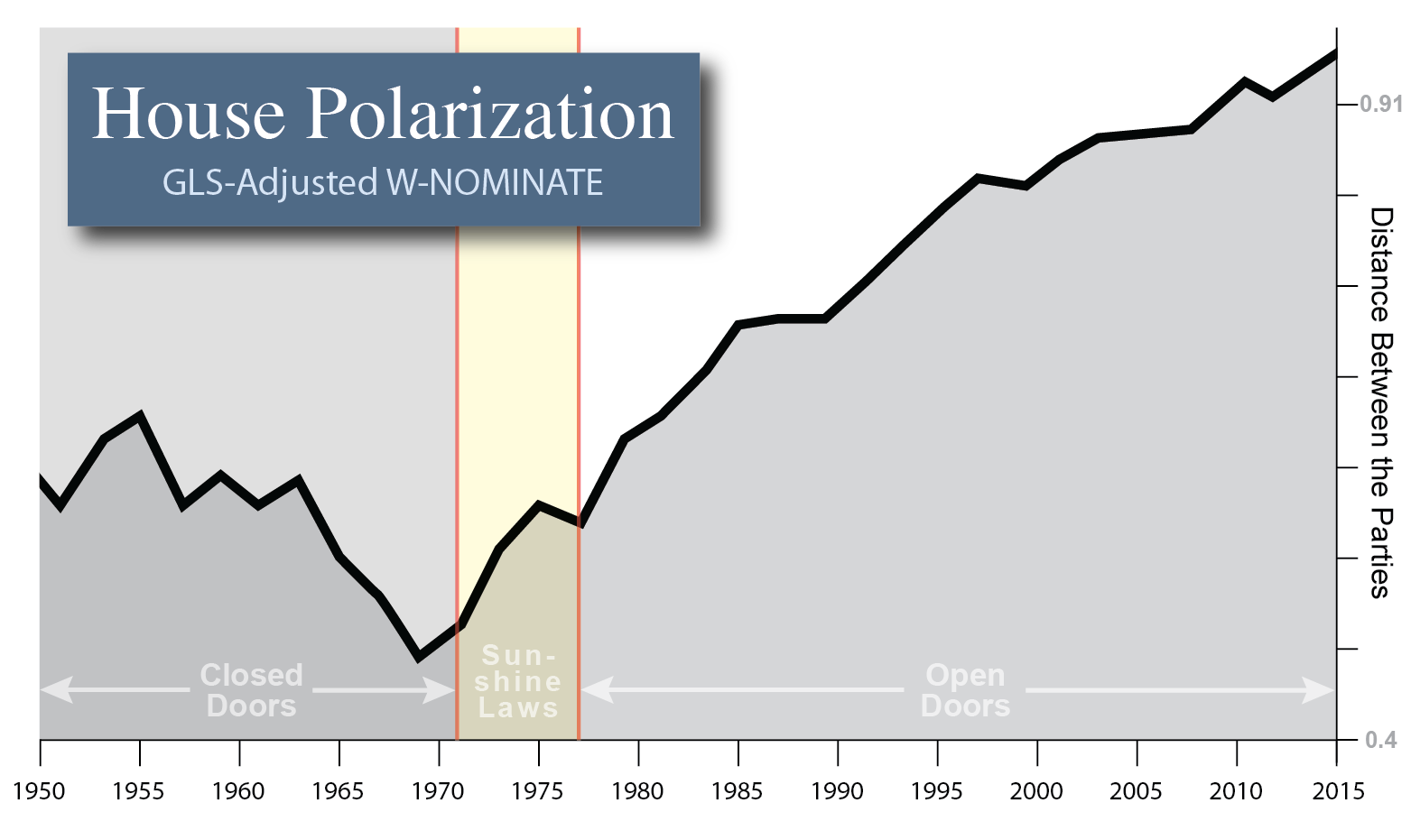
Rise in Polarization & 1970 Sunshine Reforms

Rise in Polarization & 1970 Sunshine Reforms
Citations
Party leaders fueled polarization by seeking roll call votes on the very issues that are likely to divide the parties.Neal Devins 2011
Party Polarization
The same [members of Congress] who act like maniacs during the open meetings are suddenly calm and rational during the closed ones.Rep. Jeff Jackson 2023
Media presence drives partisan anger
The rule of secrecy helped make the Constitutional Convention a civil and deliberative body, rather than a partisan one. It helped make compromise an attribute of statesmanship rather than a sign of weakness.Richard R. Beeman 2025
National Constitution Center
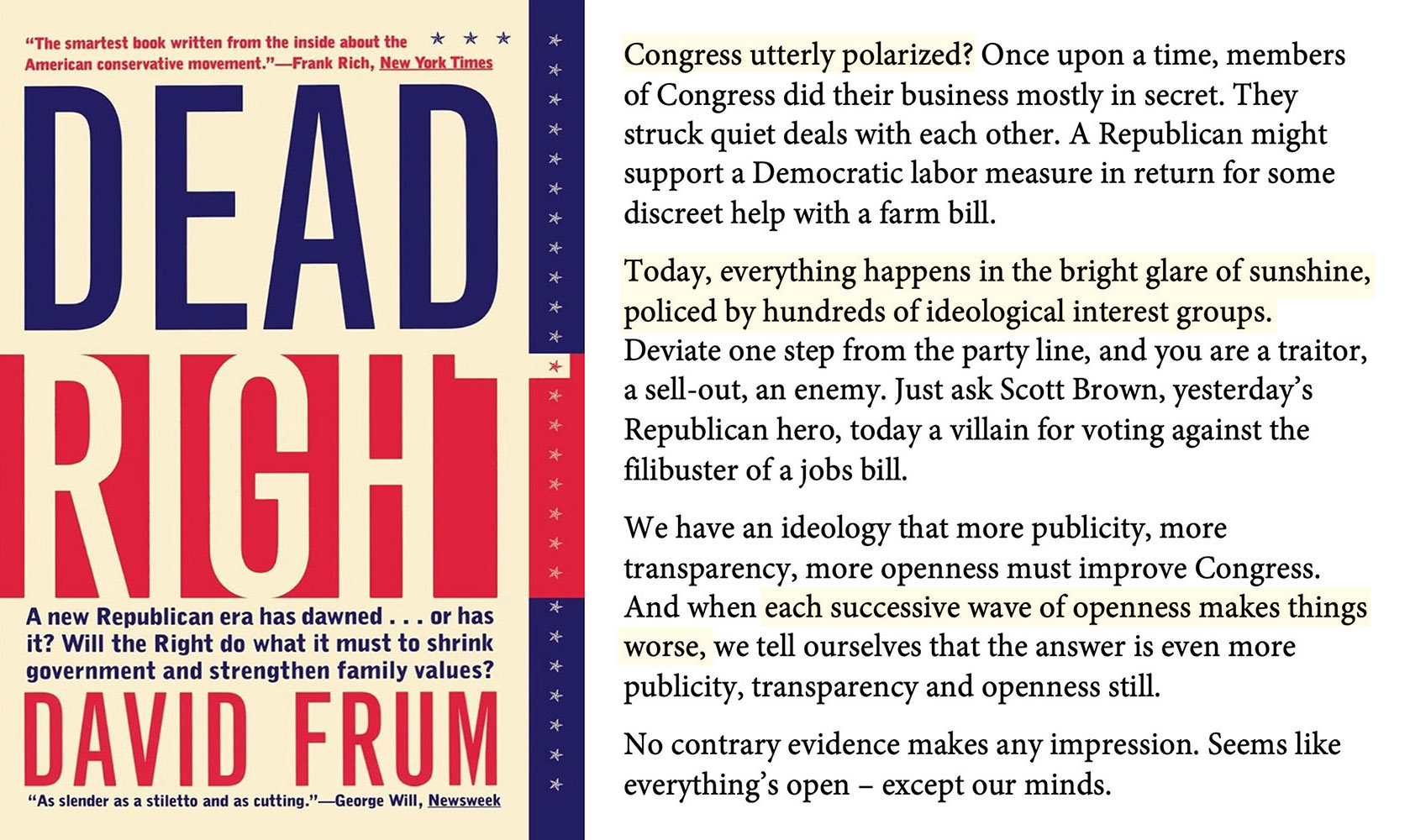
David Frum 2010 - Dead Right

David Frum 2010 - Dead Right
Some members have regretted ever permitting the TV cameras in, blaming television for heightening partisanship and confrontation.Donald Ritchie 2010
Congress: A Very Short Introduction
You know if people are watching you [Congress] that is going to include those people who are going to try and push you to be more tribal.Norm Ornstein 2020
Committee Hearing - Fostering Deliberative Process in Congress
The dominant feature of the present Congress is not legislation. It is responsiveness to popular demand for more open politics, more explicit confrontation on big issues.Joseph Kraft 1971
Reform Mood In Congress
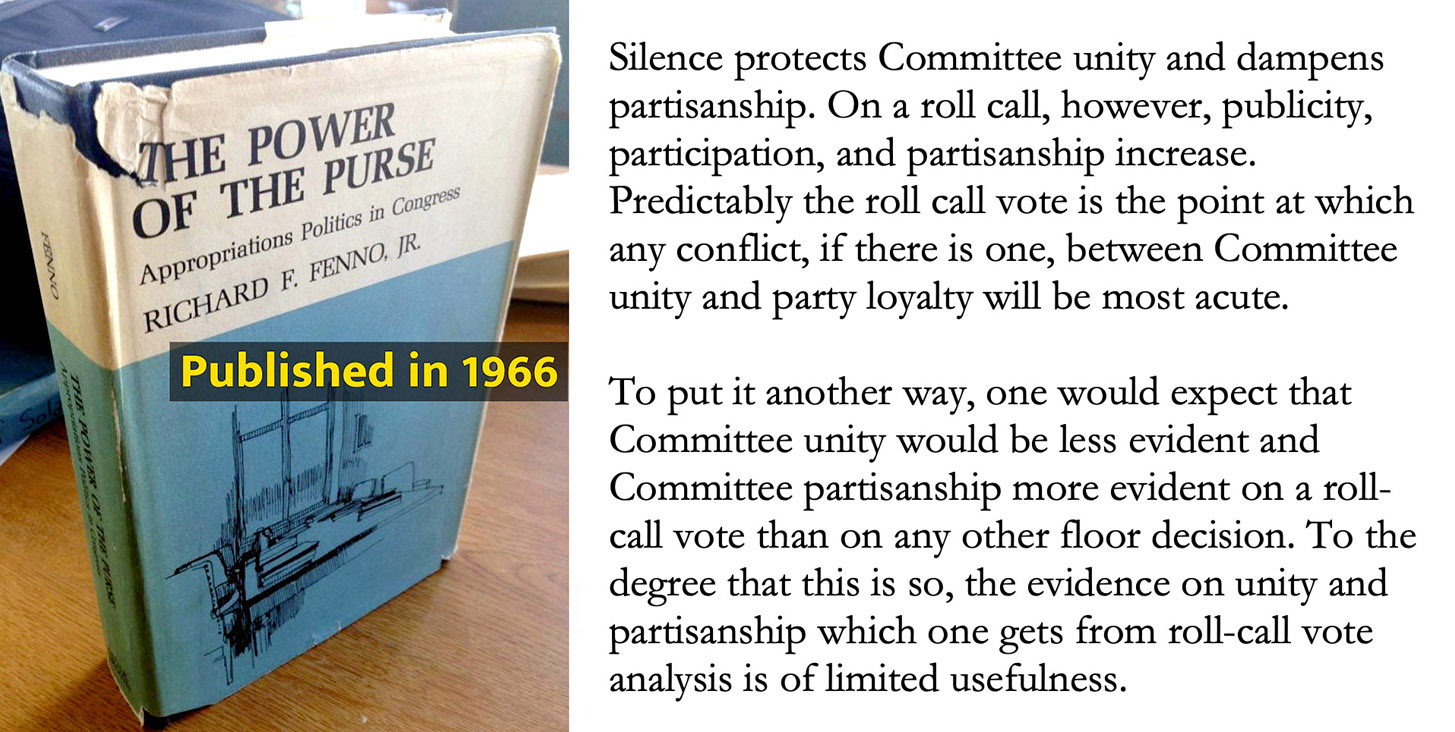
Richard Fenno 1966 - Power of the Purse
Text: Silence protects Committee unity and dampens partisanship. On a roll call, however, publicity, participation, and partisanship increase. Predictably the roll call vote is the point at which any conflict, if there is one, between Committee unity and party loyalty will be most acute. To put it another way, one would expect that Committee unity would be less evident and Committee partisanship more evident on a roll-call vote than on any other floor decision. To the degree that this is so, the evidence on unity and partisanship which one gets from roll-call vote analysis is of limited usefulness.

Richard Fenno 1966 - Power of the Purse
Without posturing for cameras, Republicans and Democrats cooperate on some of America’s most complicated and urgent problems.Senator Ben Sasse 2020
Make the Senate Great Again (WSJ)
Generally, the requesting party will exhibit greater cohesion (partisanship) on a roll-call vote than if the vote had not been by roll call.Clifford Carrubba, Matthew Gabel & Simon Hug 2008
Legislative Voting Behavior, Seen and Unseen: A Theory of Roll-Call Vote Selection
Behind closed doors compromise is possible; before spectators it is difficult.Robert Luce 1922
The Science of Legislation
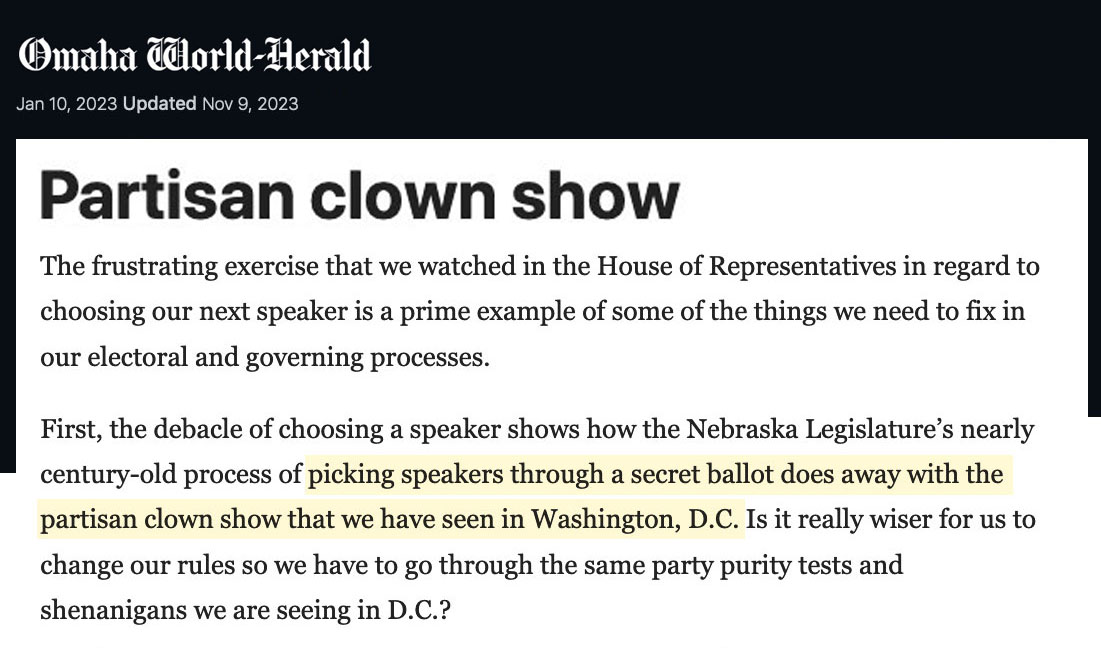
Peter Gadzinski - Partisan Clown Show
Partisan clown show: The frustrating exercise that we watched in the House of Representatives in regard to choosing our next speaker is a prime example of some of the things we need to fix in our electoral and governing processes. First, the debacle of choosing a speaker shows how the Nebraska Legislature’s nearly century-old process of picking speakers through a secret ballot does away with the partisan clown show that we have seen in Washington, D.C. Is it really wiser for us to change our rules so we have to go through the same party purity tests and shenanigans we are seeing in D.C.?

Peter Gadzinski - Partisan Clown Show
After the Behind the closed doors, bargains were easier to strike, of course, and members who had to be implacable foes in public could work together.William M. Lunch 1987
The Nationalization of American Politics
After the 1976 Government in the Sunshine Act required that congressional committee meetings be public, surveys of senators soon concluded that these open meeting requirements were the largest single cause of a decline in the ability to negotiate and to make politically difficult trade-offs.Richard Pildes 2014
Romanticizing Democracy
The reforms of the 1970s helped to facilitate stronger partisanship in Congress, as members used the more open process to score political points against their opponents.Casey Burgat 2015
Order in the House?
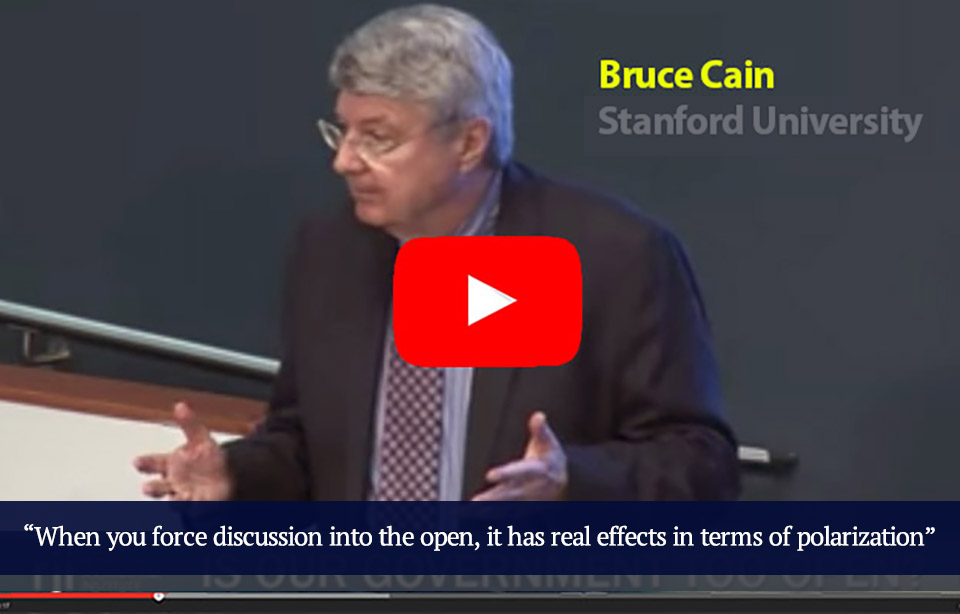
Bruce Cain 2016 – Debate “Is Government Too Open”

Bruce Cain 2016 – Debate “Is Government Too Open”
Open meetings have polarized the parties a little more...Clearly there is more partisanship and more hardenings.Rep. Wayne Hays 1975
CQ Quarterly - Open Committees
[Secrecy] protects Committee unity and dampens partisanship. On a roll call, however, publicity, participation, and partisanship increase.Richard Fenno 1966
Power of the Purse
Lawmakers desiring more closed committee work sessions do not lack variety in their criticism of the new openness: more partisan behavior, too much political speechifying, unusually blatant lobbying, temptation to refrain from discussing radical alternatives.CQ Quarterly 1976
Should congressional work sessions be open to public?
MSNBC Max Rose 2023 - Public Votes Drive Partisan Craziness
Text from October 11, 2023 on the Morning Joe Show with guest former Representative Max Rose - in a conversation about the secret ballot voting for the House speaker: "The thing with this vote behind closed doors, that's not gonna be the hurdle. Any time you get behind closed doors the extremists become somehow subdued. You know, they are not allowed their cameras, their phones, and not just because that leaks, but so they can't take a photo of their ballots. And so when they can't take a phot of their ballot, they don't have anything to show, whether its a text to Donald Trump, or to his people, or to his extremist base. But the danger will come when they have to go out in public and take that public vote."
MSNBC Max Rose 2023 - Public Votes Drive Partisan Craziness
Open negotiations incline negotiators to consider their own prestige and to maintain the arguments...with undue obstinacy and prevent them from giving way to the frequently superior arguments of the occasion.Louis XIV 1680
Efficient Secrecy (Kurizaki)
It may feel more partisan because it’s so much more transparent. There’s more TV, and the whole process is more open to the public.Bob Novak 2009
What I’ve learned
In the “age of impeachment,” there is a tendency for “We, the people” not to reason but to intimidate and threaten with political retribution. Is there a way to mitigate this party-induced bias? Yes, the secret ballot (in Congress).Douglas Kmiec 2020
Impeachment trial could use a secret ballot
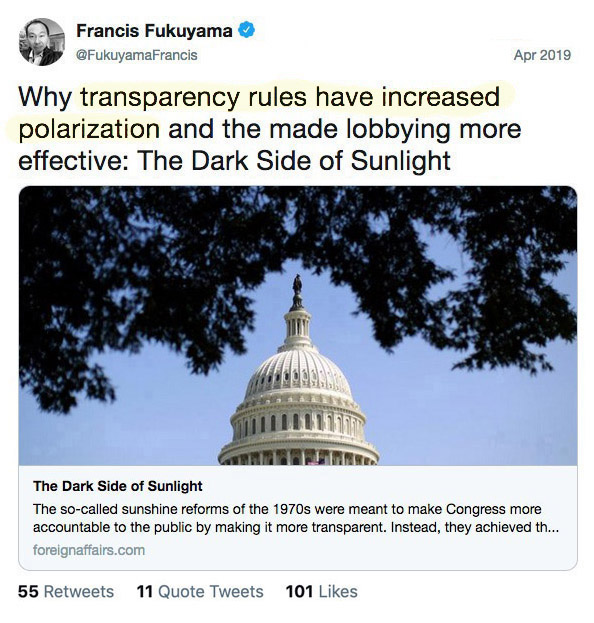
Francis Fukuyama 2019 – Via Twitter

Francis Fukuyama 2019 – Via Twitter
Partisanship by itself can be debilitating, but when it is mixed with gavel-to-gavel television coverage of the House, a whole new dimension is added.Minority Leader Bob Michel 1984
Politics in the Age of Television
Officials and legislators often draft new regulations or laws in semi-secret. Secrecy allows them to explore bargaining positions without committing themselves publicly, and so facilitates compromise.Deborah Stone 1997
Policy Paradox (Losing is Winning)
Rep. Jeff Jackson 2023 - Angry artisanship in open meetings, cordiality in closed
“I’m still brand new to Congress—I’ve only been there 100 days—and I don’t know if I’m not supposed to say this out loud, but it’s true and important. And if you don’t know this, you need to. It’s really clear from working there for just a few months that most of the really angry voices in Congress are totally faking it. These people who have built their brands around being perpetually outraged? It’s an act. I’ve been in committee meetings that are open to the press and committee meetings that are closed. The same people who act like maniacs during the open meetings are suddenly calm and rational during the closed ones. Why? Because there aren’t any cameras in the closed meetings, so their incentives are different.” -- link to original post
Rep. Jeff Jackson 2023 - Angry artisanship in open meetings, cordiality in closed
Negotiating win-win deals requires secrecy.Sarah Binder 2017
McConnell’s Secretive Lawmaking
In modern political systems, parties are usually able to enforce discipline on deputies, since voting in Parliament is almost invariably public.Jon Elster 2013
Securities Against Misrule
The House Committee on Public Works, for example, had about six staffers assigned to the 1972 Clean Water Act. One of them, Gordon Wood, remembers an intimate process that enabled compromise... He said closed-door meetings enabled lawmakers to take off "their blue shirts and red neckties."Emily Yehle 2014
Recalling the long, hard slog to a 'historic piece of legislation' (Climate)
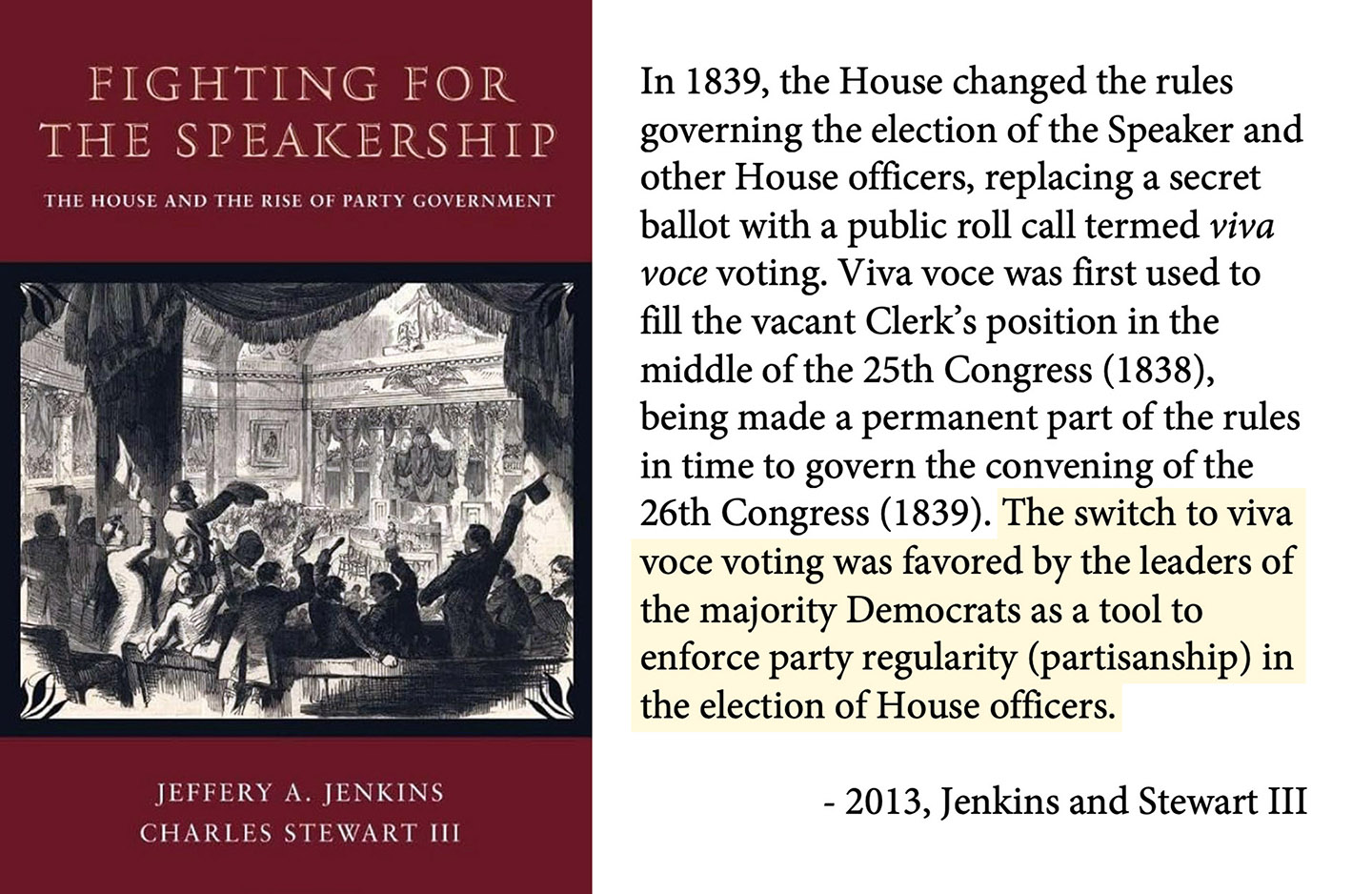
Jeffery A. Jenkins, Charles Stewart 2013 - Fighting for the Speakership
In 1839, the House changed the rules governing the election of the Speaker and other House officers, replacing a secret ballot with a public roll call termed viva voce voting. Viva voce was first used to fill the vacant Clerk’s position in the middle of the 25th Congress (1838), being made a permanent part of the rules in time to govern the convening of the 26th Congress (1839). The switch to viva voce voting was favored by the leaders of the majority Democrats as a tool to enforce party regularity (partisanship) in the election of House officers.

Jeffery A. Jenkins, Charles Stewart 2013 - Fighting for the Speakership
In our political system today there are two trends that make secrecy a necessary evil: showmanship and partisanship.Mark Strand and Timothy Lang 2011
The Super Secret Committee
The most important reason for an anonymous Senate vote is that it would remove the pressures of partisanship and bribery and permit the senator-jurors to vote as all jurors should vote: fairly and impartially.Steve Tidrick 1999
The Case for a Secret Ballot
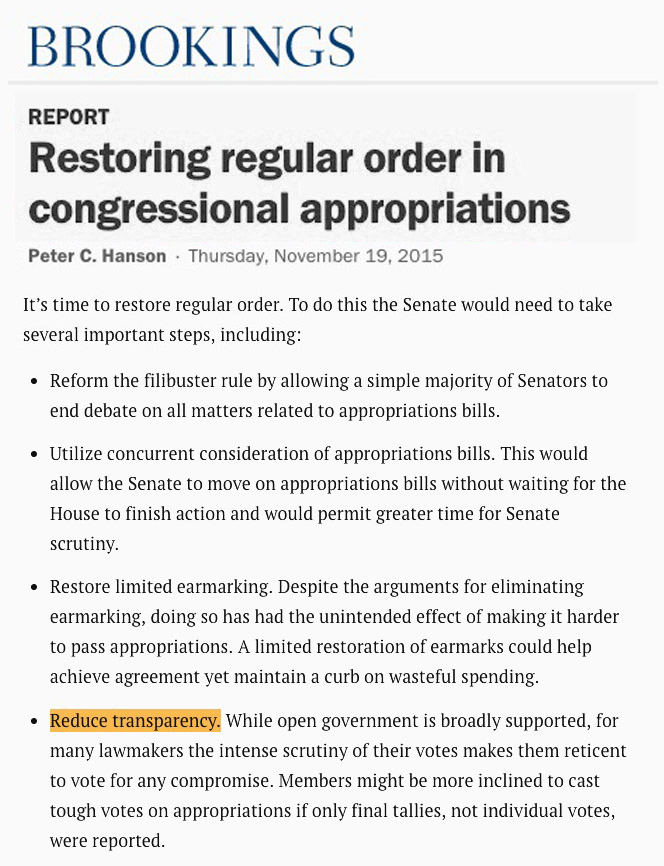
Peter C. Hanson - Restoring Regular Order (secret voting allows compromise)

Peter C. Hanson - Restoring Regular Order (secret voting allows compromise)
One way to increase legislators’ willingness to accept compromise is to insulate the process of negotiation from the public.Sarah E. Anderson, Daniel M. Butler, Laurel Harbridge-Yong 2020
Rejecting Compromise: Legislators’ Fear of Primary Voters
Lawmakers in transparent legislatures must worry more about how constituents view their behavior in policy negotiations, which constrains their ability to strike deals and develop winning coalitions.Jeffrey Harden, Justin Kirkland 2020
Does Transparency Inhibit Political Compromise?
Committee meetings are held behind closed doors, which means that neither the public nor the media can attend. This allows members to discuss sensitive political issues without outside listeners. The idea is that this should provide better opportunities for reaching agreements and compromise solutions between the parties.Sveriges Riksdag 2020
Official Swedish parliament website
Publicity would lessen the chance for concessions, the compromises, without which wise legislation cannot in practice be secured. Men are averse to changing their positions or yielding anything when many eyes are watching. It is in the conference room that agreements are reached, results accomplished.Robert Luce 1926
Congress: An Explanation
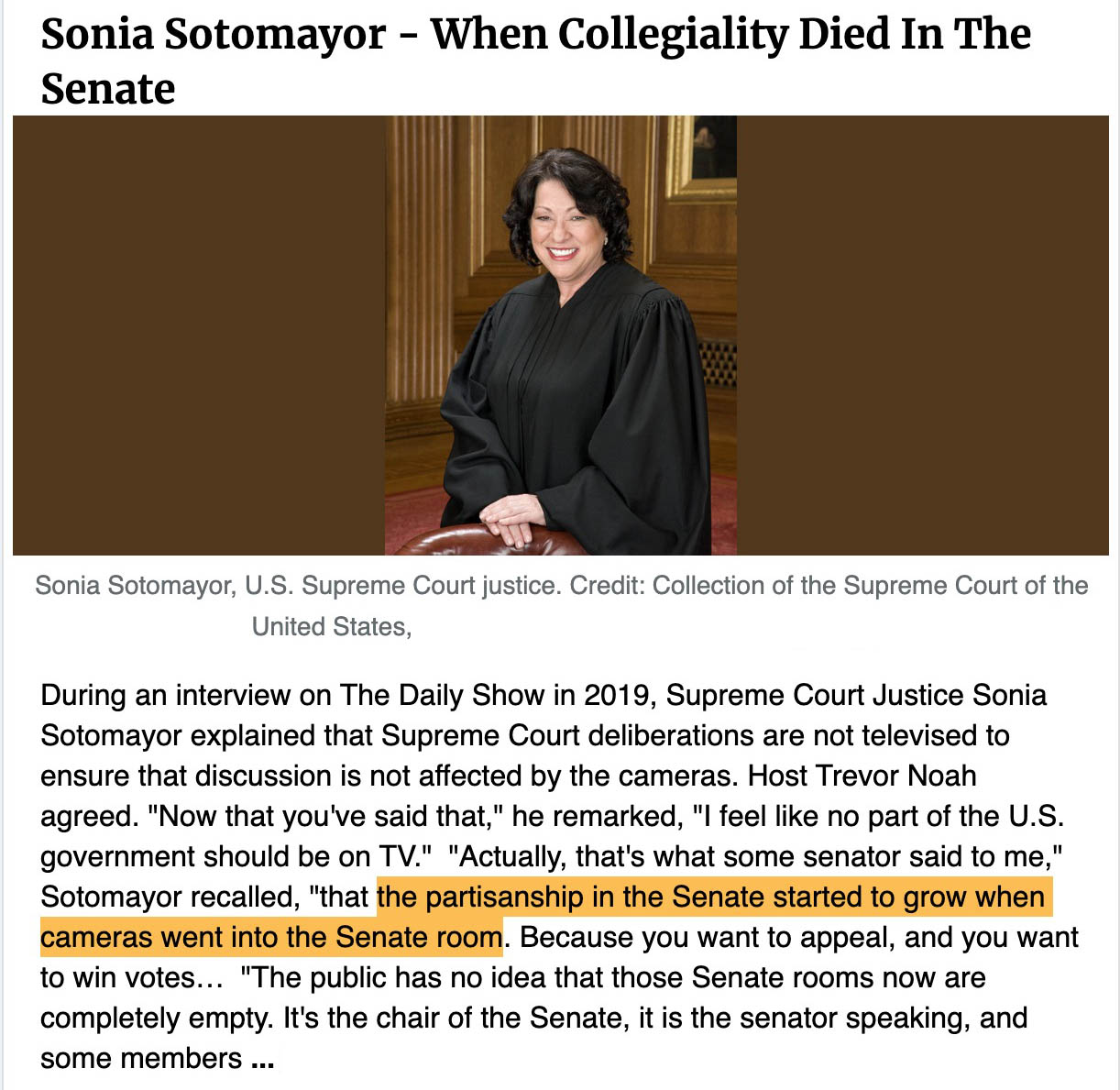
Sonia Sotomayor 2019 - When Collegiality Died in the Senate

Sonia Sotomayor 2019 - When Collegiality Died in the Senate
Staying private [working in secret in Congress] made it easier for both sides to compromise.George C. Edwards 2015
Staying Private - Solutions to Polarization (Persily)
Men are averse to changing their positions or yielding anything when many eyes are watching.Robert Luce 1926
Congress: An Explanation
Congress’ “public exhibitions” would be fine if the Members were performing for John Smith and Jane Doe. But they are on display for John Democrat and Jane Republican. The country’s partisanship turns the tendency towards showmanship into a vice...Members are beholden to voters who are partisans. Mark Strand and Timothy Lang 2011
The Super Secret Committee
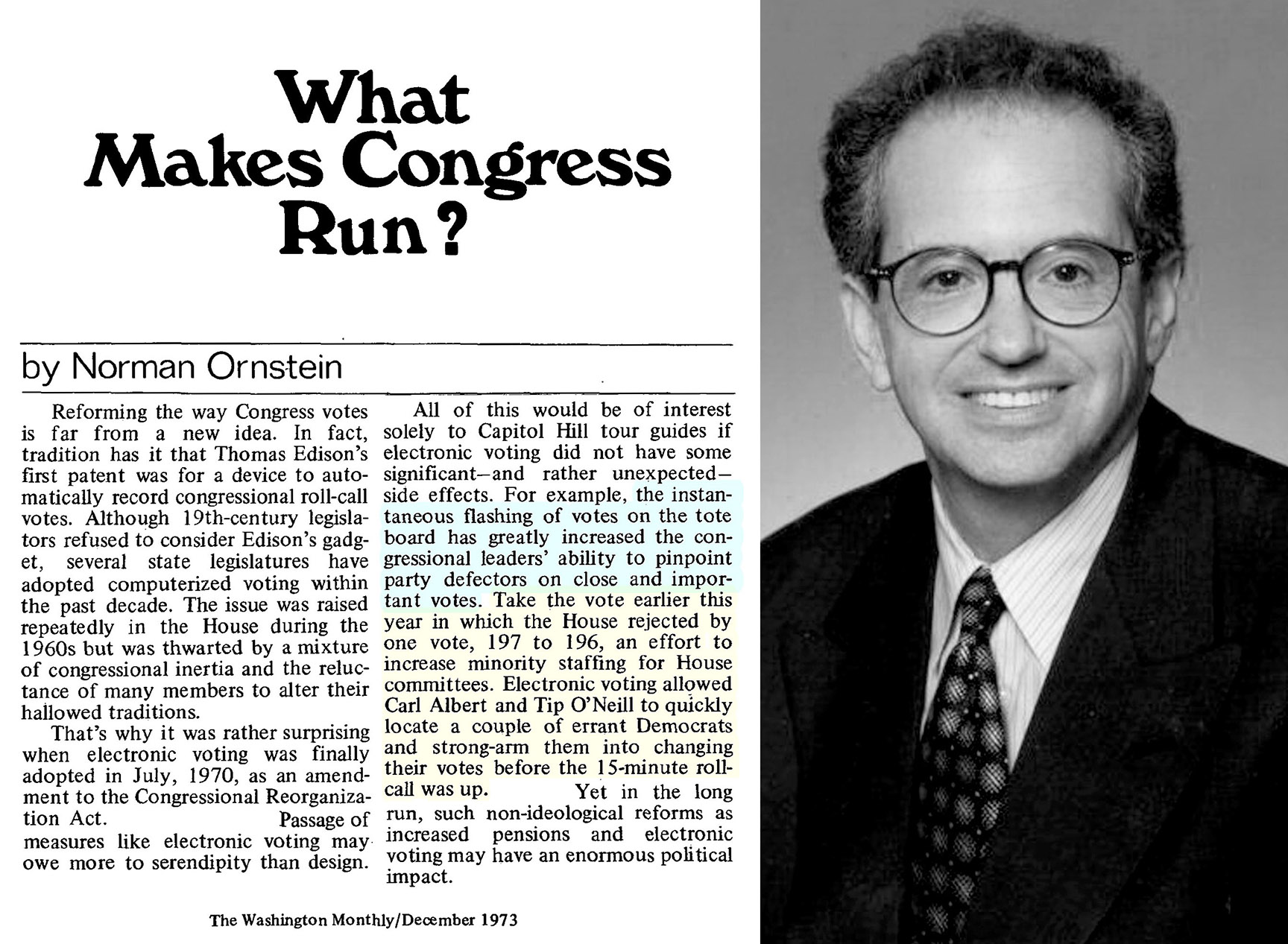
Norman Ornstein 1973 – What Makes Congress Run?
TEXT: Reforming the way Congress votes is far from a new idea. In fact, tradition has it that Thomas Edison’s first patent was for a device to automatically record congressional roll-call votes. Although 19th-century legislators refused to consider Edison’s gadget, several state legislatures have adopted computerized voting within the past decade. The issue was raised repeatedly in the House during the 1960s but was thwarted by a mixture of congressional inertia and the reluctance of many members to alter their hallowed traditions. That’s why it was rather surprising when electronic voting was finally adopted in July, 1970, as an amendment to the Congressional Reorganization Act. Passage of measures like electronic voting may· owe more to serendipity than design. All of this would be of interest solely to Capitol Hill tour guides if electronic voting did not have some significant – and rather unexpected side effects. For example, the instantaneous flashing of votes on the tote board has greatly increased the congressional leaders’ ability to pinpoint party defectors on close and important votes. Take the vote earlier this year in which the House rejected by one vote, 197 to 196, an effort to increase minority staffing for House committees. Electronic voting allowed Carl Albert and Tip O’Neill to quickly locate a couple of errant Democrats and strong-arm them into changing their votes before the 15-minute rollcall was up. Yet in the long run, such non-ideological reforms as … electronic voting may have an enormous political impact.

Norman Ornstein 1973 – What Makes Congress Run?
Anonymous Congress could unlock a whole realm of hidden bipartisanship. It could turn government into a consensus legislative machine that is once again respected by the American public.Ben Krauss 2024
The Take Bakery: Anonymous Congress
While transparency is a net positive, however, no one can argue Congress is more effective today, let alone more civil or deliberative, than when cameras arrived in the House of Representatives 42 years ago, followed seven years later by the Senate. That change began the bizarre tradition of members delivering fiery speeches to an empty chamber, transformed governing into reality television and made grandstanding lawmakers into minor celebrities.James Hohmann 2021
Why Supreme Court Hearings Shouldn’t be Televised
Members constantly calculate their [public] actions to appeal to the wings, not the center... If the Super Committee had tried to craft the bill publicly, it probably would have fallen prey to the tendencies towards showy partisanship that high-profile politicking does.Mark Strand and Timothy Lang 2011
The Super Secret Committee
Nobody was in the room, nobody knows what was said, but they got the thing done. That’s politics. And we look back on both of those leaders, one democrat and one republican with a lot of nostalgia.Michael Ignatieff 2014
Is Transparency Bad for Politics? (Interview by Matt Cadwallader)
Television coverage of floor debates and committee hearings has contributed to the coarsening of debate and the polarization between the parties.Rep. Don Young 2014
Not everyone is a fan of C-SPAN cameras
Because the vote was secret, senators did not have to publicly reveal how they voted and thus could easily vote against party lines.Noah Van Horne 2021
Italian Senate

John Boehner 2012 - Leaders Enforce Partisanship by Watching Votes and Punishing Members
Text: Speaker John Boehner (R-Ohio) warned his conference on Wednesday that leaders are “watching” how the rank-and-file vote to determine committee assignments, according to sources in the closed-door meeting. Boehner addressed the firestorm over the removal of four lawmakers from plum committee assignments at the weekly GOP conference meeting. According to Rep. Tim Huelskamp (R-Kan.), one of the lawmakers denied a spot on his current committee in the next Congress, Boehner did note “that we [leadership] have punished four members, he claimed that it had nothing to do with their conservative ideology, but had to do with their voting patterns.” Also removed from committee spots were Reps. Justin Amash (R-Mich.), Walter Jones (R-N.C.) and David Schweikert (Ariz.). Huelskamp added that Boehner warned GOP lawmakers that “there may be more folks that will be targeted … ‘we’re watching all your votes.”

John Boehner 2012 - Leaders Enforce Partisanship by Watching Votes and Punishing Members
It may be no accident, for example, that the two House committees that have tried open bill-drafting sessions have experienced disastrous results, notably that political posturing by the members produces endless and essentially meaningless bickering over a bill.Norman C. Miller 1971
Here’s A Reform We Do Not Need
In an effort to insulate members from extreme partisanship, congressional rules require the House Speaker and Senate majority leader to call special joint sessions that allow members of Congress to vote completely anonymously in an attempt to mitigate the vetocracy and mainline some bipartisan consensus legislation.Ben Krauss 2024
The Take Bakery: Anonymous Congress
Compromise often requires some degree of anonymity, and certainly the closed markup in SASC is testimony to that reality.Colleen Shogan 2011
Defense Authorization: The Senate's Last Best Hope
Jonath Haidt Ted Talk 2012
“[Members] are forced to play a game that threatens hyperpartisanship” Full talk
Jonath Haidt Ted Talk 2012
“[Members] are forced to play a game that threatens hyperpartisanship” Full talk
Transparency often imposes direct costs on successful deal making, public attention increases the incentive of lawmakers to adhere to party messages, a step rarely conducive to setting aside differences and negotiating a deal. We consider, for example, what senators said as they emerged from the Senate’s bipartisan retreat behind the closed doors of the old Senate Chamber in the summer of 2013, when Democrats were considering “going nuclear” to change the Senate’s filibuster rule. “There was no rancor at all,” Senator John Boozman (R-Ark.) noted about the closed-door session with 98 senators in attendance. “I think if the American people were watching, the whole tone would have been different. It’s different when the TV cameras are on. That might be part of the problem” (quoted in O’Keefe and Johnson 2013). Along these lines, Bessette (1994, 221) contended, “The duty to deliberate well may often be inconsistent with attempts to conduct policy deliberations on the plane of public opinion.” Public settings encourage members to posture before external audiences rather than engage directly with their congressional interlocutors.Sarah Binder & Frances Lee 2013
Political Negotiation
Open committee meetings enable the party leaderships to monitor the performance of committee members and enforce strict party discipline.Kaare Strom 1998
Parliamentary Committees in European Democracies
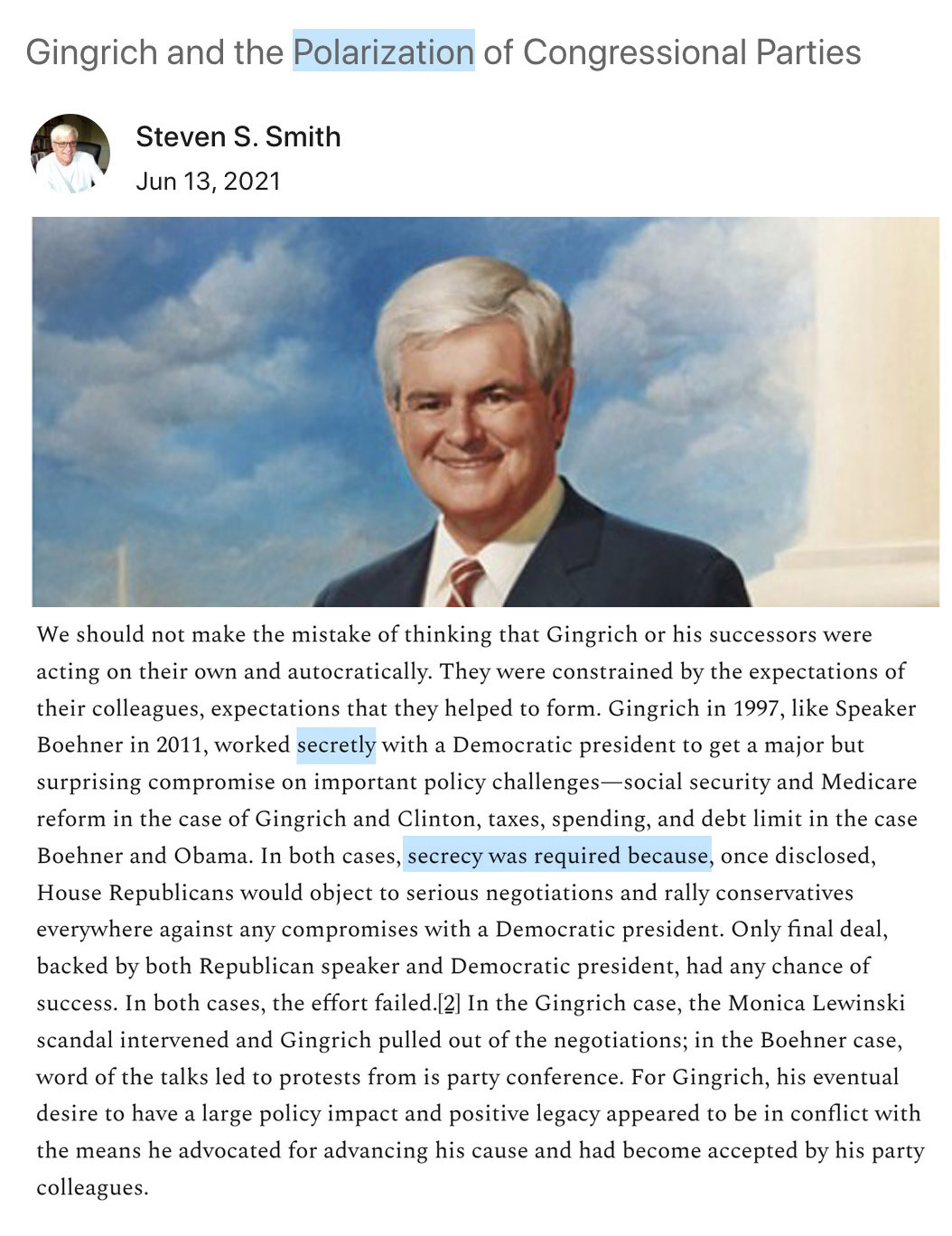
Steven Smith 2021 - Gingrich and the Polarization of Congressional Parties

Steven Smith 2021 - Gingrich and the Polarization of Congressional Parties
The opening of mark-ups changes the dynamics of decision making. With press and lobbyists watching, compromise may be more difficult, and grandstanding may be encouraged.Barbara Sinclair 1989
Transformation of the US Senate
Open deliberation has the potential to lead to mass polarization.Justin Blount, Zachary Elkins, Tom Ginsburg 2012
Comparative Constituional Design
Government transparency should never mean that there can be no private conversations. Politics is the art of compromise, and sometimes compromise has to be reached behind closed doors. With all the vast constituencies interested in this, if both sides have to constantly play to their bases in every phrase uttered, they can't get to a compromise.Melanie Sloan 2012 (CREW - Citizens for Responsibility and Ethics in Washington)
Open-Government Watchdogs OK With Closed-Door Fiscal Cliff Talks
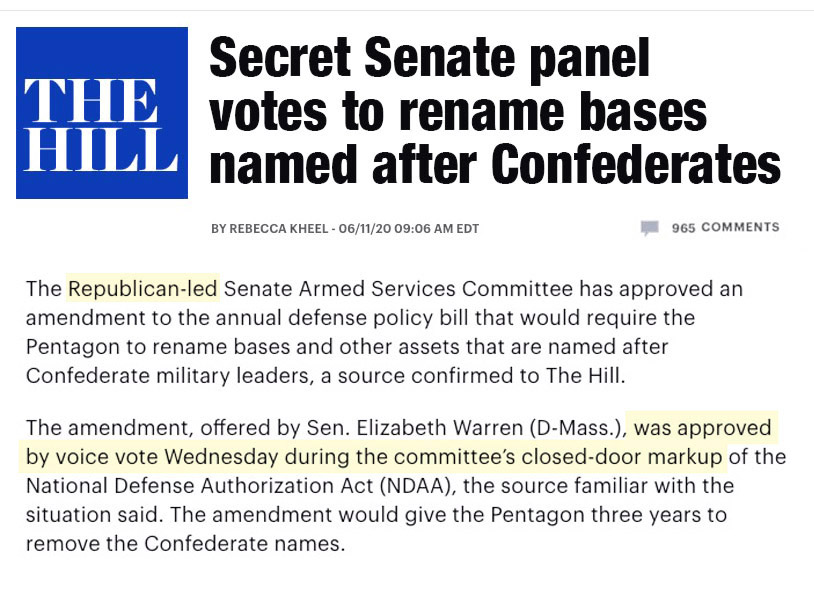
Rebecca Kheel 2020 – Republican Secret Senate Panel Endorses Elizabeth Warren Proposal to Rename Confederate Bases

Rebecca Kheel 2020 – Republican Secret Senate Panel Endorses Elizabeth Warren Proposal to Rename Confederate Bases
The opening up of the process fosters messaging politics and contributes to the harsh partisanship characteristic of the contemporary Congress.Frances Lee 2019
Select Committee on the Modernization of Congress
“We brought a budget in on time but the last six days was done without the benefit of sunshine.” The atmosphere is so polarized, says governor, there could be no compromise on transportation, taxes with public scrutiny. “It was becoming harder to compromise.”Frederick Melo 2019
Reporter Melo quoting Governor Tim Walz
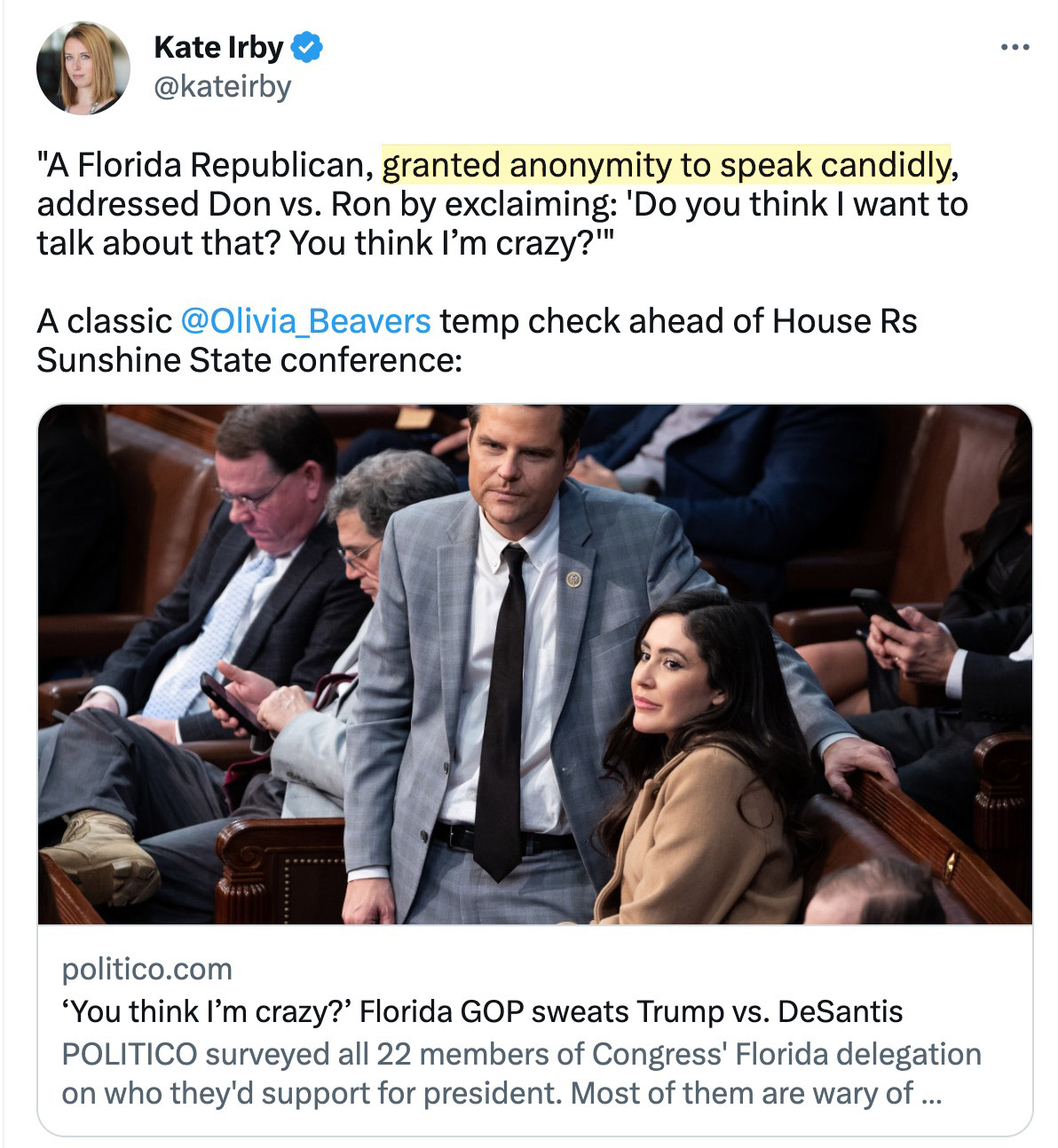
Kate Irby 2023 - Honesty in Secret
To get legislators to speek candidly on partisan issues (or in this case their choice between DeSantis or Trump), reporters consent to secrecy. As the linked article states “POLITICO surveyed all 22 members of Congress’ Florida Republican delegation on who they’d support for president. Most of them are wary of answering [publicly].” Any answer could cost them their career.

Kate Irby 2023 - Honesty in Secret
I have compared public versus private decision making by a body of representatives, concluding that public decision making may do less than private decision making to reduce polarization of opinions in society.David Stasavage 2006
Polarization and Publicity
He mentioned the secrecy of sessions as a factor in Committee unity - the press is kept out, etc.Rep. Charles S. Joelson 1964
Fenno - Oral Histories and Interviews (partisanship)
Increased transparency and scrutiny of proposed legislation resulted in slower and more contentious deliberations over spending.Angela M. Evans 2014
The Reclamation of the U.S. Congress
The camera is the enemy of real discussion and debate.Joe Ferullo 2022
Eliminate television coverage from Supreme Court
I believe the modern partisan Congress first emerged in the 1970s, with such developments as recorded amendment voting.Matthew Green 2018
Email to Authors
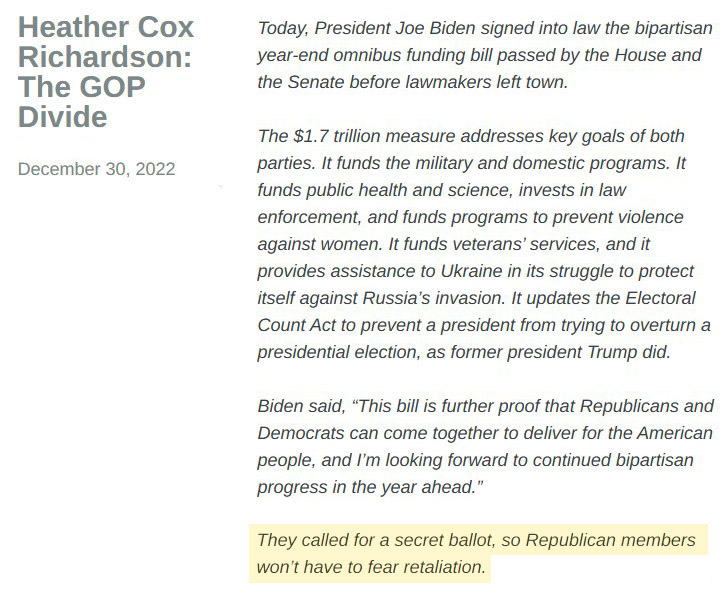
Heather Cox Richardson 2022 – The GOP Divide

Heather Cox Richardson 2022 – The GOP Divide
I continue to believe that too much transparency impedes compromise. I was part of Jenny Mansbridge’s ‘Negotiation in Congress’ APSA taskforce and we stressed that point. This piece [Dark Side of Sunlight] from Foreign Affairs is also on point. Nolan McCarty 2019
Author of ‘Polarization - What everyone needs to know’ via email
Forcing roll calls solely to embarrass the Democratic leadership would have made partisanship more salient.Eric Schickler and Kathryn Pearson 2005
Agenda Control, Majority Party Power, and the House Committee on Rules, 1937-52
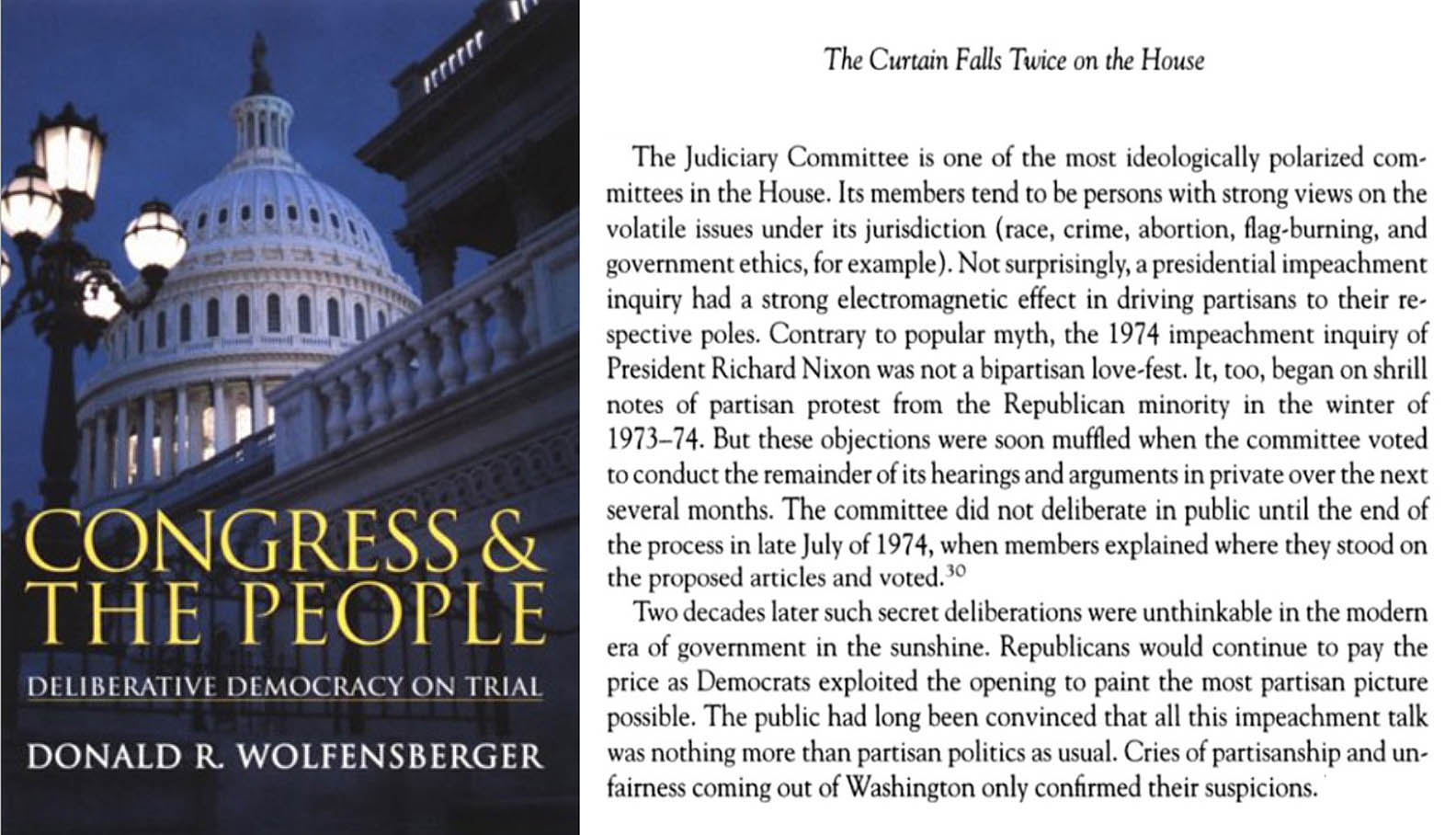
Donald Wolfensburger 2000 – Secret Impeachment Hearings Soften Partisanship Messaging
Text: The Judiciary Committee is one of the most ideologically polarized committees in the House. Its members tend to be persons with strong views on the volatile issues under its jurisdiction (race, crime, abortion, flag-burning, and government ethics, for example). Not surprisingly, a presidential impeachment inquiry had a strong electromagnetic effect in driving partisans to their respective poles. Contrary to popular myth, the 1974 impeachment inquiry of President Richard Nixon was not a bipartisan love-fest. It, too, began on shrill notes of partisan protest from the Republican minority in the winter of 1973-74. But these objections were soon muffled when the committee voted to conduct the remainder of its hearings and arguments in private over the next several months. The committee did not deliberate in public until the end of the process in late July of 1974, when members explained where they stood on the proposed articles and voted. Two decades later such secret deliberations were unthinkable in the modern era of government in the sunshine. Republicans would continue to pay the price as Democrats exploited the opening to paint the most partisan picture possible. The public had long been convinced that all this impeachment talk was nothing more than partisan politics as usual. Cries of partisanship and unfairness coming out of Washington only confirmed their suspicions.

Donald Wolfensburger 2000 – Secret Impeachment Hearings Soften Partisanship Messaging
Transparency also subjects public deliberation to reputational constraints. One risk is that officials will stick to initial positions, once announced, for fear of appearing to vacillate or capitulate, and this effect will make deliberation more polarized and more partisan.Adrian Vermeule (Harvard Law) 2007
Mechanisms of Democracy
Split votes are caused by inflexibility rooted in public exposure or, as another member suggested, by the barriers raised by the [sunshine] act to negotiating unanimity.David M. Welborn, William Lyons & Larry Thomas 1984
Effects of the Federal Government in the Sunshine Act
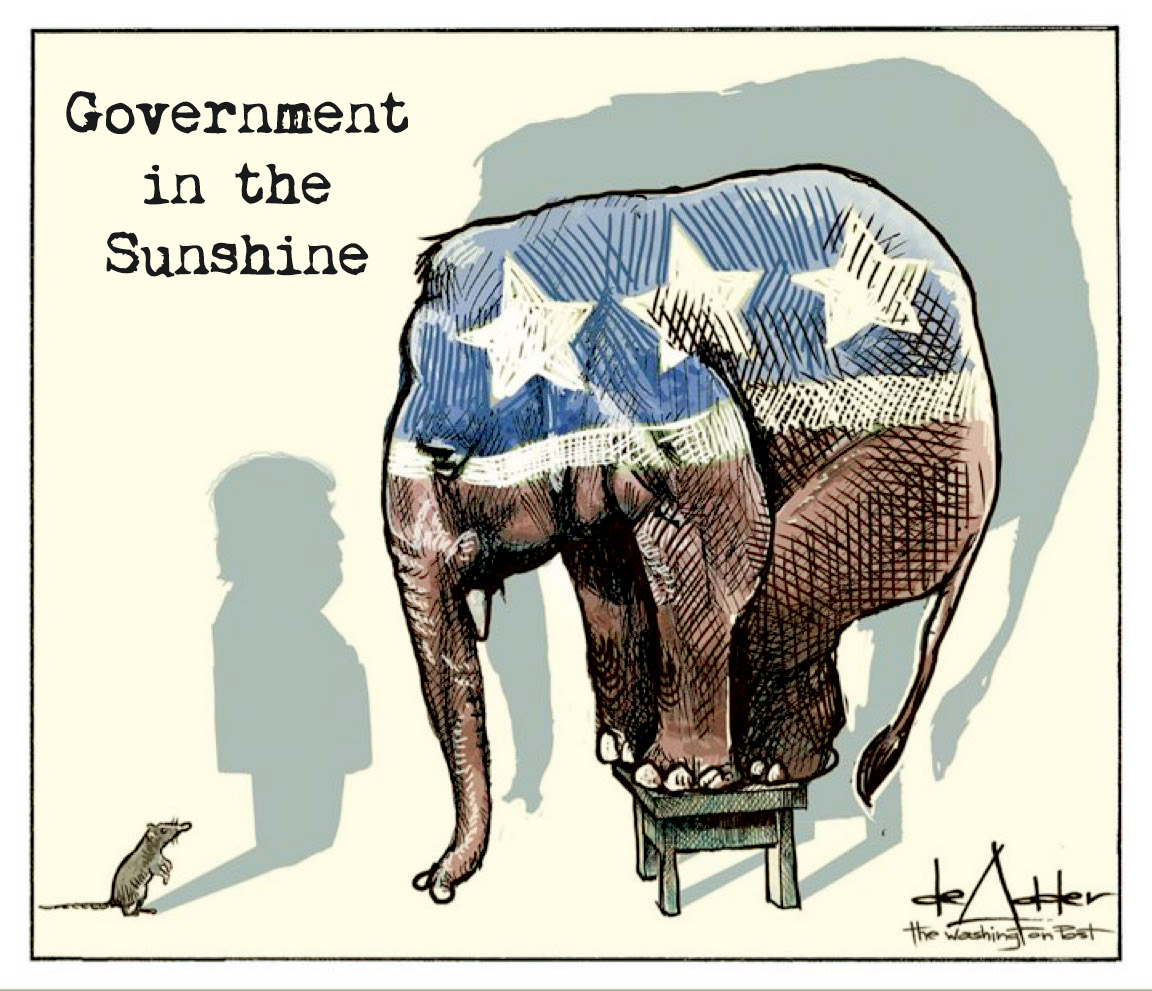
De Adder 2023 - Fear of Trump
Note: Sunshine terrifies members of Trumps own party, allowing him to congrol members of the House. Twitter user appers to have altered original comic

De Adder 2023 - Fear of Trump
Members are able to agree to controversial provisions that they would be more reluctant to agree to if lobbyists were sitting out there watching.Representative Don J. Pease
Ways and Means Committee: Behind Closed Doors (Dale Tate)
Humans have known for hundreds of years that transparency in public policymaking can cause problems by encouraging hyperpartisanship.Edward Hearn 2020
How Much Transparency Is Too Much?
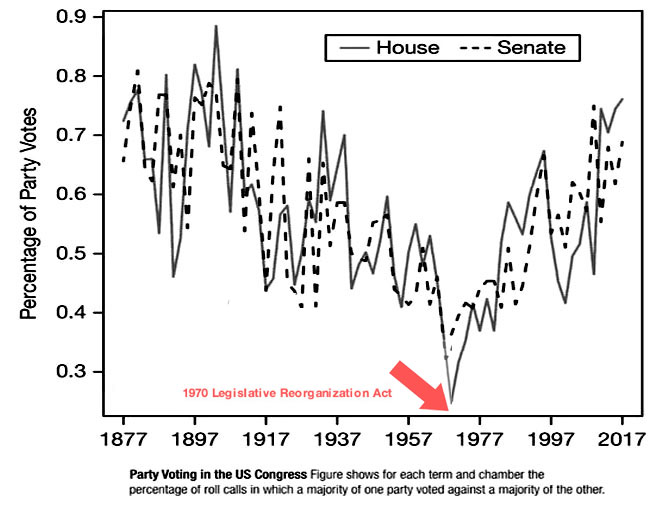
Nolan McCarty 2019 - Polarization

Nolan McCarty 2019 - Polarization
[The secret ballot] is part of the explanation for the turn-of-the century (1900) demise of partisanship.Susan Stokes & Thad Dunning 2010
What Killed Vote Buying?Note: Just like with legislators today, parties and powerful groups would monitor the votes of citizens, punishing those who stepped from the party line. So the dynamic is the same, just a differing pressure point. Today parties pressure legislators because only their votes are public.
Zeke Miller of Time’s “Bipartisan Call To Bring Back The Smoke-Filled Room” in August—implied that even fierce rivals are bound emerge from the clouds in cahoots.Chris Faraone 2013
Who Killed the Smoke-Filled Room Anyway? A Brief History
My feeling is that televising the Senate will make it harder for senators to reach compromises. Senators will find that the position they took in their opening statements have been engraved in film. Any compromising can easily be portrayed as a loss and the senator who does it as a loser. If this scenario comes to pass, the Senate may well grind to a halt. Senators are not by nature shrinking violets, and additional incentives to confrontation can only mean more argument and probably worse legislation.Senator William Proxmire 1984
Congressional Record 1984
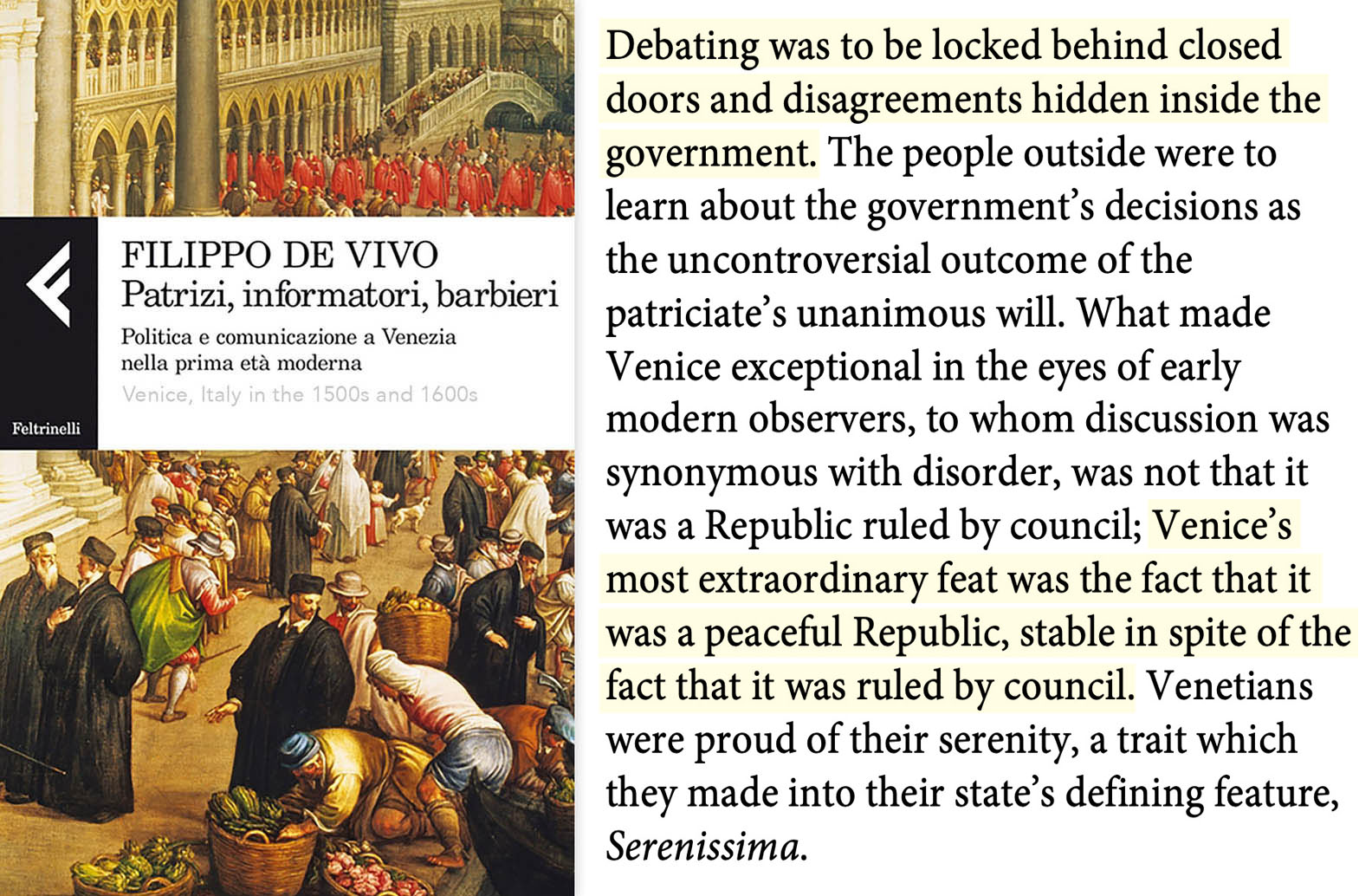
De Vivo 2007 - Information and Communication in Venice
Debating was to be locked behind closed doors and disagreements hidden inside the government. The people outside were to learn about the government’s decisions as the uncontroversial outcome of the patriciate’s unanimous will. What made Venice exceptional in the eyes of early modern observers, to whom discussion was synonymous with disorder, was not that it was a Republic ruled by council; Venice’s most extraordinary feat was the fact that it was a peaceful Republic, stable in spite of the fact that it was ruled by council. Venetians were proud of their serenity, a trait which they made into their state’s defining feature, Serenissima.(Patrizi, informatori, barbieri)

De Vivo 2007 - Information and Communication in Venice
Since at least the early nineteenth century, members expected voting records to be available and salient to constituents, and relevant to their own electoral success. Party leaders, too, have a keen interest in monitoring votes but, except under unusual procedural circumstances (e.g., secret voting in House officer elections), leaders face minimal obstacles to monitoring votes, so asymmetries in monitoring costs generally favor party leaders over other competitors for legislators’ loyalties.John M. Carey 2009
Legislative Voting and Accountability
You can get a sense of this now by talking to members of the few committees that still don’t televise everything — particularly the intelligence committees. Members of the Senate intelligence committee, for instance, seem genuinely to love their work on that committee, and to have good things to say about their colleagues of both parties.Yuval Levin 2019
Behind Closed Doors
An MP who is a member of the majority cannot vote against his own government. Parliamentary debates, then, are a mere ritual. The holding of several mandates, a phenomenon which is becoming increasingly widespread, further worsens the situation, since it prevents elite turnover, concentrates the political class, leads to an overlap between the national and local level — to the point of confusing the two — and finally favours the oligarchical control of parties over men and electoral strongholds.Alain de Benoist 1985
The Problem of Democracy
[The parties] will not engage in problem-solving behavior unless the activity is relatively safe. Both Party and Opponent need to be assured that if they freely and openly acknowledge their problems, if they willingly explore any solution proposed, and if they candidly discuss their own preferences, this information will not somehow be used against them. […] The use of transcripts or a stenographer may inhibit exploratory and tentative discussions. Large galleries and disclosure to outside persons have the same effect.Richard Walton & Robert McKersie 1965
A Behavioural Theory of Labor Negotiations
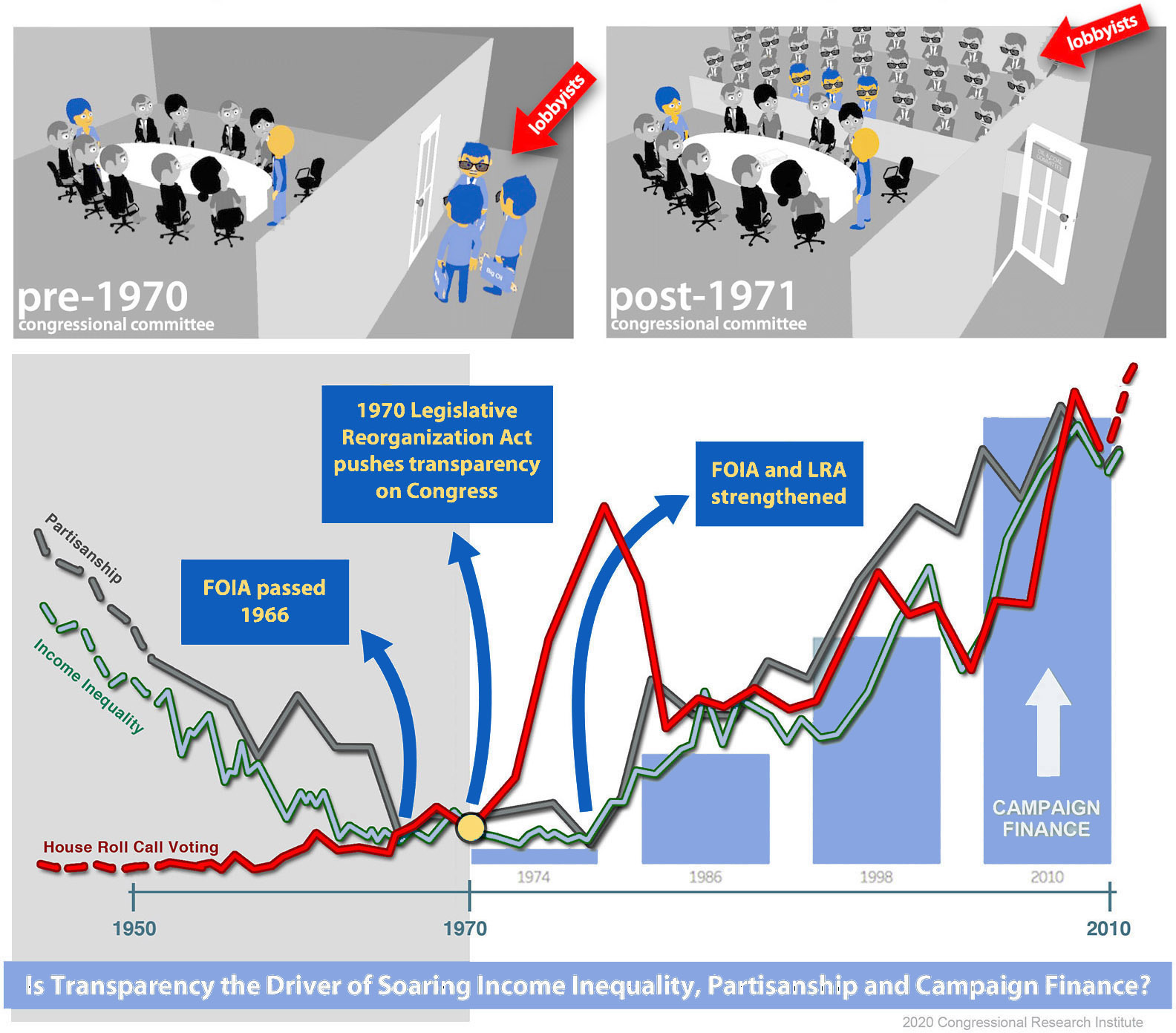
CRI 2020 - Is Government Transparency the Driver of Soaring Income Inequality, Partisanship and Campaign Finance?

CRI 2020 - Is Government Transparency the Driver of Soaring Income Inequality, Partisanship and Campaign Finance?
If actors do not feel safe about speaking their minds, brainstorming, and throwing different options on the table, creativity in the problem-solving process is dampened…and being exposed to involuntary publicity makes this delicate task more difficult. Daniel Naurin 2007
Backstage Behavior? Lobbyists in Public and Private Settings in Sweden and the European Union
[Television cameras turn] Supreme Court hearings into little more than live rehearsals for primary and general election campaign talking points. And some senators may feel they have little choice...If a senator doesn’t deliver the vengeance they expect here, retribution [from angry voters who seek revenge] may well come in the voting booth.Joe Ferullo 2022
Eliminate television coverage from Supreme Court
I cannot always vote with President Truman if I’m going to stay a Senator. I am a Texan and I’ve got a Southern constituency and so I’m going to be more conservative than you would like me to be or than President Truman would like me to be. President Truman’s about as popular as measles in Texas, and you’ll waste your time trying to talk to me when I know it would cut my own throat to help him.Lyndon B. Johnson 1948
Wheeling and Dealing (From Baker “Wheeling and Dealing” 1978
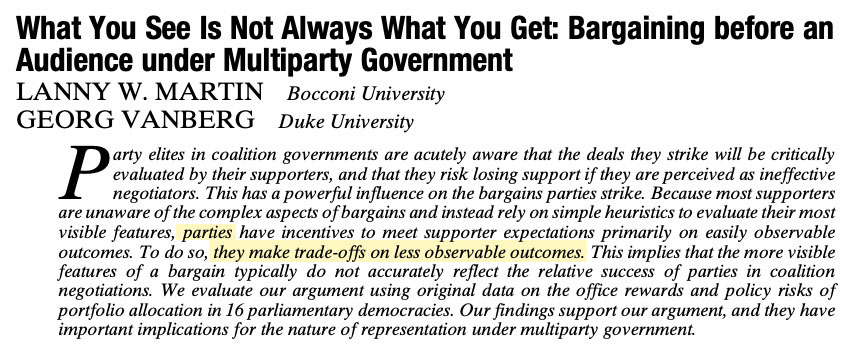
Lanny Martin & Georg Vanberg 2020 – What You See Is Not Always What You Get: Bargaining before an Audience

Lanny Martin & Georg Vanberg 2020 – What You See Is Not Always What You Get: Bargaining before an Audience
The Secrecy injoined & observed by the [Constitutional] Convention, was not only beneficial in that it occasioned the Ebulitions of fire, fancy & Party amongst the Members to evaporate in the room of their Session, and their work to be submitted to the Public in it’s perfect State, but it also prevented these pre-determined Gentlemen, from making mangled details of the work, and by misrepresentations to form a prejudice against it amongst the Citizens.Edmund Pendleton 1787
Letter to James Madison
My constituents have been fud up in the last 24 hours with the statement that I would not vote for any bill, or even the Ten Commandments, if proposed by a Democrat.Represenative Gifford 1939
Congressional Record
The one thing... that is truly ugly is the climate of hate and intimidation, created by a noisy few, which makes the decent majority reluctant to air in public their views on anything controversial... Where all pretend to be thinking alike, it's likely that no one is thinking at all.Edward Abbey 2007
Postcards from Ed
Sen. Ben Sasse (R-NE) blasted senators on the Judiciary Committee on Thursday for what he said was “grandstanding for the cameras” at a hearing to review former special counsel Robert Mueller’s Russia investigation.
“It’s bullshit the way people grandstand for cameras in here,” Sasse told the committee. “The reality is if we didn’t have cameras in this room, the discussion would be different. The Senate doesn’t work. It doesn’t diffuse the partisan tensions that are leading the country toward dissolution.”
“Ninety percent of our committees are about people trolling for soundbites,” the senator added. “That’s what actually happens. Some of us have other work to do. People can troll for soundbites whenever they want.”David Edwards 2020
Profanity-laced rant on ‘grandstanding’
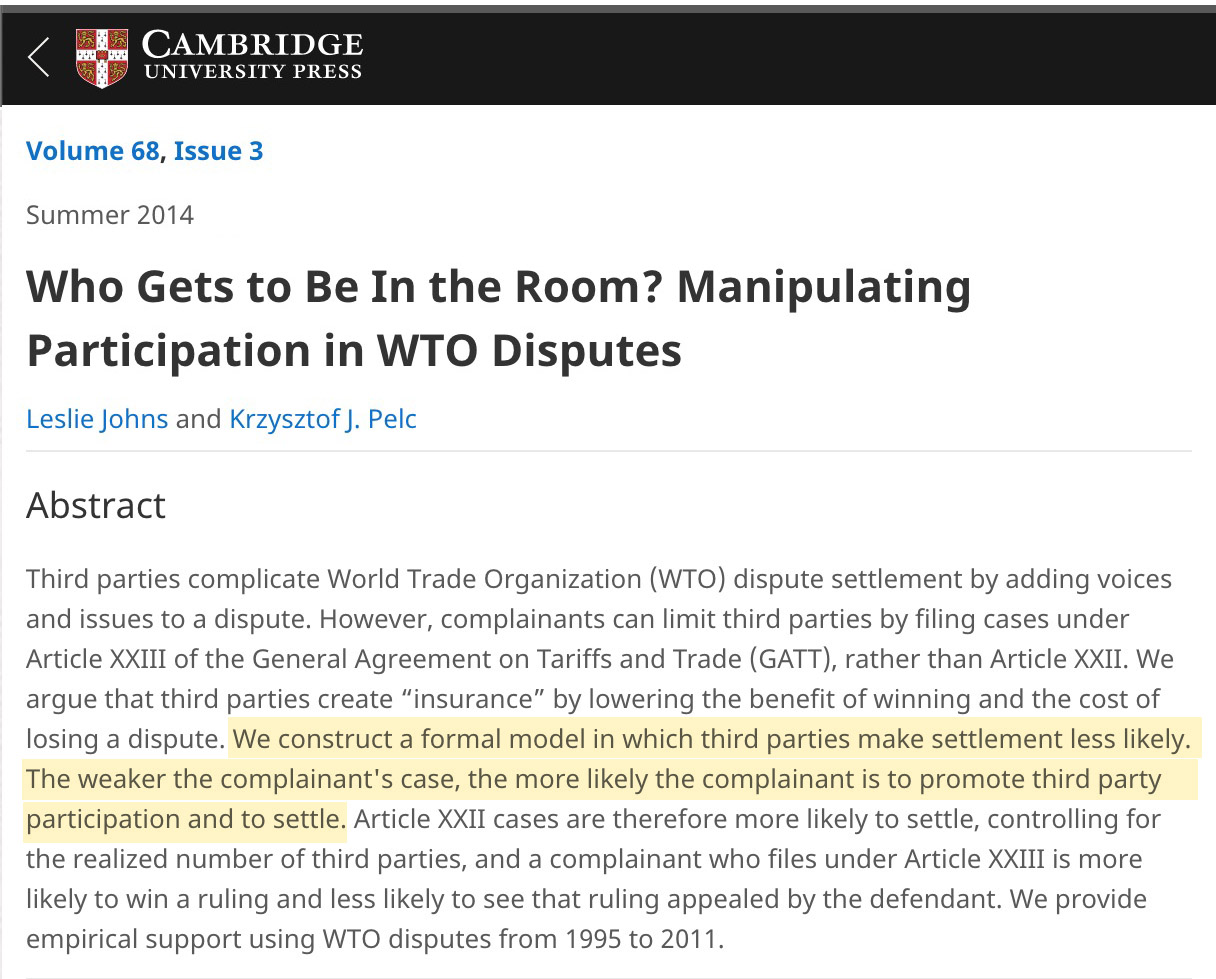
Leslie Johns & Krzysztof J. Pelc 2014 - Who Gets to Be In the Room? Manipulating Participation in WTO Disputes

Leslie Johns & Krzysztof J. Pelc 2014 - Who Gets to Be In the Room? Manipulating Participation in WTO Disputes
And perhaps most important, the partisan character of amending activity changed suddenly with the advent of recorded electronic voting. With new voting procedures in the 1970s, [the minority party] could force [the majority party] to go on the record, often repeatedly, on divisive amendments. [The minority] actively sought ways to challenge committee products, raise ideologically charged issues, and force recorded votes...in order to compel [the majority] to take politically dangerous public positions. The effect, quite naturally, was to heighten the personal and partisan conflict on the floor.Steven Smith 1989
Call to Order
In today’s Congress, procedural votes are often little more than an informal declaration of partisan identification. With few exceptions, a member, quite independently of their view of the substance of the legislation, will vote as though party leaders are the primary audience... (Due to the relative visibility of consitutent scrutiny) We would expect that the member’s partisanship is relatively more important on procedural votes and that the members’ constituencies are relatively more important on final passage votes.Stephen Jessee & Sean Theriault 2014
The two faces of roll-call voting
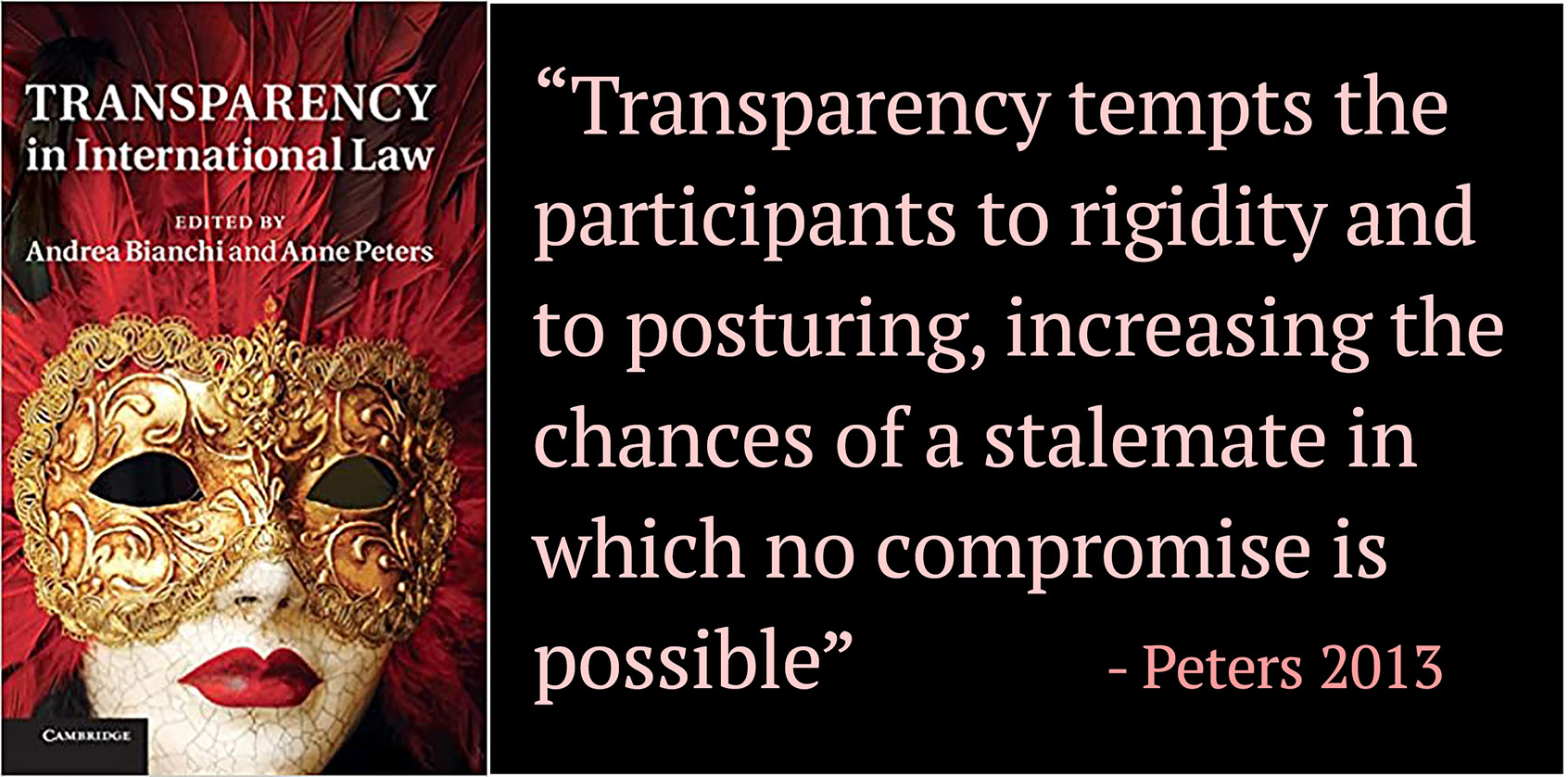
Anne Peters 2013 - Transparency in International Law

Anne Peters 2013 - Transparency in International Law
Respondents serving in agencies before and after implementation of the [sunshine laws] provide some empirical underpinning… They suggest that prior to 1977 there was extensive and consequential interaction among members acting as a collective. Almost all (80.1%) say that the important matters were often discussed in formal meetings of agency members. Informal sessions on such matters involving at least a majority of members also occurred with some frequency, according to almost half (43.0%). Furthermore, a very high proportion (85.8%) characterized members as making up their minds on issues, most or some of the time, after discussion in meetings. [Nowadays, since the sunshine laws] a large number (83.1%) of respondents from agencies with full-time membership [claimed] that members now typically make up their minds on matters dealt with in open meetings prior to collective discussions.David M. Welborn, William Lyons & Larry Thomas 1984
Effects of the Federal Government in the Sunshine Act
In short, legislative process enables the parties to wage partisan wars, not just policy wars... In many, if not most cases in the current Congress, votes taken on the floor are political. In other words, they are meant to distinguish the two parties rather than create good public policy. In other words, opportunities to make the opposition party look bad are just as likely to receive votes as those that create good policy... Legislative process is arguably the backbone to today’s polarization.Josh Huder 2013
It’s Congress’ Fault
Former Republican US Representative, Trey Gowdy tells MSNBC that closed door hearings work far better and reduce bickering – Oct 24, 2019
Former Republican US Representative, Trey Gowdy tells MSNBC that closed door hearings work far better and reduce bickering – Oct 24, 2019
Does Party Influence Roll-Call Voting?... Yes. We find that overall parties exert detectable influence on 44% of all roll calls and 69% of close votes... To Krehbiel’s question “Where‘s the party?” we answer, “In the votes.”James Battista & Jesse Richman 2011
Party Pressure in the US Legislatures
One manifestation of the leaders’ demand for loyalty is a rising number of roll call [public] votes on which a majority of Republicans line up against a majority of Democrats.Congressional Quarterly 2005
House Democrats Reach Record Unity
The right way to put this… you remember these old arguments during Obama’s Presidency, people would say “if Obama would just come out and give the right speech in favor of X or Y, he could push it over the top.” But the political science research shows that if the president weighs in and takes a side, that has the effect of polarizing it and reducing support. What’s happened is, that principle has been extended to cover everyone – any politician who who takes a public stand on an issue – de facto polarizes it. So the only way to have a bipartisan agreement on an issue and have it actually pass is to do it almost entirely in secret.David Roberts and Matthew Yglesias 2020
Secret Congress and the Climate
In the first systematic study of congressional voting, A. Lawrence Lowell (1902 ) reported on the frequency with which 90 percent or more of one party opposed 90 percent or more of the other party on congressional and British House of Commons roll-call votes, finding far more party voting in the House of Commons than in the houses of Congress. Lowell wrote of party influence but was just as likely to more properly refer to the frequency of “party lines.” Indeed, Lowell was quite aware of the limitations of his approach. He noted how rules (such as those affecting the ease of getting roll-call votes or the treatment of public and private bills) might influence his measure of party voting. Steven Smith 2007
Party Influence in Congress
The House Democrats, however, have had a method of dealing with some few of their party members that amounted to near tyranny over them on critical party votes. The technique has been limited to party stalwarts from those cities where the party organization has been unusually strong, so strong that it controlled the nominations of those put up for election. Tammany Hall, in recent years an ineffective force in the House of Representatives, once could direct its members how to vote on bills coming before the House. Rayburn once privately described how this was done by John Carew, Tammany’s boss of the New York City delegation in the House during the 1920’s. Carew, said Rayburn, bunched his New York Democrats in the front row of the House. Then he shook his fist in their faces and said: “God damn it, you’ll vote for this thing, or you won’t come back here. I’ll see that you don’t get renominated.” Rayburn recalled another Tammany leader who insisted that his men in the House improve their poor record of attendance on the floor of the House. He told them that if they did not want to attend the sessions of the House, there were others back home who did. The Tammany men took alarm, Rayburn said, and thereafter took prominent front seats in the House for each session. This strict party discipline over the Tammany men in the House broke down in the 1930’s, but it was imitated by similar discipline in the ranks of the Chicago Democrats . Thomas O’Brien, onetime sheriff of Cook county, has been the boss of the Chicago Democrats in the House in recent years. He did not brook independence among his men on important votes. He used to call on Rayburn in the Speaker’s office. “Mr. Speaker, “ he would ask, “how do you want the boys to vote?” Rayburn then would tell him. “That’s the way they’d vote, “ Rayburn said. “If Tom O’Brien doesn’t want those fellows to come back to the House, they don’t come back.” William Green of Pennsylvania, political boss of Philadelphia, has denied he has used any similar threats of disciplinary action in keeping his colleagues from Philadelphia in harmony with party policy, but the Philadelphians in the House normally have voted together. “On party matters,” Green said, “we are usually agreed ninety-eight or ninety-nine per cent of the time. We usually talk it over before the vote.”Neil MacNeil 1963
Forge of Democracy
I’m always struck when I walk out of [closed committees] that they seem to actually be very civil, sane and constructive. That’s not always the case when when the cameras are on, unfortunately.Representative Derek Kilmer (D.Wa) 2019
Select Committee on Modernization
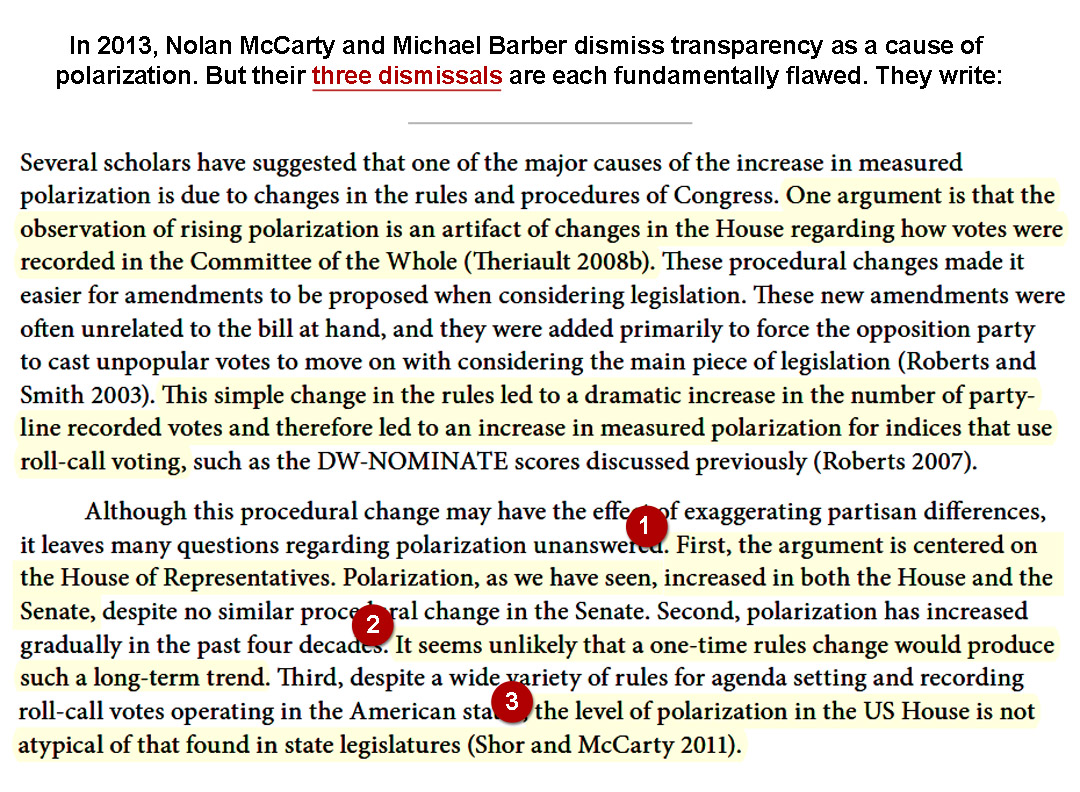
Why are McCarty and Barber’s claims flawed?
CLAIM 1: Both the Senate and the House were under similar ‘sunshine’ pressures in the 1970s, so we expect similar results.
CLAIM 2: Of course a one-time rule change could have long-term effects. For example, what if a rule allowed Speakers to reject votes of any member.
CLAIM 3: State legislatures followed the lead of Congress and opened their deliberations up around the same time. So if transparency drives partisanship we would expect the same results in state legislatures.

Why are McCarty and Barber’s claims flawed?
CLAIM 2: Of course a one-time rule change could have long-term effects. For example, what if a rule allowed Speakers to reject votes of any member.
CLAIM 3: State legislatures followed the lead of Congress and opened their deliberations up around the same time. So if transparency drives partisanship we would expect the same results in state legislatures.
The principal cost of transparency is that the glare of the public spotlight can produce bad deliberation that is not conducive to necessary compromise – deliberation infected by posturing and ideological polarization.Elizabeth Garrett & Adrian Vermeule 2006
Transparency in the Budget Process
Live television gives this [voter] hunger for revenge an extra wallop. For some, seeing a senator from your team spar with the other side’s high court nominee produces a thrill close to watching a live televised sporting event. There’s a tension and spark you don’t get from watching highlights later on the late news.Joe Ferullo 2022
Eliminate television coverage from Supreme Court
By secret discussion no man felt himself obliged to retain his opinions any longer than he was satisfied of their propriety and truth, and was open to the force of argument.James Madison 1830
Records of Federal Convention
Behind closed doors nobody can talk to the galleries or the newspaper reporters. Buncombe is not worthwhile. Only sincerity counts. Men drop their masks. They argue to, not through, each other. That is one reason why it would be a calamity if the demand for pitiless publicity of committee deliberations should ever prevail… Publicity would lessen the chance for concessions, the compromises, without which wise legislation cannot in practice be secured. Men are averse to changing their positions or yielding anything when many eyes are watching. It is in the conference room that agreements are reached, results accomplished.Robert Luce 1926
Congress: An Explanation
So the first vote [on Jesse Helm's motion to preserve the patent on a confederate flag] went ahead, as senators dashed in from lunch and hurried off to committee meetings. Senator Robert F. Bennett, a Republican freshman from Utah, told the Senate later that he “didn't have the slightest idea what this was about” but that he had joined instinctively in an effort to keep Democrats from killing a Republican amendment. [After Braun’s impassioned speech and apparently understanding the non-germane amendment offered by Helm’s] Mr. Bennett later offered the motion that enabled the Senate to reverse itself on the issue.Adam Clymer 1993
Daughter of Slavery Hushes Senate
The most obvious way that parties can reduce negotiation costs and secure logrolling agreements is through party discipline. Then it is possible for a small number of party representatives to negotiate a logroll and secure that they have the votes to implement it. Given that parties have to take a position across different issue domains, this increases the probability of securing a comprehensive logroll. Indeed, the coalition program of a European parliamentary democracy can essentially be seen as a grand logroll.Anthony J McGann 2019
Logrolling and CoalitionsNote: In this piece McGann claims that logrolling is ‘an essential part of the legislative process.’ Yet, he declares the advantages of logrolling (vote-trading based on public legislative votes) without once considering the negative sides of open voting. These negatives include the ability for powerful outside (and even foreign) interests to monitor member’s votes, driving bribery, extortion and intimidation. This means that McGann’s ‘essential part of the legislative process’ is a principal driver of government capture. Further the public voting allows for another pernicious aspect of legislation, one that we call weaponization. This line of supposedly cool and rational ‘economic’ thinking with respect to the benefit of logrolling, begins with Gordon Tullock’s work in 1959. And it continues obliviously until today, as if untarnished by the scads of evidence. It ignores the publications of Mancur Olson and it ignores the outrageous rise in lobbying when the votes of legislators are made more public. In the citation above, McGann claims that logrolling even works better if the parties polarize more. This tragic outcome is precisely what we observe. Further remarkable is that this work is widely endorsed by libertarian powerhouses like Charles Koch. Which makes sense, because open voting is the central tool that allows them to control (and capture) government. Studying logrolling without mentioning bribery or intimidation is a bit like studying egg production without acknowledging chickens.
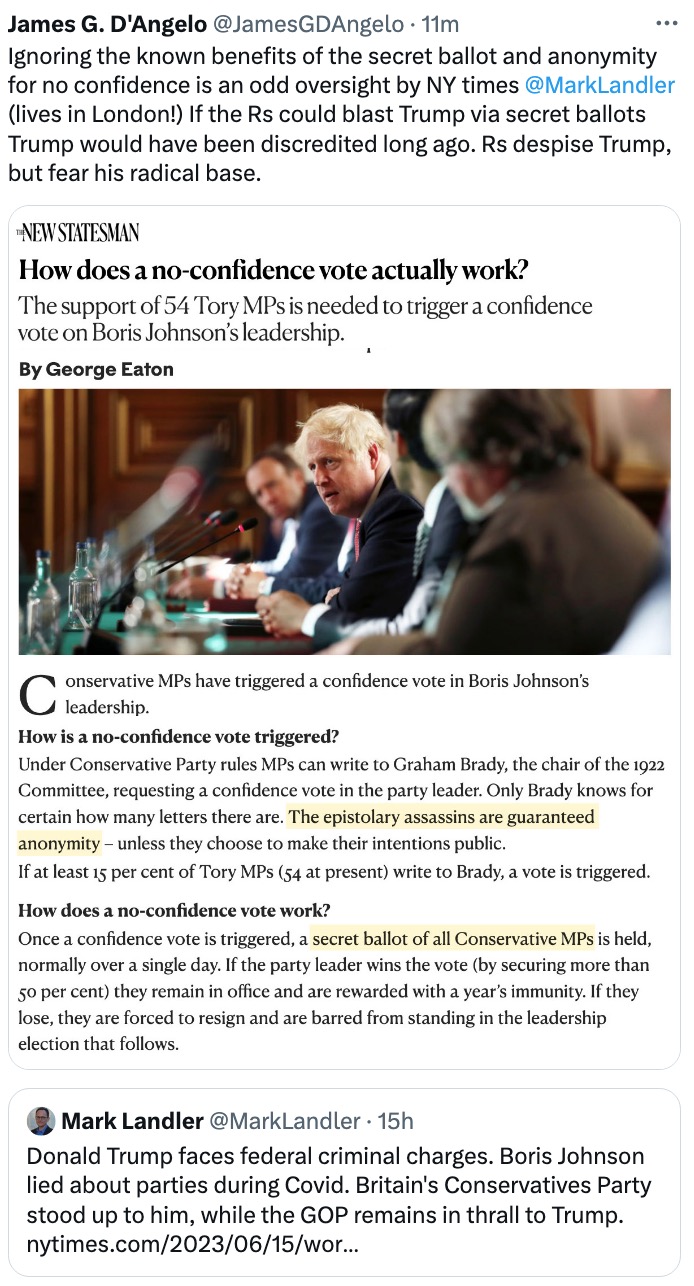
James D'Angelo 2023 - Partisan support of Trump vs Johnson

James D'Angelo 2023 - Partisan support of Trump vs Johnson
Big fights and polarizing causes tend to attract the most attention, and partially because of that spotlight, the bills tied to them tend to be the hardest to pass.Russell Berman 2022 Atlantic Magazine
Shadow Congress
The senators of a generation ago were not just physically separated from their constituents most of the year they were insulated from the public scrutiny that now seems to govern members’ lives every day they are in office. And all this constituent pressure, from constituencies with vastly different demands, pulls senators apartAlan Ehrenhalt 1982
CQ – Team Spirit of Days Gone By Evades the Senate
By these standards, given the institutional changes to increase openness that have taken place at different levels of government in the United States over the last forty years, we would logically expect polarization to have decreased. If the opposite has taken place, then this may be due in part to the fact that greater publicity of debate between representatives has actually reinforced polarization. David Stasavage 2006
Polarization and Publicity
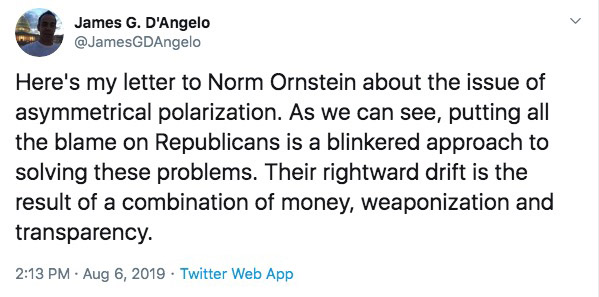
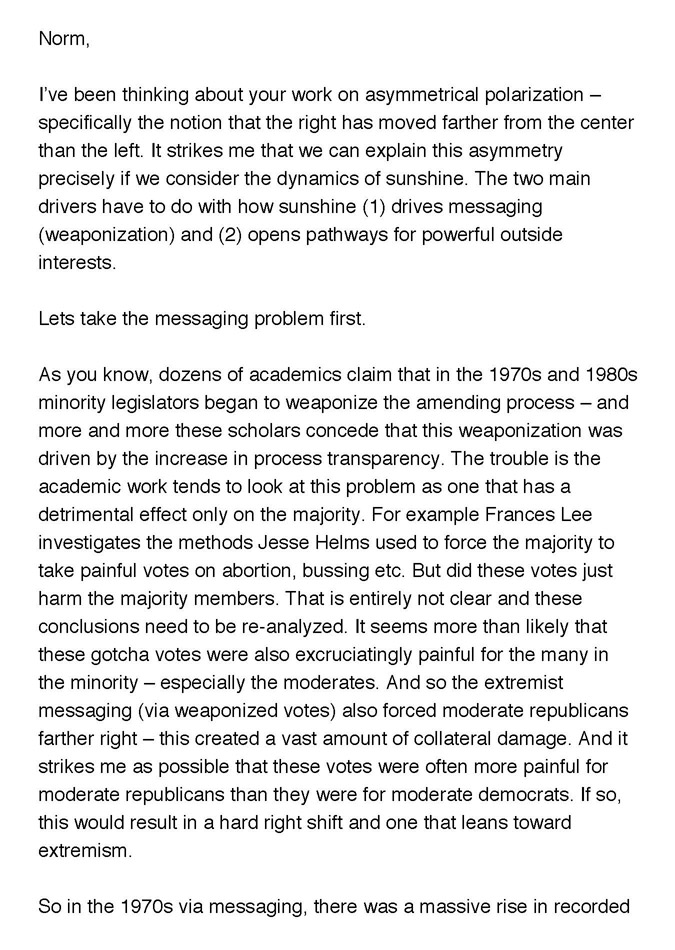
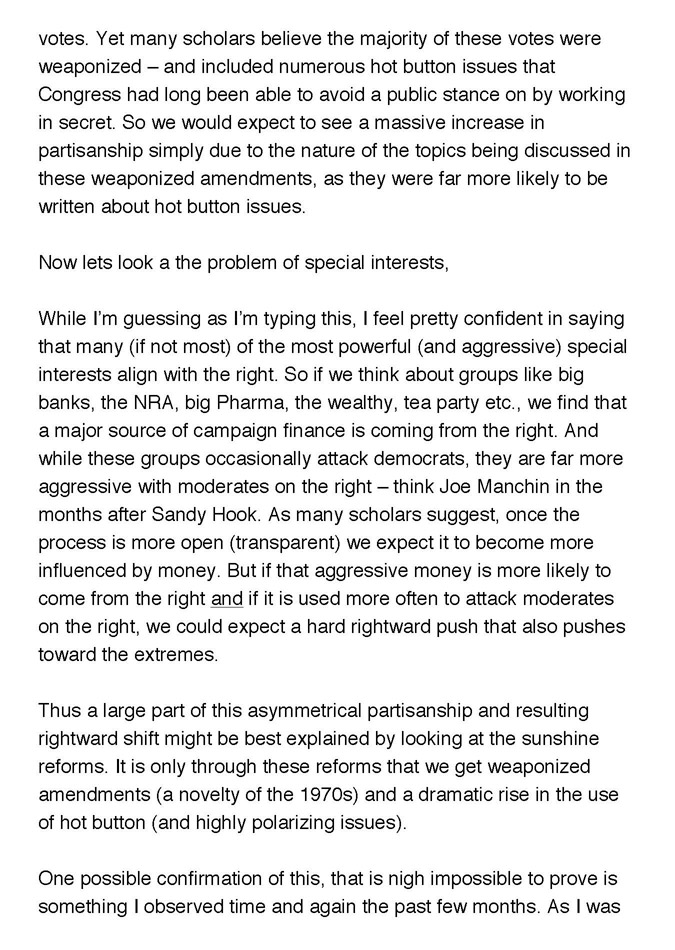
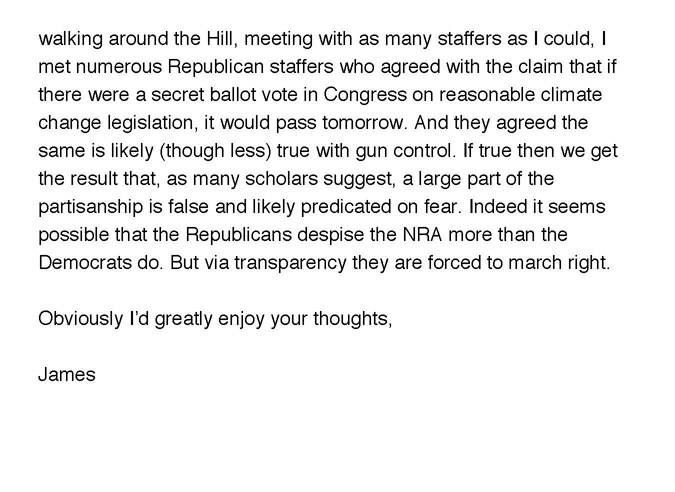
James D’Angelo 2019 - Email about Asymmetrical Polarization

James D’Angelo 2019 - Email about Asymmetrical Polarization
Secrecy afforded us the cover to move away from long-held positions that would have generated an outcry from interest groups on both sides were it conducted in public – one of the great recurrent problems of trying to hash out a bipartisan bill. Rep. Henry Waxman 2009
How Congress Really Works
Why does secrecy facilitate revision and thus compromise? Note first that the public typically dislikes it when politicians change their views; few things are worse for a politician than being labeled a flip-flopper. It is an open and interesting question why voters dislike this so much. It might be that changing one's views signals a lack of principle, thereby suggesting that one is untrustworthy (Fearon 1999: 62-63). Regardless of the cause, it is certainly true that citizens generally dislike it when those representing them change their positions. This incentivizes politicians to remain steadfast, which makes compromise difficult. Secrecy reduces this barrier to compromise, as it is now impossible to determine whether a politician has changed her views over the course of a debate. With secrecy, the public only knows the outcome of the debate; in the case of the convention, the public only knew what constitution was ultimately decided on. Shrouded in opacity, politicians need not worry about altering their positions as the debate proceeds. This facilitates compromise.Brian Kogelmann 2021
Secret Government
Secrecy at the convention calmed partisan sentiment. Edmund Pendleton, the chancellor of Virginia, remarked that the convention's secrecy was beneficial in that "it occasioned the Ebuliations of Fire, Fancy & Party amongst the Members to evaporate in the room of their Session" (Kaminski 2005: 9). Echoing this, Alexander Hamilton noted that "had the deliberations been open while going on, the clamours of faction would have prevented any satisfactory result" (Kaminski 2 00 5: 1 2). The general idea here is that secrecy quieted partisan fervor, allowing the deliberation to proceed in a bipartisan fashion)- Clearly this is desirable. Just as steadfastness in one's position is a barrier to compromise, so is partisanship. Much of the time, partisans would rather score political points by attacking the opposition and bolstering their own image than work to find real solutions to pressing problems. The result is that nothing productive gets accomplished.Brian Kogelmann 2021
Secret Government
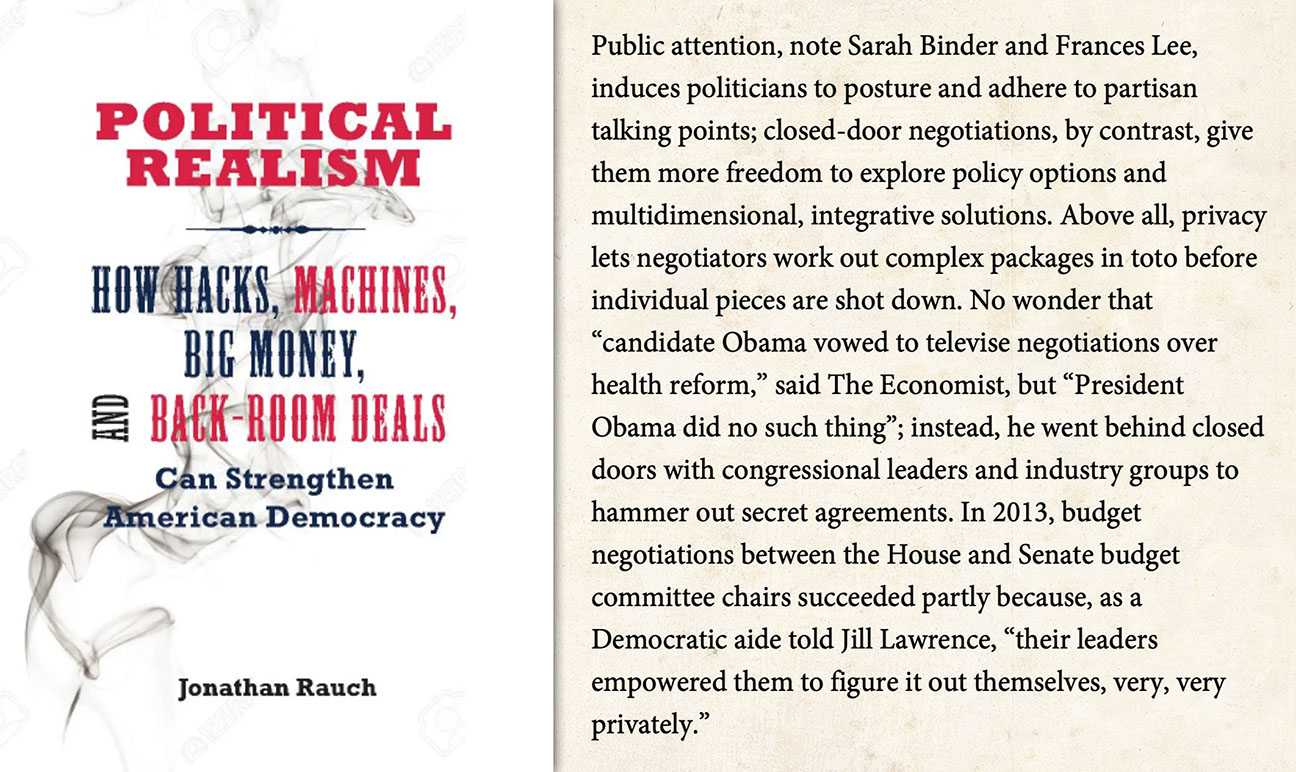
Jonathan Rauch 2017 - Is Congress Broken (Obamacare Secrecy)

Jonathan Rauch 2017 - Is Congress Broken (Obamacare Secrecy)
The cue system “can lead to polarized ideological groupings and group voting... It can prevent Congress from being a deliberative body involving compromise.”David Vogler & Sidney Waldman 1985
Congress and DemocracyNote: The cue system was greatly enhanced by the 1970 sunshine reforms. In the section describing the 1970s opening up of committee votes Vogler and Waldman write: “‘The doorman has become the most powerful man in the House.’ [This refers to the] party employee at the entrance to the floor, who gives a thumbs up or down sign, or some similar signal, to members as they come into the chamber from their party’s cloakroom. ‘Cue givers influence the votes more than consideration of debate on the floor.’...Many studies have found party (in one form or another) to be the most important cue giver.”
On Thursday, the NRM's Central Executive COmmittee (CEC) approved an amendment of the party's constitution to rid voting by secret ballot and instead allow voting by queuing in the internal elections. No candidate is expected to oppose the president in a move that will tighten his grip on the ruling party. Party electoral commission chairperson Dr. Tanga Odoi says the queue voting seeks to streamline violent and shoddy primaries and 'bad manners' which leave the pary divided every electoral season.Jonathan Kamoga 2020
NRM to endorse Museveni for another termNote: In Uganda members of parliament sought secret voting in the legislature to diminish the intimidating presence of the president - who actively opposed secrecy. Clearly open voting diminishes partisanship as it allows for leaders to intimidate their rank and file.
A rules change in 1975 opened all Senate committees to the public. This move provided interest groups and the news media more information with which to influence and report on the chamber’s deliberations. This significantly altered the legislative environment by making compromise more difficult. James Wallner 2013
The Death of Deliberation
ADA and ACA scores have been heavily utilized in political science as proxies for liberalism and conservatism and used to demonstrate the growing polarization of the congressional parties. Archival evidence suggests, however, that those scores were intended to create the very phenomenon they have been used to measure. They were deeply political rather than objective metrics, which the ADA and ACA used to guide their electoral activities in accordance with an increasingly partisan strategic plan. Each group directed campaign resources toward incumbent lawmakers they rated highly, but they did so unevenly — with the ADA favoring liberal Democrats over Republicans and the ACA showing a preference for conservative Republicans over time. By rewarding favored lawmakers in their preferred party, and using scores to highlight and discourage ideological outliers, they hoped to reshape the parties along more distinct and divided ideological lines.Emily Charnock 2018
Interest Group RatingsNote: Scoring of votes and legislative voting scores are exclusively based on transparency, or public votes.
Secrecy is necessary to enable governments which have taken extreme positions in public to compromise in private, and to be protected against the consequences of disclosure until the terms of agreement are final and can be defended successfully against domestic critics. Charles W. Freeman Jr. 1993
Ambassador of the United States to Saudi Arabia
The reforms permitting more recorded votes is thought to be a catalyst for the polarization of voting behavior and policy stances within Congress. Once recorded voting was permitted in the Committee of the Whole, amending activity within Congress increased substantially. However, the reform permitted the abuse of open voting rules by giving members the ability to introduce amendments on hot-button issues with the sole intention of putting their opponents on the record. These votes were, and currently are, used as fodder for partisan campaigns, often neglecting the political purposes for which the amendments were introduced in the first place. Thus, many posit that the increased transparency intended with the Sunshine Reforms has proved to be a mechanism for increasing the politicization of voting within Congress. Consequently, members and parties have become concerned with how their votes will be used against them in future elections, and party polarization has widened.Casey Burgat 2015
Order in the House?
Roll-call votes…actually provide a distorted view of legislative voting behavior in general. First, for many legislatures, only a subset of legislative votes is executed by roll call. Several studies indicate that this subset is not a random sample of all votes and so may suffer from significant selection bias. Roll-call votes are typically not requested randomly by a disinterested party; they are selected by a purposive actor (such as a party leader) with a vested interest in what the vote will reveal about legislative behavior to a particular audience. Thus, we cannot be confident that we can infer behavior on the unobserved (non-roll-call) votes from the roll-call votes. This disjunct has negative implications for the use of roll-call votes to estimate legislators’ ideal points, the dimensionality of the policy space, and party influence on legislative voting. Second, legislative parties may use roll-call votes specifically to discipline their members. Roll-call votes allow legislative party leaders to monitor their members’ behavior, which is essential for accurately doling out reward or punishment.Clifford Carrubba, Matthew Gabel & Simon Hug 2008
Legislative Voting Behavior, Seen and Unseen: A Theory of Roll-Call Vote Selection
Party leaders are exclusively focused on policy and enjoy some power to discipline their members; they can make members vote one way when those members are inclined to vote otherwise. Roll-call votes allow leaders to monitor legislators’ behavior. The decision by party leaders to request a roll-call vote is therefore endogenous to their appraisal of the need to discipline, which is, in turn, a function of the distribution of legislators’ preferences with respect to the legislative alternatives under consideration.Clifford Carrubba, Matthew Gabel & Simon Hug 2008
Legislative Voting Behavior, Seen and Unseen: A Theory of Roll-Call Vote Selection
Mike Murphy, Fmr. Senior adviser to Mitt Romney and John McCain, tells MSNBC’s Andrea Mitchell that “One Republican senator told me if it was a secret vote, 30 Republican senators would vote to impeach Trump.” – September 25th, 2019
Mike Murphy, Fmr. Senior adviser to Mitt Romney and John McCain, tells MSNBC’s Andrea Mitchell that “One Republican senator told me if it was a secret vote, 30 Republican senators would vote to impeach Trump.” – September 25th, 2019
In any empirical investigation one should expect to see more uncompromising positions taken during open-door bargaining, greater polarization of debate, and more frequent breakdowns in bargaining.David Stasavage 2004
Open-Door or Closed-Door?
It is very difficult for members to move away from talking points or fixed positions in front of cameras.Frances Lee (Princeton) 2019
Select Committee on the Modernization of Congress
In the modern Congress, members seek to define themselves from their opponents by building a distinct roll call voting record.Michael Lynch & Tony Madonna 2012
Viva Voce
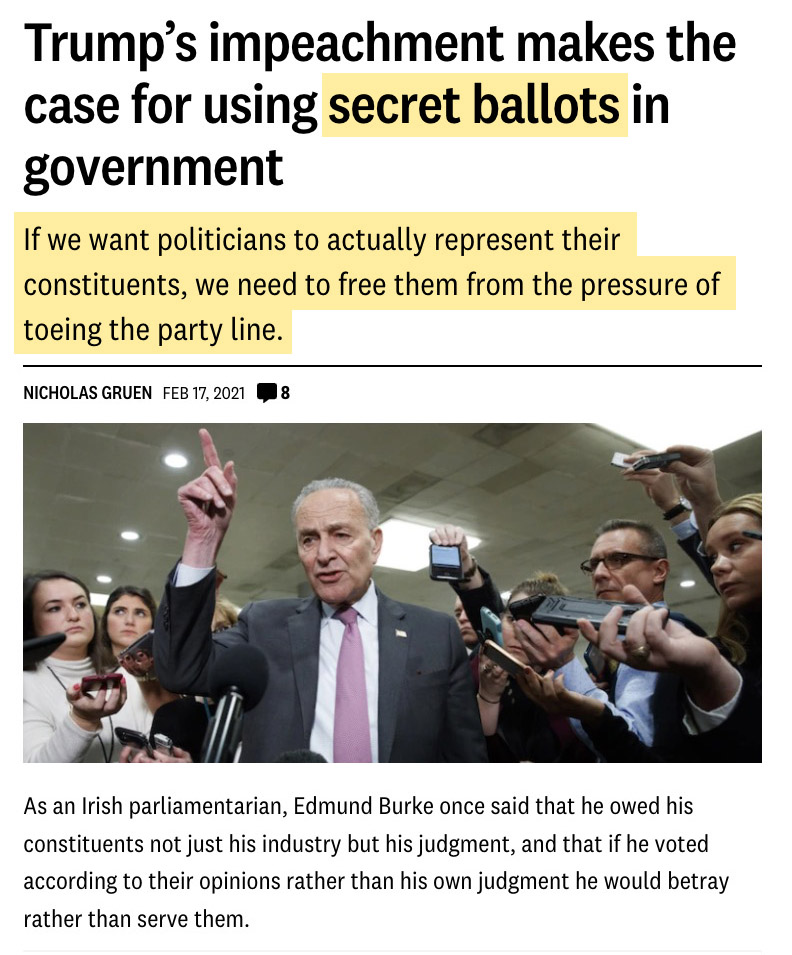
Nicholas Gruen 2021 - Impeachment makes case for secret ballots in government

Nicholas Gruen 2021 - Impeachment makes case for secret ballots in government
The legislators voting against their better judgment in 2013 in Australia, in the UK regarding Brexit, and in the US in both of Trump’s impeachment trials, did so because the alternative was career ruin. A secret ballot of the relevant chambers would have constrained the power of their parties and so protected the public interest.Nicholas Gruen 2021
Impeachment makes case for secret ballots in government
Open door bargaining also encourages representatives to posture by adopting overly aggressive bargaining positions that increase risks of breakdown in negotiations.David Stasavage 2004
Open-Door or Closed-Door?
Television cameras and reporters’ notebooks discouraged probing exchanges. With… private discussions, Rostenkowski narrowed the differences among members on controversial issues.Richard Cohen 1999
Rostenkowski - Pursuit of Power
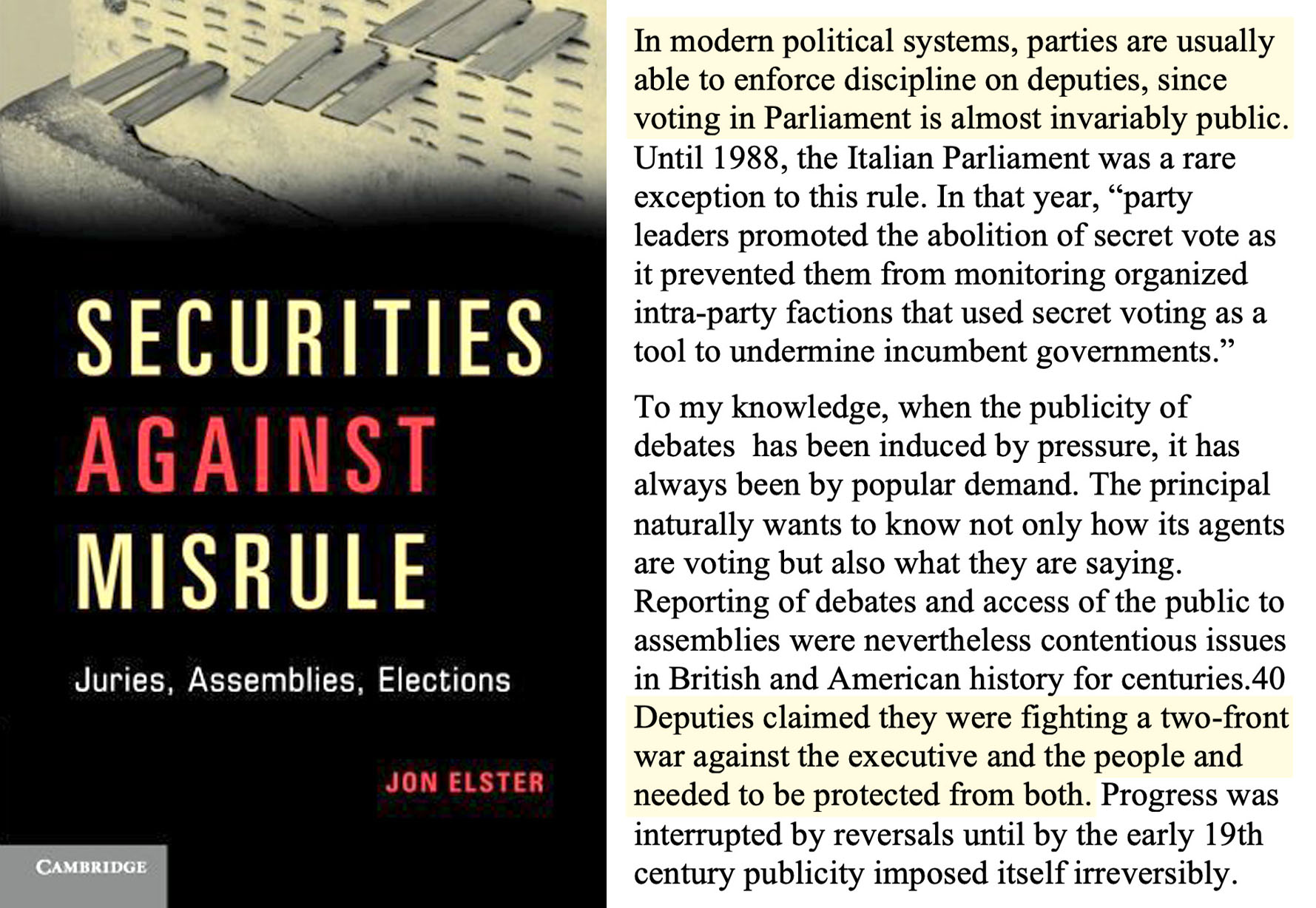
Jon Elster 2013 - Securities Against Misrule
Text: In modern political systems, parties are usually able to enforce discipline on deputies, since voting in Parliament is almost invariably public. Until 1988, the Italian Parliament was a rare exception to this rule. In that year, “party leaders promoted the abolition of secret vote as it prevented them from monitoring organized intra-party factions that used secret voting as a tool to undermine incumbent governments.” To my knowledge, when the publicity of debates has been induced by pressure, it has always been by popular demand. The principal naturally wants to know not only how its agents are voting but also what they are saying. Reporting of debates and access of the public to assemblies were nevertheless contentious issues in British and American history for centuries.40 Deputies claimed they were fighting a two-front war against the executive and the people and needed to be protected from both. Progress was interrupted by reversals until by the early 19th century publicity imposed itself irreversibly.

Jon Elster 2013 - Securities Against Misrule
When the Continental Congress first decided to keep its deliberations secret, the policy caused neither surprise nor any significant complaint. The delegates’ immediate reasons were probably tactical; it was not desirable that disagreements within the Congress should become public knowledge. The importance of this policy increased as the Congress involved itself in much inherently confidential business, including the establishment of committees to negotiate with foreign powers; meanwhile, the many deep divisions, personal animosities, and manifestations of distrust that forced their way into the light of daily debate would have impaired the credibility of the Congress both at home and, just as seriously, abroad.J.R. Pole 1983
The Gift of Government
Openness comes with costs, some trivial and others severe. For legislators, the trivial cost is having to endure the public grandstanding of one’s colleagues. The presence of C-SPAN cameras in a hearing or conference committee promotes puffery and posturing. This stretches out the proceedings and makes them somewhat more difficult to interpret. The more serious cost, however, may be in limiting the kinds of solutions that are possible. If politics is the art of crafting temporary coalitions of strange bedfellows, those awkward embraces may be more difficult when the public is watching. It is important to compromise, but it is also politically risky to be seen compromising.David King & Richard Zeckhauser 1998
Legislators as Negotiators
Whereas the roll-call vote may have developed to enable constituents to monitor the behavior of their representatives, it also has the unintended consequence of providing each party with an equivalent monitoring capacity. What of their sanctioning capacities? Another mark of the legislative party’s distinctiveness is that sanctioning is principally carried out not by other group members, but by nonmembers...As a result, data on roll-call voting can serve as a relatively error-free and quantitative measure of the party loyalty...Michael Hecter 1987
Principles of Group Solidarity
Public attention, note Sarah Binder and Frances Lee, induces politicians to posture and adhere to partisan talking points; closed-door negotiations, by contrast, give them more freedom to explore policy options and multidimensional, integrative solutions.Jonathan Rauch 2016
Political Realism
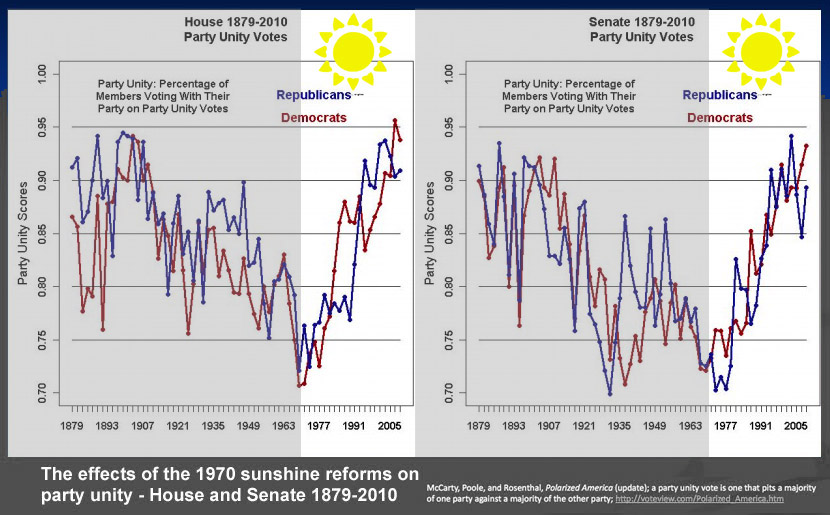
Sunshine and Party Unity 1879-2010

Sunshine and Party Unity 1879-2010
They plotted to systematically force roll-call votes that would elicit party divisions that they believed would help them make their case against Republicans. They then sought to message these differences to external constituencies, including the regular publication of a volume documenting each of the party-line votes that had occurred over the preceding year.Frances Lee 2016
Insecure Majorities
If deliberation is about transforming preferences, and publicity forces you to know what you want and stand by your position, then “public deliberation” is something of a contradiction in terms.Daniel Naurin 2003
Does Publicity Purify Politics?
Communications in this media age are faster and in more detail. Few words uttered on the floor are left unrecorded or unreported. In this environment there is less chance—and, yes, less desire—to sit down and work our problems out in a bipartisan fashion. There are fewer opportunities to work compromises, to deliberate, to “come together” (which, after all, the definition of Congress is—a “coming together”) prior to the members’ being locked into positions or forced into partisan exchanges by the swiftness of mass communication. Minority Leader Bob Michel 1984
Politics in the Age of Television
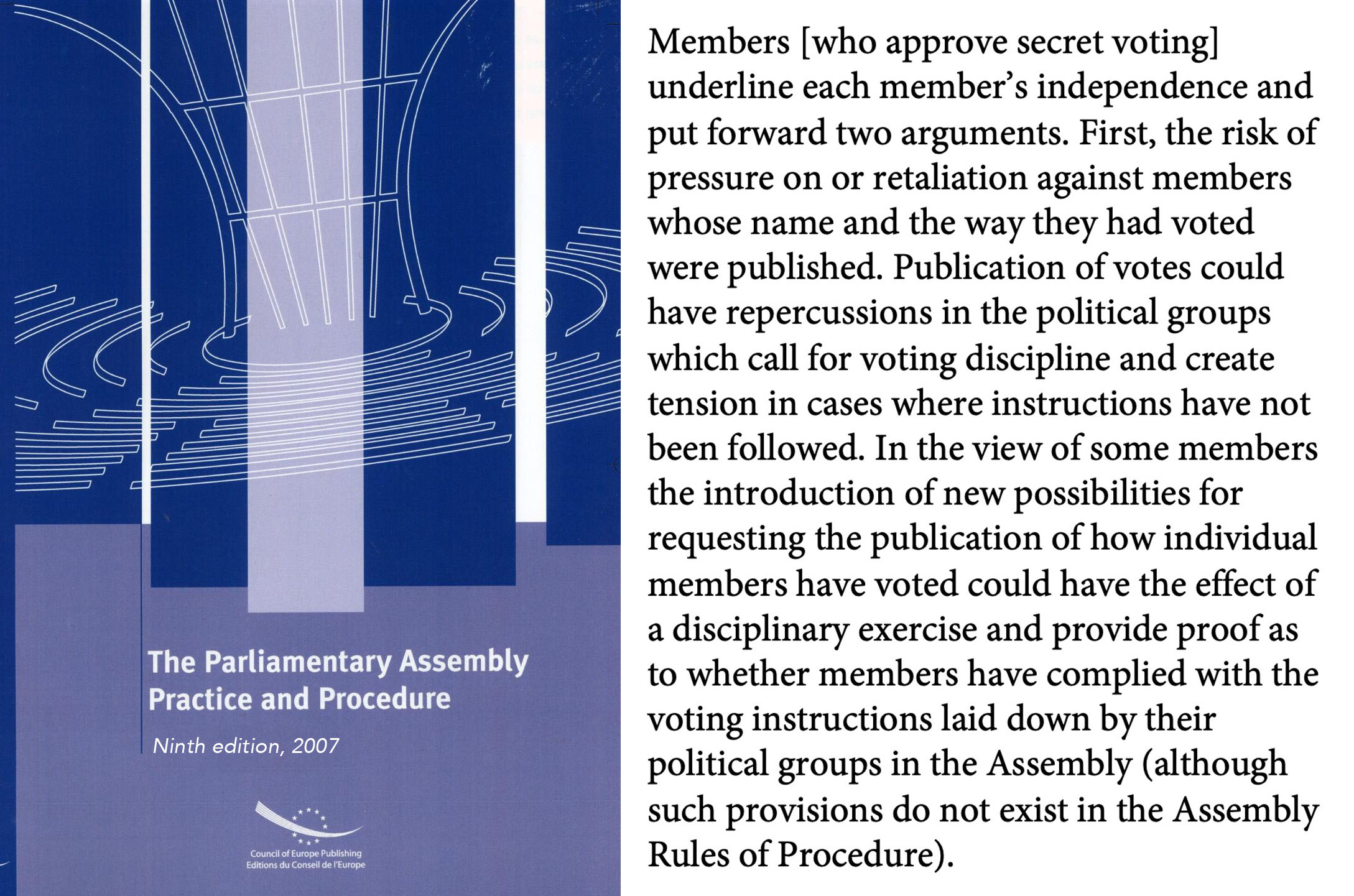
Parliamentary Assembly 2007 - European Union Party Pressures
Text: Members [who approve secret voting] underline each member’s independence and put forward two arguments. First, the risk of pressure on or retaliation against members whose name and the way they had voted were published. Publication of votes could have repercussions in the political groups which call for voting discipline and create tension in cases where instructions have not been followed. In the view of some members the introduction of new possibilities for requesting the publication of how individual members have voted could have the effect of a disciplinary exercise and provide proof as to whether members have complied with the voting instructions laid down by their political groups in the Assembly (although such provisions do not exist in the Assembly Rules of Procedure).

Parliamentary Assembly 2007 - European Union Party Pressures
Numerous congressional voting studies have found party affiliation to be the most important predictor of roll-call votes.David Vogler & Sidney Waldman 1985
Congress and Democracy
The Republican majority leaders in both the Senate and House must also be good at counting heads and twisting arms, as they seek to control the vote and maintain the cohesiveness of their party.Michael J Kryzanek 2018
Angry, Bored and Confused
Gingrich in 1997, like Speaker Boehner in 2011, worked secretly with a Democratic president to get a major but surprising compromise on important policy challenges – social security and Medicare reform in the case of Gingrich and Clinton, taxes, spending, and debt limit in the case Boehner and Obama. In both cases, secrecy was required because, once disclosed, House Republicans would object to serious negotiations and rally conservatives everywhere against any compromises with a Democratic president. Only final deal, backed by both Republican speaker and Democratic president, had any chance of success.Steven S. Smith 2021
Gingrich and the Polarization of Congressional Parties
The roll call agenda now focuses on the sorts of economic issues that will likely produce cleavage between the two parties... In this way, party polarization is a vicious cycle. Party leaders have more power in a polarized Congress and have incentive to pursue roll call votes on issues that strengthen party polarization. Consequently, it is hardly surprising that the national agenda gravitates toward economic matters that divide the parties.Neal Devins 2011
Party Polarization and Congressional Committee Consideration of Constitutional Questions
Rep. Bill Frenzel (R-Minn.), who began his legislative service as a self-proclaimed “open meeting freak,” observed that “since our meetings have been closed, our work has been less flawed… and our consensuses much stronger. I think it’s the only way to fly.” The presence of lobbyists and administrative officials at public sessions – where they can monitor members’ behavior, offer the texts of amendments, and notify their employers when and where to apply pressure – may have made it more difficult for committees to act decisively, to be responsible.Larry Rieselbach 1994
Congressional Reform
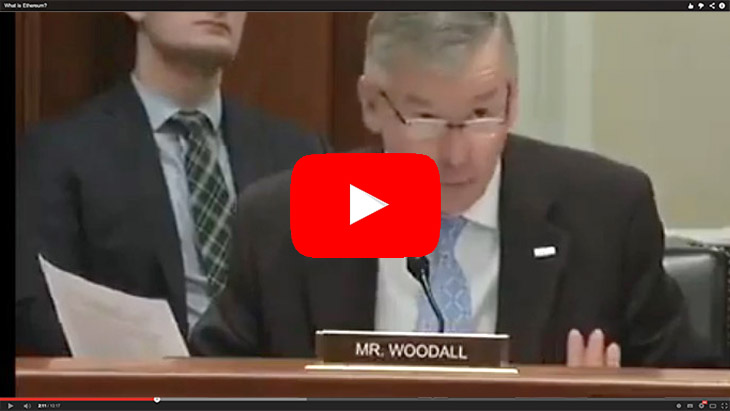
Rep Rob Woodall 2019 - House Modernization
On March 27, 2019, The Select Committee on the Modernization of Congress discussed the pitfalls of transparency. At 1:05:06, Representative Rob Woodall appears to become the first member in history to openly question the 1970s sunshine laws – making specific reference to the problems of a lack of compromise and partisanship. Here is Woodall’s statement:
“Well I thought that was interesting in Mr. Wolfensberger’s testimony, he said he’s got six things that make these reform efforts successful. By my count four of the six things were things too much transparency might threaten 1. private informal meetings are necessary 2. check your partisan guns at the at the door 3. soliciting views from other members who are not on the on the panel 4. flexibility and the ability to compromise. At some point you know the reason I can’t take pictures on the second floor of the Capitol is you never know who I might be talking to and I want the freedom to be able to talk to who I want to talk to. We don’t have that dynamic.

Rep Rob Woodall 2019 - House Modernization
“Well I thought that was interesting in Mr. Wolfensberger’s testimony, he said he’s got six things that make these reform efforts successful. By my count four of the six things were things too much transparency might threaten 1. private informal meetings are necessary 2. check your partisan guns at the at the door 3. soliciting views from other members who are not on the on the panel 4. flexibility and the ability to compromise. At some point you know the reason I can’t take pictures on the second floor of the Capitol is you never know who I might be talking to and I want the freedom to be able to talk to who I want to talk to. We don’t have that dynamic.
Most striking about the secret hearings before and after the public sessions is the atmosphere of candor and mutual respect that pervades the transcripts as the participants addressed a wide range of issues.Linda Fowler 2019
Watchdogs on the Hill (oversight)
As attractive as the notion may be that “sunshine is the best disinfectant” when it comes to politics, conducting negotiations in the open often leads to a hardening of partisan positions and a refusal to talk honestly about the political constraints affecting any deal. When done in the open and in view of a media likely to characterize negotiations as zero-sum, partisans feel compelled not to show any weakness. As a result, the entire give-and-take of a negotiation is likely to disintegrate into a game of chicken, as opponents view the process more as a way to win political points than to solve problems.Nathaniel Persily 2014
Solutions to Political Polarization in America
Spatial theories also generally do not take into account the deliberate staging of roll-call votes for the purposes of partisan public relations.Frances Lee 2016
Insecure Majorities
Congress utterly polarized? Once upon a time, members of Congress did their business mostly in secret. They struck quiet deals with each other. A Republican might support a Democratic labor measure in return for some discreet help with a farm bill. Today, everything happens in the bright glare of sunshine, policed by hundreds of ideological interest groups. Deviate one step from the party line, and you are a traitor, a sell-out, an enemy. Just ask Scott Brown, yesterday's Republican hero, today a villain for voting against the filibuster of a jobs bill. We have an ideology that more publicity, more transparency, more openness must improve Congress. And when each successive wave of openness makes things worse, we tell ourselves that the answer is even more publicity, transparency and openness still. No contrary evidence makes any impression. Seems like everything’s open – except our minds.David Frum 2010
Blame yesterday's reforms for today's gridlocked Congress
Roll-call votes provide an obvious means by which party leaders can monitor compliance with their voting instructions. Moreover, several studies of legislative behavior indicate that party leaders and members in fact request roll calls for this reason.Clifford Carrubba, Matthew Gabel & Simon Hug 2008
Legislative Voting Behavior, Seen and Unseen
The contentious House Education and Labor Committee presented a contrast to Ways and Means [under Wilbur Mills], its members being “strongly issue-oriented, personally contentious, and vigorously committed.” As Manley says, “Ways and Means has sought to remove as much conflict as possible from its bills... Education and Labor has been marked by strident partisan and ideological combat, and it sometimes makes a spectacle of its internal deliberations.” [Education and Labor used open meetings in marking up its legislation as early as 1967, several years before the House required this of all committees.]Donald Ostrom 1979
Consensus & Conflict in the House: A Revised Look at the Ways & Means & Education & Labor Committees
During the controversial governorship of William Cosby in the 1730s, the Morrisite opposition learned techniques of party warfare that left their mark on the conventions of legislative procedure. The Morrisites contributed to the use of the press as a weapon of political opposition. More than this, they saw that capital was to be made from opening the debates of the legislature to the public, and on at least one occasion they got the House to vote to throw open its doors. They wanted, moreover, to place their own votes as well as those of their opponents on the record, and in June 1737, the assembly voted to record the names of members voting “aye” and “nay” in divisions.J.R. Pole 1983
The Gift of Government
In July of 1983 the Ways and Means Committee began work on a series of tax bills to correct abuses and rewrite expiring sections in the tax code, and in doing so returned to the old practice of holding tax bill markups behind closed doors… In sharp contrast to committee deliberations on tax issues during the two previous years, the 1983 bill was a bipartisan effort. As members described the formulation process in interviews. Select Revenue Measures Subcommittee chairman Fortney H. (Pete) Stark of California and ranking Republican W. Henson Moore of Louisiana worked together closely to draft the insurance provisions at the subcommittee level, and Rostenkowski and Conable shared responsibility in the full committee in assembling some of the other components of the bill. Further evidence of the reemergence of bipartisanship was the decision to approve the package by a voice vote, and the absence of minority views in the committee’s report. Randall Strahan 1989
The New Ways and Means
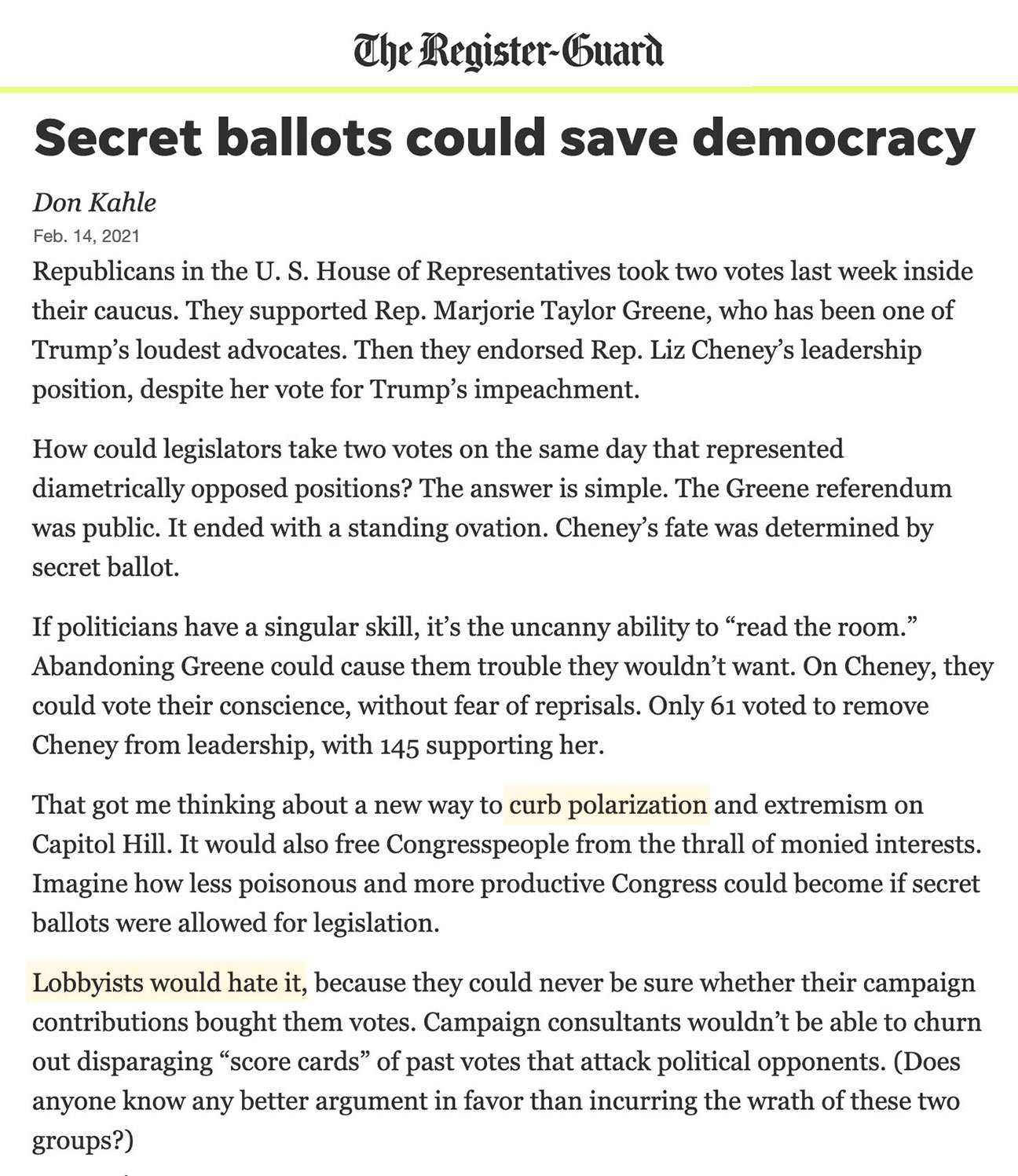
Don Kahle 2021 Secret Ballots Could Save Democracy
Text: Republicans in the U. S. House of Representatives took two votes last week inside their caucus. They supported Rep. Marjorie Taylor Greene, who has been one of Trump’s loudest advocates. Then they endorsed Rep. Liz Cheney’s leadership position, despite her vote for Trump’s impeachment. How could legislators take two votes on the same day that represented diametrically opposed positions? The answer is simple. The Greene referendum was public. It ended with a standing ovation. Cheney’s fate was determined by secret ballot. If politicians have a singular skill, it’s the uncanny ability to “read the room.” Abandoning Greene could cause them trouble they wouldn’t want. On Cheney, they could vote their conscience, without fear of reprisals. Only 61 voted to remove Cheney from leadership, with 145 supporting her. That got me thinking about a new way to curb polarization and extremism on Capitol Hill. It would also free Congresspeople from the thrall of monied interests. Imagine how less poisonous and more productive Congress could become if secret ballots were allowed for legislation.Lobbyists would hate it, because they could never be sure whether their campaign contributions bought them votes. Campaign consultants wouldn’t be able to churn out disparaging “score cards” of past votes that attack political opponents. (Does anyone know any better argument in favor than incurring the wrath of these two groups?)

Don Kahle 2021 Secret Ballots Could Save Democracy
Partisanship may increase as appropriations reach the roll-call stage.Richard Fenno 1966
The Power of the Purse: Appropriations Politics in Congress (Debt)
Our negotiations for a comprehensive tobacco bill followed the same model as they had for the pesticide measure, utter secrecy of the proceedings guaranteeing both sides the political cover necessary to explore compromises. … Negotiations were complicated by the fact that, publicly, Bliley and I represented opposite sides of a contentious issue. Anyone who watched us square off at a tobacco hearing could have been forgiven for assuming that we were mortal enemies. We were not. ... by sitting next to each other for so long, we had developed trust and respect for each other.Rep. Henry Waxman 2009
How Congress Really Works
Consider the Italian Parliament, which uniquely among major liberal democracies had a regular, although complex, practice of secret voting until 1988, when the major political parties cooperated to abolish the practice as a means of asserting greater control over their own rank and file.Adrian Vermeule 2004
The Constitutional Law of Congressional Procedure
The only committees where members negotiate are the closed door committees. As soon as the doors are open, everyone hardlines.Legislative Director for a US Senator 2016
Email to Authors
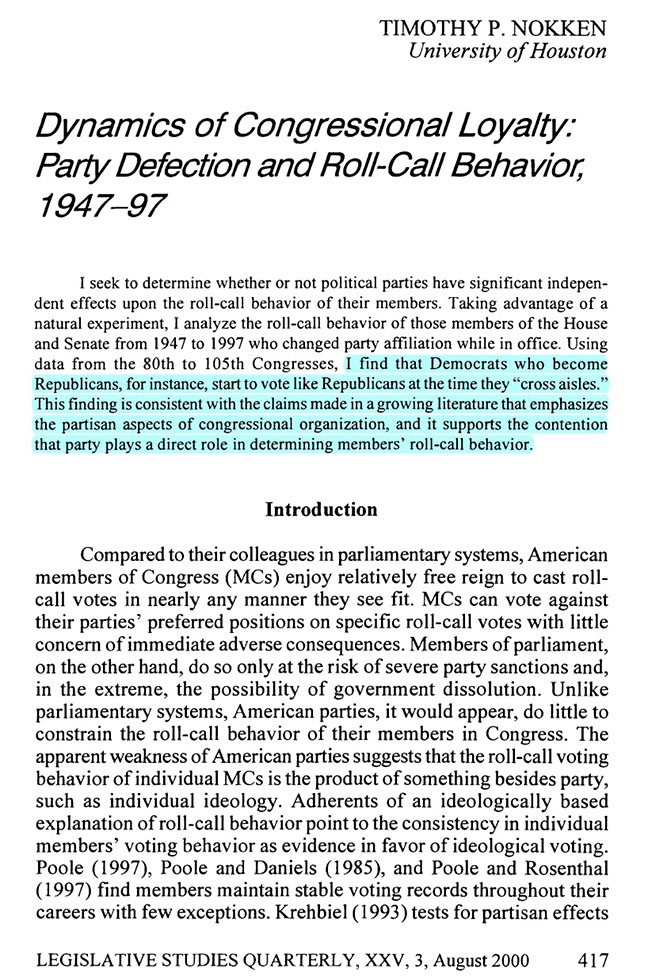
Timothy Nokken 2000 – Dynamics of Congressional Loyalty

Timothy Nokken 2000 – Dynamics of Congressional Loyalty
The addition of COW votes to the roll-call record increased the observed level of partisanship, measured in traditional party voting statistics, in the 1970s.Jason Roberts, Steven Smith 2003
Conditional Party Voting in the U.S. House of Representatives
While bills themselves may not necessarily be pursued for purely partisan electoral purposes, amendments are readily available to the rank-and-file legislator. Consequently, amendments, more frequently than bills, are likely to yield divisions orchestrated for partisan political purposes.Jason Roberts & Steven Smith 2003
Conditional Party Voting in the U.S. House of RepresentativesNote: Amendment votes are the very things that the 1970s reforms changed, by making them more visible and transparent.
Indicators and measures of polarization based on information other than roll-call voting have also been developed. One example is the National Political Awareness Test (NPAT), a survey of state and federal legislative candidates. The questions cover a wide range of policy matters, including foreign policy, national security, international affairs, social issues, fiscal policy, environmentalism, criminal justice, and many more. Most of the survey questions are asked in a yes or no format so that the data have a form very similar to that of roll-call voting... Importantly, these studies observe considerably more polarization in member roll-call voting records than in their survey responses. Scholars interpret this pattern as evidence that party leaders and party constituencies pressure members into more extreme positions than those based on their true preferences.Nolan McCarty 2019
Polarization: What Everyone Needs to Know
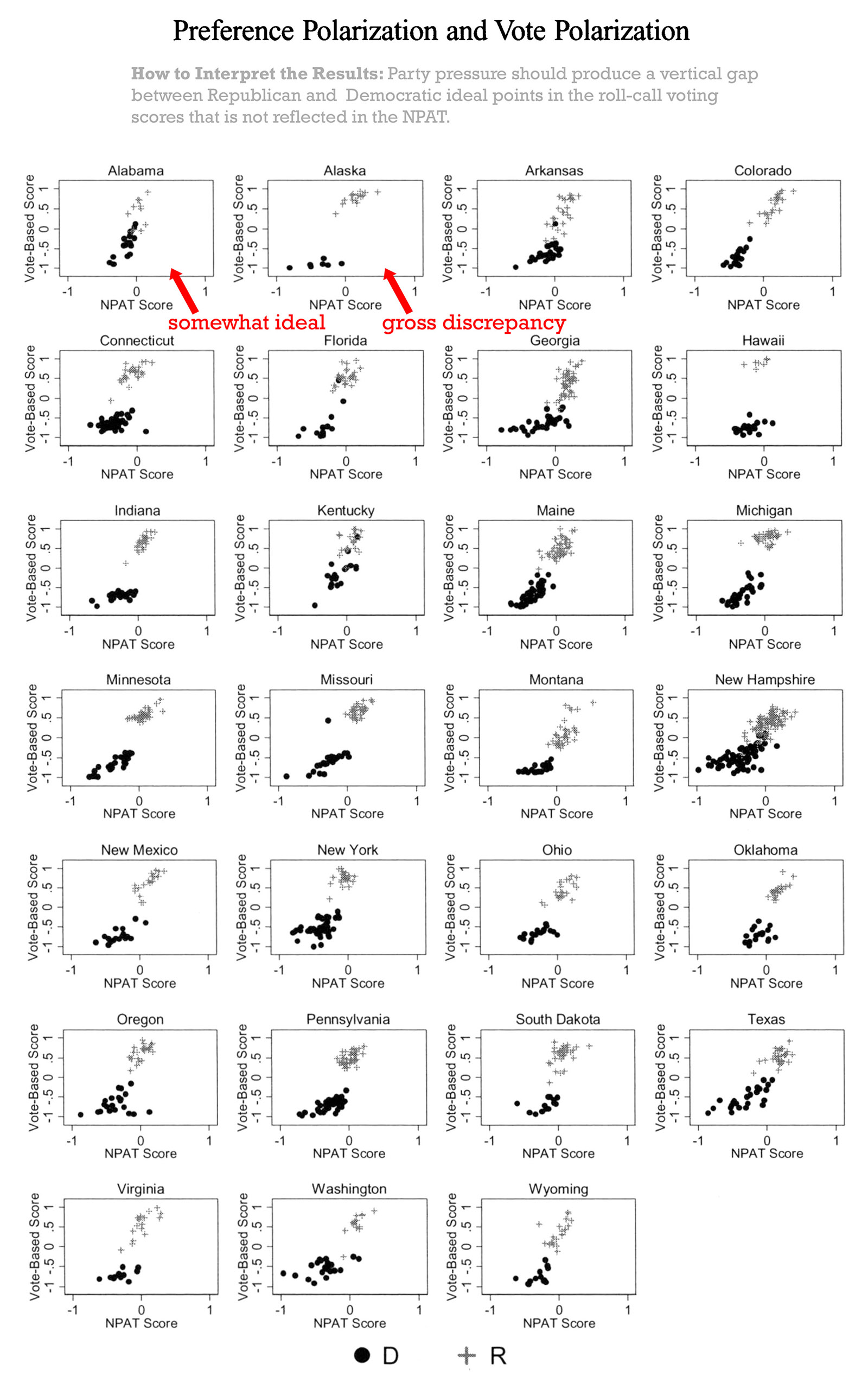
Battista & Richman 2011 - Preferences vs Votes
Note: These graphs show that recorded votes are often far more polarized than member’s positions on surveys. This implies strong party pressure on public roll call votes. Still, the results of the NPAT survey (the one used here) are also published publicly, but they receive far less public and media scrutiny. Battista and Richman 2011 briefly discuss this in their article as seen here below (note the discussions of transparency):An obvious problem with using NPAT responses to estimate preferences is that not all legislators respond to the NPAT... Still, the publicly available NPAT survey responses allow us to link members’ roll-call voting records to their NPAT responses. While the set of questions asked varied from chamber to chamber, a large common set of questions were asked in the vast majority of chambers in each year, though this common core varies across years. This core includes questions in 13 issue areas covering every important area of state government including a battery of questions about taxation and spending, alongside questions about abortion, education, crime, regulation, the environment, and welfare, to name just a few. Because legislators are aware that their responses will be made public, the NPAT provides a clear measure of legislators’ electorally induced preferences – the preferences candidates want their constituents to think they have. These electorally induced preferences are some combination of what the legislator personally prefers and what the legislator believes the district prefers. While the “true” preferences legislators hold remain unknown, their electorally induced preferences form a particularly useful baseline for gauging party effects. If anything, observing a legislator voting against his or her electorally induced preferences and for the party’s position should be an even clearer signal of party influence than we would get from observing a legislator voting against his or her personal preferences.

Battista & Richman 2011 - Preferences vs Votes
To varying degrees, scholars such as Rohde (1991), Cox and McCubbins (1993, 2005), Snyder and Groseclose (2000), Ansolabehere et al. (2001), Cox and Poole (2002), Roberts and Smith (2003), Jenkins et al. (2005), Roberts (2007) and Theriault (2008) find that members’ voting on procedural matters (among other types of votes that vary among the scholars) looks different from member voting on the final passage of legislation. They all find that members typically vote with their party on procedural votes.Stephen Jessee & Sean Theriault 2014
The two faces of roll-call votingNote: Perhaps it would have been clearer had they said that members votes appear much more partisan on procedural votes then they do on amendments or floor votes.
Republican Senators Conrad Burns (R-Mont.), Chuck Hagel (R-Neb.) and Frank Murkowski (Alaska) worried that senators would play to the television cameras and that would affect the debate. John McCain (R-Ariz.) called it “partisan posturing.” Republicans such as Mitch McConnell of Kentucky thought senators “are more reasonable” in a private setting. Robert Bennett (R-Utah) felt “a whole lot more comfortable” without the TV coverage.Marjorie Cohn 2000
Open-and-Shut: Senate Impeachment Deliberations Must Be Public
For example, when Senator Robert F. Byrd (D-W.Va.) made a motion to dismiss the charges against President Clinton, he was concerned that public debate could lead to more partisanship.Marjorie Cohn 2000
Open-and-Shut: Senate Impeachment Deliberations Must Be Public
When conferences were in executive [closed] session, members didn’t have to pound the table and make speeches they hope will be reported back hom. They could sit there and say, “You know where I sit and I know where you sit so we’ve got to compromise.”Senator Mark Hatfield (R. OR) 1979
Bicameral Politics (Longley & Oleszek)
Another key 1970 Legislative Reorganization Act change was to permit recorded votes in the Committee of the Whole, the principal amending forum in the House. Prior to the change, votes on amendments were recorded without names, such as 150 yea to 250 nay. The change enabled party leaders to exert greater control over floor decision-making by knowing which lawmakers voted as their leaders wanted, and who had not yet voted and thus needed to be “whipped” to the floor. Congressional Research Service 2014
The Evolving Congress
There are numerous interest groups largely aligned with each party that monitor the work, ideological purity, and votes of Members. If Members deviate from the groups’ programs and preferences, the lawmakers face the threat of a primary challenge from candidates more liberal or more conservative than they are. “In a partisan atmosphere,” remarked a GOP Senator, “it’s hard to help the other side without being accused [by well-financed ideological groups] of aiding and comforting the enemy.”Congressional Research Service 2014
The Evolving Congress
The bill was moved through the House by the Public Works and Transportation Committee’s “Big Four” ; that group consisted of the full committee chairman James Howard (D-N.J.) and ranking minority member Gene Snyder (R-Ky.), along with Surface Transportation Subcommittee chairman Glenn Anderson (D-Calif.) and ranking minority member Bud Shuster (R-Pa.). It was a group known for its bipartisan consensus over highway policy. Its members’ ability to put partisan rancor aside is exemplified by the relationship between Republican Bud Shuster and Democrat James Howard. During the mid-1980s, Shuster was known for his fiery partisanship on the House floor and in the Budget Committee, but his relationship with Howard was so congenial that Politics in America said that “it used to make one wonder if [Shuster] realized Howard was a Democrat”. True to their tradition, the Big Four, along with their staff, crafted a bipartisan bill behind closed doors.Dians Evans 2004
Greasing the Wheels: Using Pork Barrel Projects to Build Majority Coalitions
Of course, the benefits aren’t just limited to the Democratic side. If anonymous voting existed during the Trump turn, he could’ve introduced legislation that picked off 20% of the democratic caucus. Infrastructure and immigration reform are two examples where a moderate coalition of democrats existed and seemed willing to negotiate. Maybe they would have been more wore willing to buck their party in private.Ben Krauss 2024
The Take Bakery: Anonymous Congress
The great advantage to the open markup is that the public can see who is doing what to whom. The main disadvantage is that public view seems at times to discourage compromise, because a Congressman may fear he will be seen as “caving in” on an issue. Then too, some Congressmen cannot resist the temptation to showboat.Martin Tolchin 1977
Thoroughly Relaxed (NY Times)
Wall Street Journal 2021 - McConnell announcing that the Republicans will write amendments designed solely to put Democrats on the record – not to produce good legislation. What he doesn’t admit is that these tactics also push moderate Republicans to the edges as well.
Wall Street Journal 2021 - McConnell announcing that the Republicans will write amendments designed solely to put Democrats on the record – not to produce good legislation. What he doesn’t admit is that these tactics also push moderate Republicans to the edges as well.
Keeping independents [and moderates] in a coalition requires a continuing series of individual inducements. This requires extensive “log-rolling,” bribery, or coercion [based on public votes].Paul D’Anieri 2007
Understanding Ukrainian Politics: Power, Politics, and Institutional Design
Transparency of voting in parliament is a case in point. Adopted in the Ukraine as a barrier to the sort of pressure that the Communist Party used to ensure uniform voting, the secret ballot (in Parliament) was adopted to escape Soviet control, but it subsequently undermined the ability of party leaders to enforce voting discipline. Not only was it difficult for Ukrainian party leaders to sanction defectors, it was often impossible to know who had defected. The ability of party leaders to “deliver” votes was impeded, and, by extension, it was much harder for leaders to strike bargains because there was no way to guarantee that a party leader could deliver what had been promised. Nor was it possible for parties to verify whether deals had been adhered to or not.Paul D’Anieri 2007
Understanding Ukrainian Politics: Power, Politics, and Institutional Design
But it is still true that most matters of overriding importance are decided out of public view. When the conference committee on the tax bill seemed deadlocked earlier this year Representative Al Ullman, Democrat of Oregon and chairman of the Ways and Means Committee, recessed the deliberations to set the following day’s schedule. He went into a back room with four or five key committee members, and re‐emerged a half hour later to conclude the committee’s business and dispose of the previously thorny issues in about 15 minutes.Martin Tolchin 1977
Thoroughly Relaxed (NY Times)
While increased transparency is certainly valued, many believe an open process would undermine vigorous and frank debate, and also frustrate compromise and bipartisanship.Colleen Shogan 2011
Defense Authorization: The Senate's Last Best Hope
But compromisers are often punished at the ballot box for deal-making, Rep Bill Frenzel points out — including President George H.W. Bush, as a result of deals he made with Democrats that led to the budget act. “The electorate is impatient, unhappy and eager to devour its representatives at the least sign of weakness or impurity.”Alan Greenblatt 2012
What Shut The Back Door To Congressional Compromise
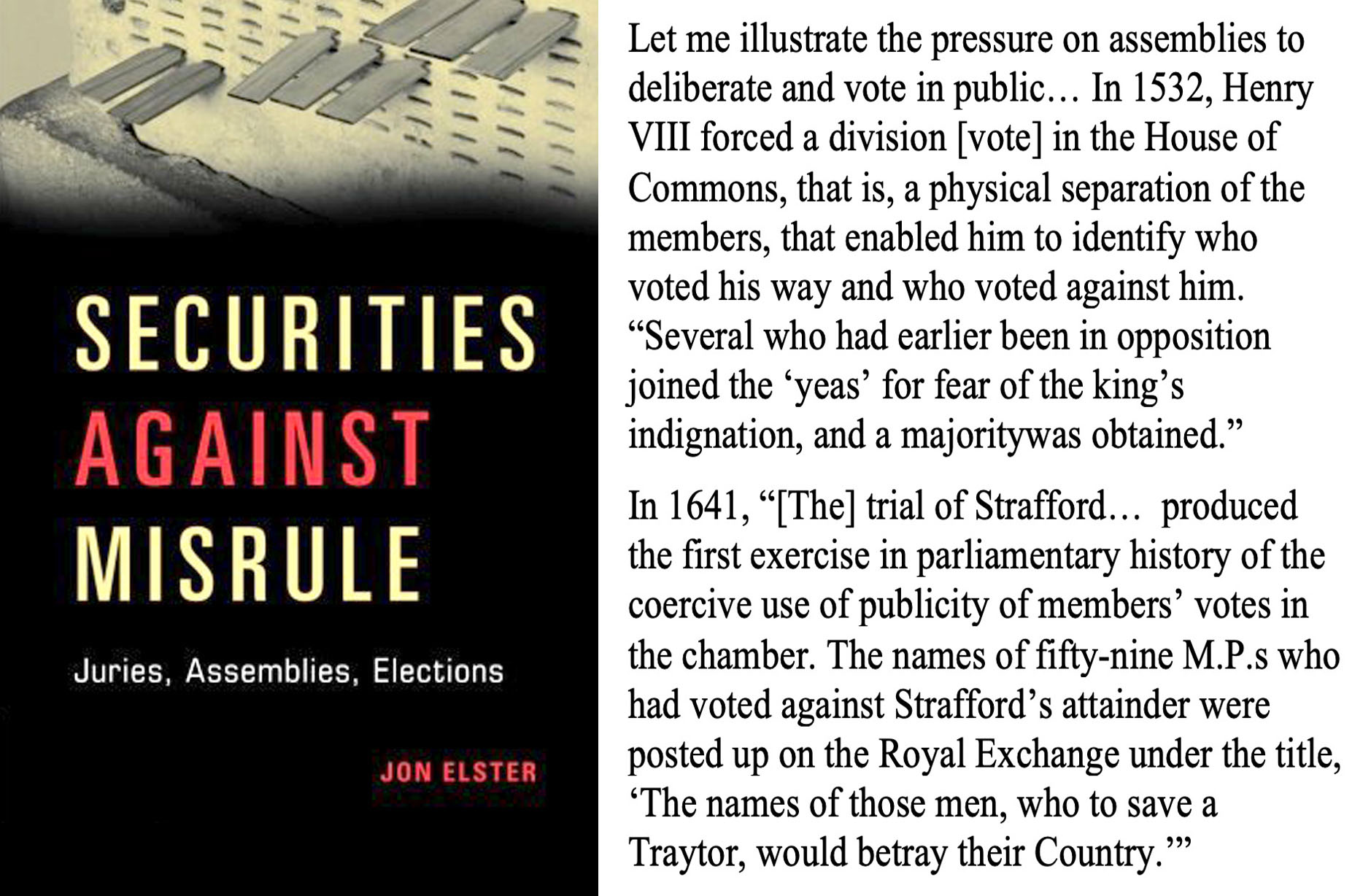
Jon Elster 2013 - Securities Against Misrule
Text: Let me illustrate the pressure on assemblies to deliberate and vote in public… In 1532, Henry VIII forced a division [vote] in the House of Commons, that is, a physical separation of the members, that enabled him to identify who voted his way and who voted against him. “Several who had earlier been in opposition joined the ‘yeas’ for fear of the king’s indignation, and a majority was obtained.” In 1641, “[The] trial of Strafford… produced the first exercise in parliamentary history of the coercive use of publicity of members’ votes in the chamber. The names of fifty-nine M.P.s who had voted against Strafford’s attainder were posted up on the Royal Exchange under the title, ‘The names of those men, who to save a Traytor, would betray their Country.’”

Jon Elster 2013 - Securities Against Misrule
Democrats who become Republicans, for instance, start to vote like Republicans at the time they “cross aisles.” This finding is consistent with the claims made in a growing literature that emphasizes the partisan aspects of congressional organization, and it supports the contention that party plays a direct role in determining members’ roll-call behavior.Timothy Nokken 2000
Dynamics of Congressional Loyalty
The evidence strongly suggests that roll-call voting behavior contains a significant partisan component.Timothy Nokken 2000
Dynamics of Congressional Loyalty
Gingrich preferred the majority party over the minority, party leadership over committees, and sunshine and messaging rather than privacy and compromise.Douglas B. Harris 2019
Robert H. Michel: Leading the Minority
In a context where few members represent swing districts, transparency tends to result in more members toeing the party line and adhering to partisan talking points.Frances Lee (Princeton) 2019
Select Committee on the Modernization of Congress
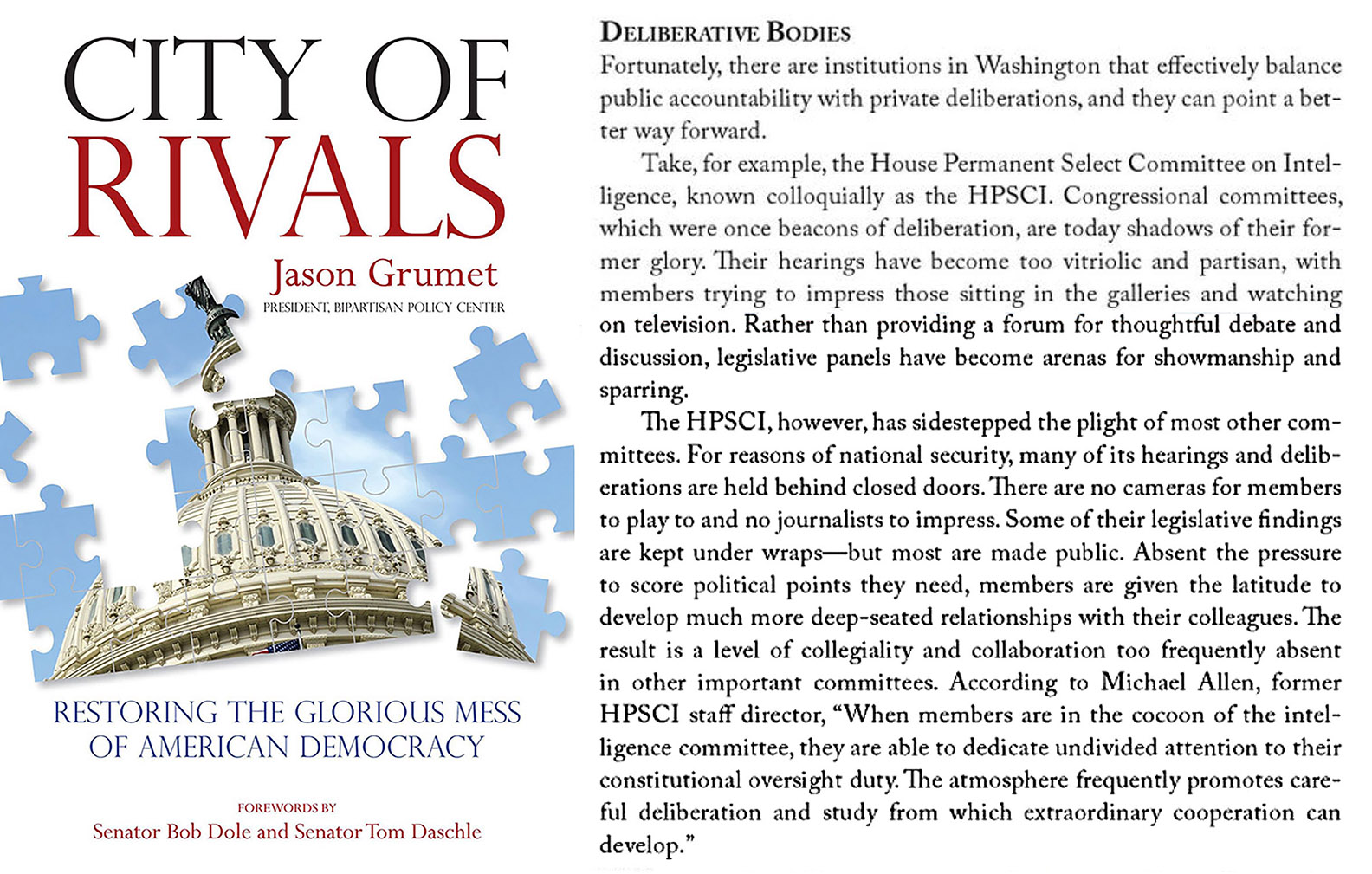
Jason Grumet 2014 – The Dark Side of Sunlight (pdf)
Text: Congressional committees, which were once beacons of deliberation, are today shadows of their former glory. Their hearings have become too vitriolic and partisan, with members trying to impress those sitting in the galleries and watching on television. Rather than providing a forum for thoughtful debate and discussion, legislative panels have become arenas for showmanship and sparnng. The HPSCI [House Permanent Select Committee on Intelligence], however, has sidestepped the plight of most other committees. For reasons of national security, many of its hearings and deliberations are held behind closed doors. There are no cameras for members to play to and no journalists to impress. Some of their legislative findings are kept under wraps – but most are made public. Absent the pressure to score political points they need, members are given the latitude to develop much more deep-seated relationships with their colleagues. Tbe result is a level of collegiality and collaboration too frequently absent in other important committees. According to Michael Allen, former HPSCI staff director, “When members are in the cocoon of the intelligence committee, they are able to dedicate undivided attention to their constitutional oversight dury. The atmosphere frequently promotes careful deliberation and study from which extraordinary cooperation can develop.”

Jason Grumet 2014 – The Dark Side of Sunlight (pdf)
As former senator Byron Dorgan once said to me: “Cable television and talk radio have had a much more profound impact than anybody understands. The political bleachers are crowded with Fox News and MSNBC brandishing microphones and waiting to cast shame on anyone who dares to reach across the aisle. They are the enforcers calling penalties on those few politicians willing to compromise.” Despite all it has done for transparency, new media has focused legislators even more on satisfying the small but intense slice of constituents who follow their tweets. Jason Grumet 2014
The Dark Side of Sunlight (City of Rivals)
In contrast, Legistat hones in on votes where there’s conflict, even though it systematically omits votes where Republican and Democratic caucuses find common ground. That may be fine for the “party cabal,” said Jones, who has taken to wearing an “F” lapel pin indicating his Legistats score. But he doesn’t think it’s good for the public. “It rewards hyperpartisanship,” he said. “Legistats essentially says the best Republican is one that always votes against a Democrat,” said Rep. Llew Jones. “It rewards for you for not working together.”Eric Dietrich 2019
Republican Lawmakers on Party Loyalty
Is the vote public? Sometimes, a no-confidence vote it is kept private if the chief agrees to certain demands from the opposition. During collective bargaining a no-confidence vote may be held to weaken your position. If members of the rank and file truly want to work through issues, they may keep the vote quiet [secret] if they see progress is being made towards mutually satisfactory resolutions. A private vote is less common; more aggressive members usually want to publicize the no-confidence vote. Often if a no-confidence vote is publicized, the majority of officers will have difficulty withstanding the peer pressure of those who support the no-confidence vote.Chief Richard Ahlstrom 2018
Predicting and Surviving a No-Confidence Vote
Healthy bipartisan compromise seems completely hopeless with this crew. But underneath that circus that circus, there has always been another layer of politics — led by people who are not as ratings-driven, but are more governance-driven. So over the past 20 years or so, while the circus has been at full roar, Congress has continued to pass bipartisan legislation: the Every Student Succeeds rewrite of federal K-12 education policy, the Obama budget compromise of 2013, the Trump criminal justice reform law of 2018, the FAST infrastructure act, the Anti-Money Laundering Act of 2020, the Trump-era ban on surprise billing in health care. In June the Senate passed, 68 to 32, the United States Innovation and Competition Act of 2021, which would devote roughly $250 billion to scientific projects. Matthew Yglesias and Simon Bazelon call this the “Secret Congress” — the everyday business of governing that works precisely because it isn’t on cable TV.David Brooks 2021
The Biden Approach Is Working
As Yglesias and Bazelon note, Congress also passed important legislation in the supposedly gridlocked closing years of the Obama and Trump administrations. The secret of this legislative success? The very fact that the legislation was secret. Well, not literally secret. But definitely not pushed by the White House, and not aligning precisely with the ideological priorities of each party's activist cheerleaders in the media and on the sidelines. The trick, it seems, is for members of Congress to find unpredictable cross-party partners to work with on issues that cut across these divides and then for the president to stay out of it, since his involvement will usually guarantee staunch opposition by members of the other party.Damon Linker 2021
The Secret Congress paradox
Republican leaders of the House have in recent years occasionally threatened to cut off these campaign contributions to party members unduly independent of their leadership.Neil MacNeil 1963
Forge of Democracy
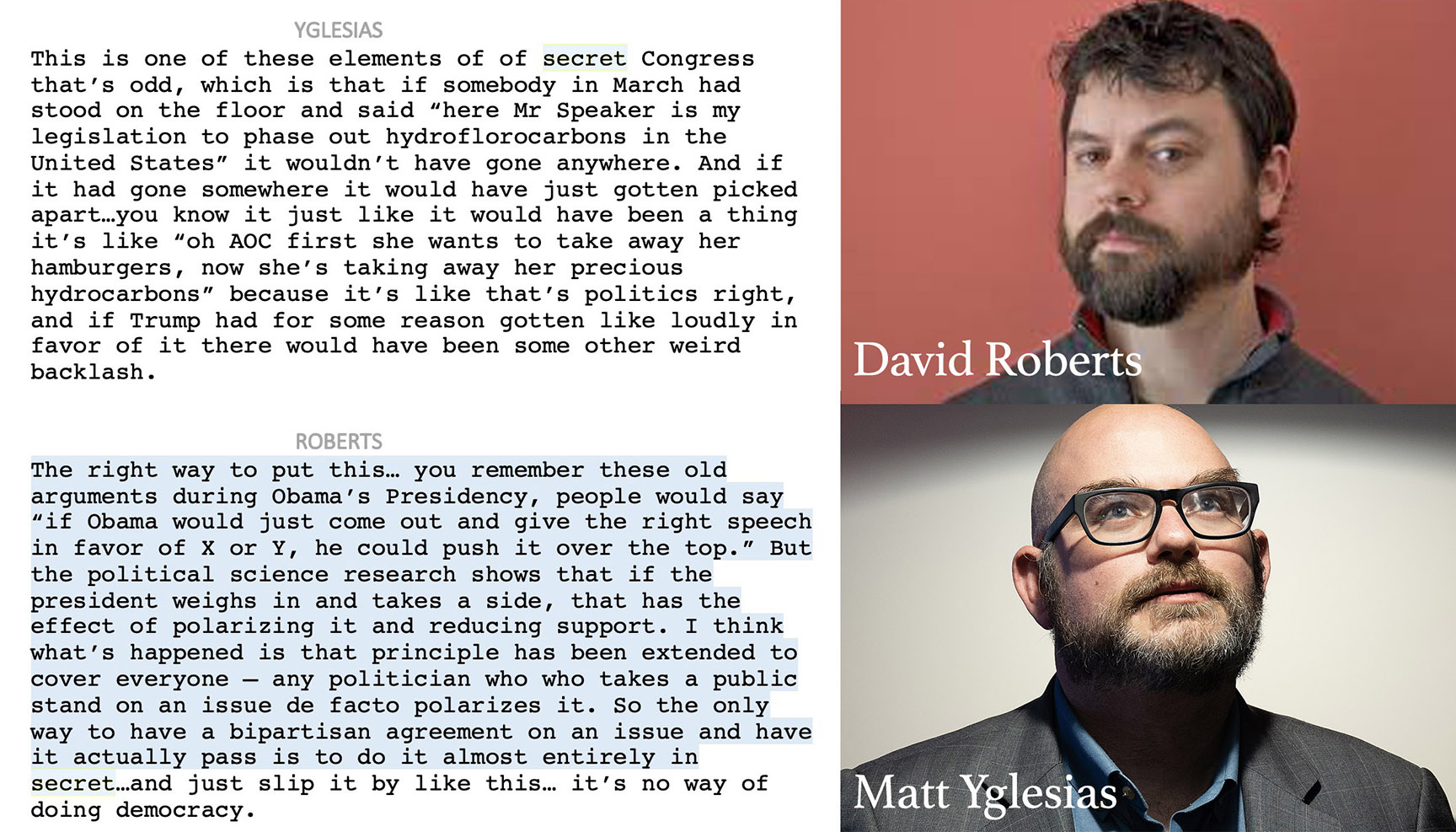
David Roberts & Matthew Yglesias 2020 - The Climate and Secret Congress
Text: YGLESIAS This is one of these elements of of secret Congress that’s odd, which is that if somebody in March had stood on the floor and said “here Mr Speaker is my legislation to phase out hydroflorocarbons in the United States” it wouldn’t have gone anywhere. And if it had gone somewhere it would have just gotten picked apart…you know it just like it would have been a thing it’s like “oh AOC first she wants to take away her hamburgers, now she’s taking away her precious hydrocarbons” because it’s like that’s politics right, and if Trump had for some reason gotten like loudly in favor of it there would have been some other weird backlash. ROBERTS The right way to put this… you remember these old arguments during Obama’s Presidency, people would say “if Obama would just come out and give the right speech in favor of X or Y, he could push it over the top.” But the political science research shows that if the president weighs in and takes a side, that has the effect of polarizing it and reducing support. I think what’s happened is that principle has been extended to cover everyone – any politician who who takes a public stand on an issue de facto polarizes it. So the only way to have a bipartisan agreement on an issue and have it actually pass is to do it almost entirely in secret… and just slip it by like this… it’s no way of doing democracy.

David Roberts & Matthew Yglesias 2020 - The Climate and Secret Congress
Democrats are still counting heads and twisting arms to get red-state Democrats to sign off on his nomination.Cam Edwards 2006
Manchin Still "Really Undecided" On Chipman Nomination
William Green of Pennsylvania, political boss of Philadelphia, has denied he has used any similar threats of disciplinary action in keeping his colleagues from Philadelphia in harmony with party policy, but the Philadelphians in the House normally have voted together. “On party matters,” Green said, “we are usually agreed ninety-eight or ninety-nine per cent of the time. We usually talk it over before the vote.” Neil MacNeil 1963
Forge of Democracy
The parties have become more ideologically cohesive and increasingly polarized over the course of the later twentieth century. Scores [of legislator votes], I suggest, are a neglected facet of this wider story.Emily Charnock 2018
Interest Group RatingsNote: Scoring of votes and legislative voting scores are exclusively based on transparency, or public votes.
2014 Hearing: Al Gore pleads to talk to Inhoff without the cameras
Note:There is a sense of irony here. In 1979, Al Gore was the first congressman to speak to the TV cameras inside the House chamber. We he became a Senator, be became one of the first Senators to speak to the cameras when the Senate opened their chambers to television in 1986. Here he is in a committee hearing with TV cameras everywhere. Lobbyists in droves behind him. And the hardlining of Senator Inhoff is vicious and stark. The once pro-transparency advocate pleads with Inhoff to meet without the TV cameras and teh lights. Only then is it understood that the two could reach a compromise. This 2014 clip comes from Al Gore’s film An Inconvenient Sequel.
2014 Hearing: Al Gore pleads to talk to Inhoff without the cameras
Senate Democrats started to meet regularly in caucus after 1980 and to stage and publicize roll-call votes designed to highlight partisan differences.Frances Lee 2016
Insecure Majorities
Harbridge reports that bill co-sponsorship patterns have remained consistent over this time period, while polarization on roll call votes has increased dramatically. She suggests that this increase in polarization is at least in some degree artificial, and is the result of changes in the roll call generating process. Michael Lynch & Tony Madonna 2012
Viva Voce
Some [of the 1970s transparency] reforms have actually contributed to today’s polarized environments. You look at the decision to televise in the 1970s. David Dennis, an Indiana representative, at that point said you better be careful it’s going to turn the members of Congress into prima donnas. Unfortunately that hasn’t happened [laughter]. But what has happened over that period of time is clearly the level of partisan rhetoric and accusatory rhetoric has really escalated. Thirty five years ago Tip O’Neill words were taken down when he called Newt Gingrich in his comments “the lowest thing I've ever seen in his career.” Today such a comment would barely even merit a notice on the House floor.John Lawrence 2019
House Committee Hearing: Congressional Reforms
Among other reasons why private legislative meetings could benefit the public interest are these: they could enhance fruitful and serious negotiations; allow lawmakers to raise creative or “trial balloon” ideas without worry of public condemnation or ridicule; prevent time-wasting partisan grandstanding, encouraged by the presence of cameras; and permit Members to engage in frank and bipartisan negotiations without worry that they could be castigated by partisan commentators for subverting their party’s principles.Walter Oleszek 2011
A Perspective On Secrecy and Transparency
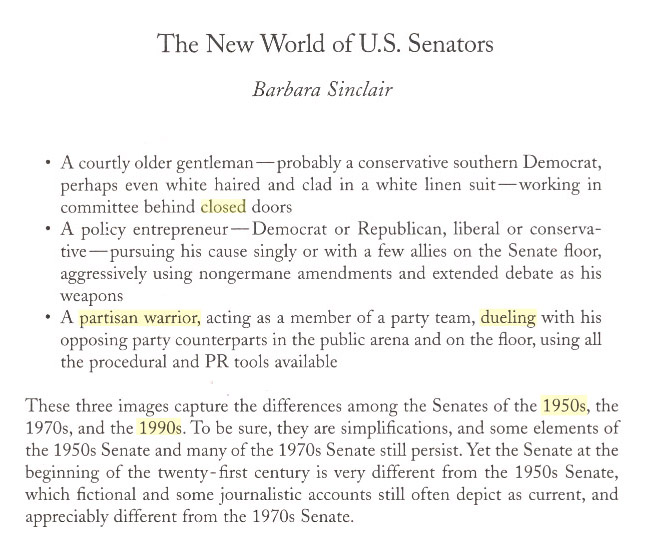
Barbara Sinclair 2013 - Closed Doors vs. Partisanship

Barbara Sinclair 2013 - Closed Doors vs. Partisanship
Private discussions and meetings offer lawmakers a “sanctuary” where their opinions and ideas can be raised and vigorously debated without concern about outside political repercussions. Members recognize the value of confidential discussions: they can learn about complex issues, ask questions, and advance opinions and judgments that conflict with status quo preferences – all without worry about being subjected to interest group-sponsored attack ads in their state or district or castigated by various print and media commentators for even considering a deviation from the party line.Walter Oleszek 2011
Congressional Lawmaking: A Perspective On Secrecy and Transparency
The broad point is that putting together winning coalitions to pass legislation for a nation of more than 300 million people is arduous work. And the practical reality is that much of that work occurs in secret. Away from the spotlight of the media and the watchful eyes of lobbyists, it is usually easier for opposing sides to reach agreements that each views as “win/win” rather than “win/lose.” Regularly, lawmakers – party and committee leaders, minority party members, rank-and-file legislators – participate in closed negotiating sessions to discuss ways to accomplish their policy and political objectives. Closed-door meetings and discussions are sometimes the only way for lawmakers to find the common ground necessary to create national policies. As one lawmaker stated, “What is representative democracy about if it does not entail the accommodation of different points of view?”Walter Oleszek 2011
Congressional Lawmaking: A Perspective On Secrecy and Transparency
The inhibitions commonly associated with open meetings appear to have several effects. Among the more important of them [is] to contribute to divisiveness among the membership by making the attainment of a consensus more difficult; and to limit the exchange of views.David M. Welborn, William Lyons & Larry Thomas 1984
Effects of the Federal Government in the Sunshine Act
In some agencies it is reported that members can and do alter positions in open meetings as a result of what is said there and may adjust stances to facilitate accommodation of contrasting views. But there are counter pressures in support of the maintenance of a position after it is announced, even if there is an inclination to alter it. They include an unwillingness to appear weak, indecisive, or unprincipled.David M. Welborn, William Lyons & Larry Thomas 1984
Effects of the Federal Government in the Sunshine Act
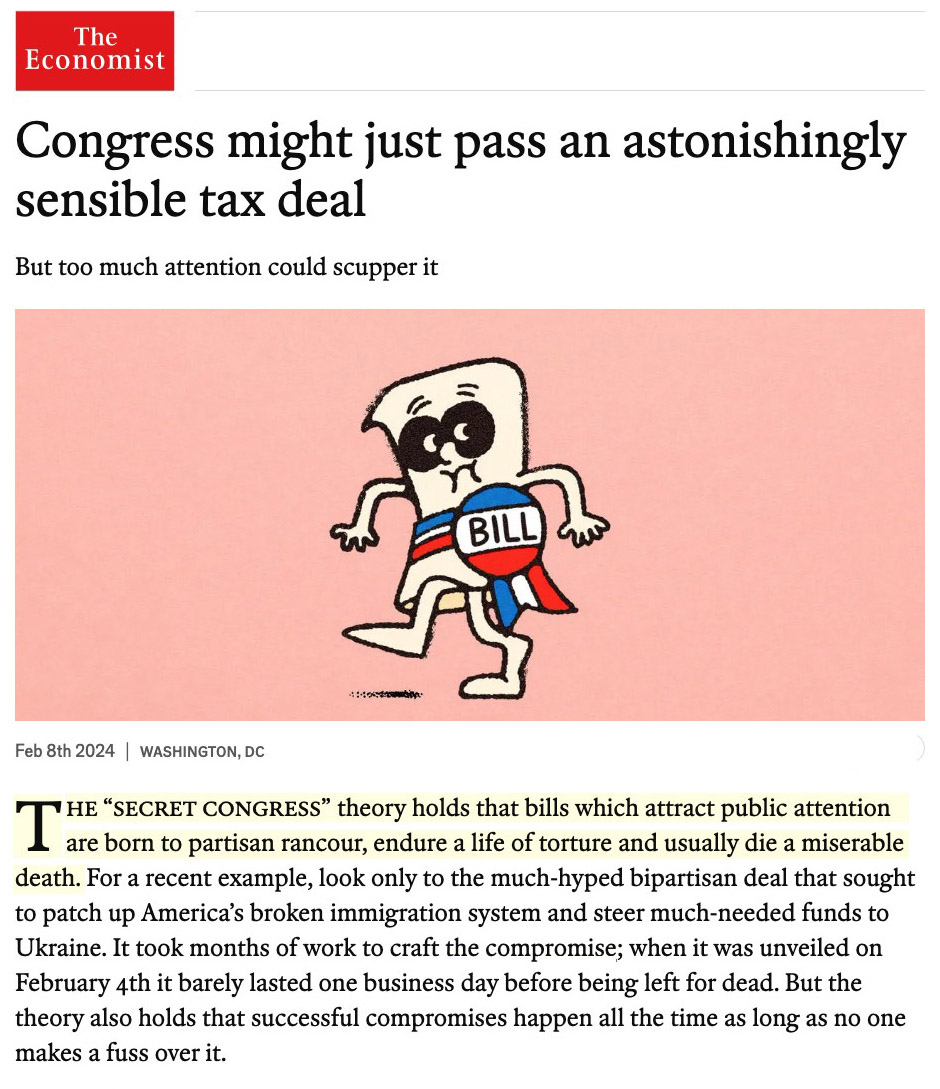
Economist 2024 - Congress might just pass an astonishingly sensible tax deal

Economist 2024 - Congress might just pass an astonishingly sensible tax deal
The “secret congress” theory holds that bills which attract public attention are born to partisan rancour, endure a life of torture and usually die a miserable death. For a recent example, look only to the much-hyped bipartisan deal that sought to patch up America’s broken immigration system and steer much-needed funds to Ukraine. It took months of work to craft the compromise; when it was unveiled on February 4th it barely lasted one business day before being left for dead. But the theory also holds that successful compromises happen all the time as long as no one makes a fuss over it.Economist 2024
Congress might just pass an astonishingly sensible tax deal
The cost that is clearest and most generally felt [of the increased sunshine] is impairment of collegial decision-making processes, a consequence noted even by many respondents generally favorable to the sunshine law, in addition to those less positive in their attitudes. Indications are found in the increased use of notation voting, observed differences in member behavior in open and closed meetings and in open and pre-sunshine meetings, the tendency of members to come to open meetings with their minds made up to a greater degree than in the case of closed or pre-sunshine meetings, the incidence of staff assistant and other types of meetings not covered by the law, and the limits members experience in asserting their collective prerogatives and meeting their collective responsibility for agency leadership.David M. Welborn, William Lyons & Larry Thomas 1984
Effects of the Federal Government in the Sunshine Act
Secrecy ... enables Congress to mute pressures emerging from both parties’ activist bases. In contrast, the behind-the-scenes negotiations ... help negotiators come to agreements. Secrecy can allow negotiators to explore opportunities, float ideas, and manage sensitive issues with confidence...James Curry & Frances Lee 2019
Can America Govern Itself?
In this instance, four Democrats and four Republicans — the “Gang of Eight” — closed the door for several months in order to hammer out a deal that gave Democrats what they wanted, gave Republicans what they wanted, and both sides gave up a little.Sarah Binder 2017
Secret dealmaking and the GOP health care bill
IA generation ago, even before Watergate, Congress and the president enacted a number of “sunshine” reforms so citizens could follow the legislative process far more easily. In particular, Congress in 1970 put in new rules that made it harder for committee chairs to close hearings to the public, put individual lawmakers’ votes on the record immediately for public review and generally adopted more transparent procedures. Since then, rising ideological and partisan conflict has pushed congressional leaders back toward opacity.Sarah Binder 2017
Yes, Mitch McConnell’s secretive lawmaking is really unusual — in these 4 ways
After the Under the bonhomie and the backslapping, however, behind those tall doors where nine men met seemingly as friends, developments were taking place that would have deep significance for the party, for the Senate, and, it would turn out, for the United States. Lyndon Johnson’s Democratic Policy Committee was not reconciling but ignoring conflicts among Democrats, not clarifying party policy but blurring it. The committee was being turned into a device to discourage the discussion of issues. Liberals were angered by that turn, as Bobby Baker was to say. They “saw the Democratic Policy Committee as Johnson’s private rubber stamp—which it was—and they accused LBJ of using the [committee] as a ploy to place on the back burner those bills he did not want called up. They were not entirely wrong. ‘I don’t see any profit,’ LBJ told me, ‘in calling up bills so that Jim Eastland and Herbert Lehman can insult each other, or so that Paul Douglas and Albert Gore can exercise their lungs. Why should we cut ourselves up and then lose …?’” And it was a very effective device. Democratic Party councils—notably, the caucus—and the Democratic side of the Senate floor had always been platforms for the liberals’ demand for social justice, for social change, for the calls for equality from Douglas and Humphrey and Lehman. There were no liberal orators on the Democratic Policy Committee. Of the many impressive liberal senatorial voices in the party, not one was on the committee that enunciated the party’s policy. Room G-18 was an ideal place in which to kill an issue quietly; behind its closed doors there was no voice to keep the issue alive. As a result, the Democratic Party now appeared far more unified than it had in the recent past, Robert A. Caro 2002
Master of the Senate - The Years of Lyndon B. Johnson LBJ
Arguing geared to a reasoned consensus is more likely in private in camera settings and behind closed doors given the considerable risks, which actors face when they expose their interests or even identities to arguing (Jeffrey Checkel 1999). Thus, arguing in front of a public would rarely result in a true dialogue, but more likely lead to ritualistic rhetoric and purely strategic reasoning… private in camera settings during negotiations work particularly well in cases of what game theory calls ‘mixed motive games,’ that is, instances in which actors hold fixed preferences to maximize their egoistic interests, but would also prefer mutual cooperation under specific circumstances. In such instances institutionalized ‘in camera settings’ such as the ‘confession talks’ during European Council summits allow actors to explore potential compromises, to seek out the justifiability of their interests, and the like. These settings allow for arguing and persuasion, because negotiators do not have to stick to their fixed preferences behind closed doors and are allowed to ‘think out aloud’ about possible negotiating solutions… We found many instances, where controversial passages in drafted papers were negotiated within a smaller group of negotiators behind closed doors… In moments like these, arguing behind closed doors and ‘in private’ permits skilled diplomats to go beyond their instructions and to explore possibilities for compromise.Cornelia Ulbert & Thomas Risse 2005
Deliberately Changing the Discourse: What Does Make Arguing Effective?
After the introduction of the secret ballot in 1872, it became impossible to determine who was a bona fide party supporter.Jon Lawrence 2009
Electing Our Masters: The Hustings in British Politics from H
The research for this report was based on direct participatory observation of negotiating sessions, closed ministerial-level meetings, and secret bilateral consultations during the conference. There are compelling reasons why few scholars who serve on government delegations choose to publish their observations: disclosing politically sensitive information may compromise one’s position and future prospects for participation.Radoslav S. Dimitrov 2016
The Paris Agreement on Climate Change: Behind Closed Doors
[The goal of the 1970 sunshine reforms] was to improve the chances for enacting into law policies favored by a majority of Democrats. The approach was to make people who held power through the party-headers, committee and subcommittee chairs responsible to the majority of that party, and to facilitate moving party supported measures through the legislative process. All three tracks of these reforms were proposed by the same set of people – the DSG leadership – and they made no secret of the policy motivations behind their actions. The DSG staff studies made clear that the reformers’ target was the opposition to party policies by conservative Democrats who had disproportionate power through seniority and the committee system.David Rohde 1991
Parties and Leaders in the Postreform House
Talk about a good vote counter, Carl Hayden was one of the best. When he knew that a piece of social legislation didn’t have the votes, he’d occasionally vote with his southern friends. So he looked a little like a conservative, and he might be even a little prejudiced on a Civil Rights issue for instance, but he knew it wasn't going anywhere, so he would vote along and build up brownie points that way. It used to frustrate a lot of my Republican friends out in Arizona—here was this man who probably voted for every aggressive piece of social legislation that was ever enacted into law, and then he had this reputation of being a conservative. One of the reasons is that over the years, because he was such a good vote counter, and knew that it wasn’t timely even if they were making a little progress, he would vote with his southern friends.Roy L. Elson 1990
Bobby Baker and the Senate
SENATOR WITEK: We are the Legislature of the State of Nebraska. I want you to remember that at all times and I hope that you will... 24 of you at least will see it the way that I do and vote to disband the secret ballot here. I know Senator Robinson jokingly said that if this amendment passes, he would have to come in with another amendment to say, leave your guns at the door. SENATOR DON WESELY: Thank you. Mr Speaker, members, although I appreciate Senator Witek’s sincerity on this, I must rise in opposition to this motion. There’s a number of reasons why we go to secret ballot in electing our leadership. One of those we need to recognize, and I don’t think it was mentioned by Senator Witek, but we are the only nonpartisan Legislature in the country, so we don’t have the party line drawn down here in this Legislature. And we try to, I think, adhere to that concept of nonpartisanship as much as possible. I think that if you go to an open ballot, we will destroy some of that effort to be nonpartisan. I think that is a change that would be detrimental to the body.Senators Kate Witek & Don Wesely 1995
Proceedings of Nebraska State Legislature
We have a much more wide-open process here as a nonpartisan Legislature. Seniority doesn’t play a whole big role, party doesn’t play a role. And all of that seems to me to indicate that we need to have the ability to work together in whatever fashion we can and a secret ballot facilitates people, I think, joining hands and working together that might not otherwise be able to do so.Senator Don Wesely 1995
Proceedings of Nebraska State Legislature
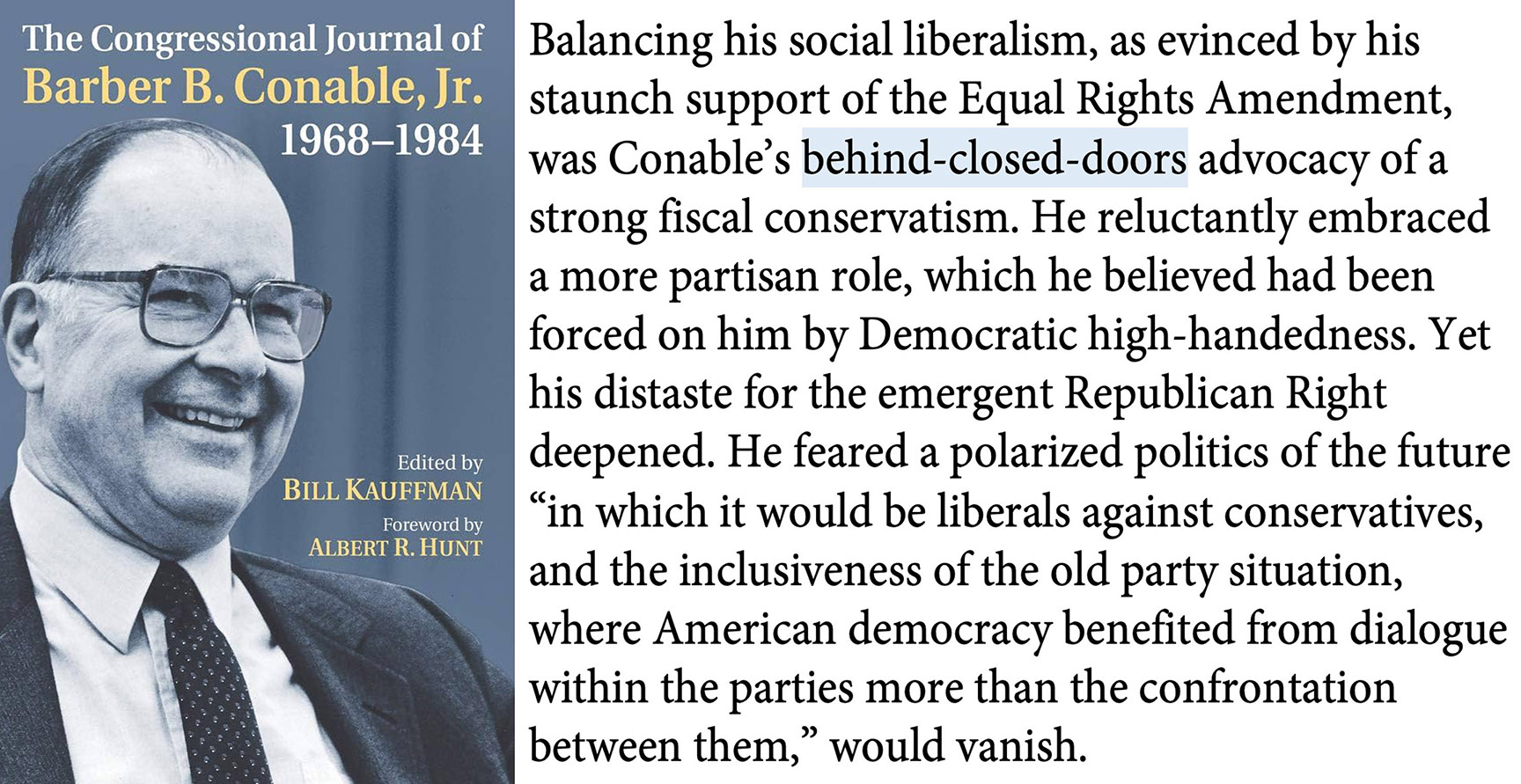
Barber B. Conable, Jr 2004 - Sunshine Drives Partisanship
TEXT: Balancing his social liberalism, as evinced by his staunch support of the Equal Rights Amendment, was Conable’s behind-closed-doors advocacy of a strong fiscal conservatism. He reluctantly embraced a more partisan role, which he believed had been forced on him by Democratic high-handedness. Yet his distaste for the emergent Republican Right deepened. He feared a polarized politics of the future “in which it would be liberals against conservatives, and the inclusiveness of the old party situation, where American democracy benefited from dialogue within the parties more than the confrontation between them,” would vanish.

Barber B. Conable, Jr 2004 - Sunshine Drives Partisanship
It was...best for the convention for forming the Constitution to sit with closed doors, because opinions were so various and at first so crude that it was necessary they should be long debated before any uniform system of opinion could be formed. Meantime the minds of the members were changing, and much was to be gained by a yielding and accommodating spirit. Had the members committed themselves publicly at first, they would have afterwards supposed consistency required them to maintain their ground.James Madison 1830
Records of Federal Convention
The real world of politics suggests that there is no unitary core of deliberation in representative politics. Consider a comparison of deliberative behavior under the public eye and behind closed doors: public debates in parliament increase justification rationality but decrease respect, while nonpublic debates increase respect but decrease justification rationality. From the perspective of old deliberation, which implies the compatibility of all the elements of good deliberation, this juxtaposition might cast doubt on the validity of the empirical findings. One might be forced to assume that political behavior under the public eye was only deliberative rhetoric, in which the pressures of publicity force the actors to produce justifications that they do not sincerely believe. Because the norms of public debate in Western democracies generally value reasoned argument but not explicit respect for the political opponent, strategic actors will use strategies that mix justification and disrespect.André Bächtiger & Simon Beste 2017
Deliberative Citizens, (Non)Deliberative Politicians: A Rejoinder
In Goffmanesque vocabulary, these deliberative democracy scholars find that “when playing for an audience of citizens, legislators in a competitive system know that there is much to gain by discrediting one’s opponents and little to gain from praising them” (Steiner, Bächtiger, Spӧrndli, & Steenbergen, 2005: 130). In the glare of transparency, arguments may “become shallow, poorly reasoned, pandering, or appeal to the worst that we have in common. Indeed, some have traced the deterioration in the quality of dialogue, and increase in gridlock, in the United States Congress to the introduction of always-on C-SPAN2 cameras” (Weisman, 2012). The question now is: “when does the desire to please an audience lead to ‘well-crafted’ arguments and when does it lead to ‘rhetoric, demagoguery, and overbidding’” (Chambers, 2005: 260)?Ethan S. Bernstein 2017
Making Transparency Transparent
[T]ransparency entails tradeoffs, imposing direct costs on successful dealmaking. This is especially true given today’s exceptionally polarized and competitive political parties and given the information environment in which lawmakers work. …greater public attention to Congress today combined with polarized parties increases the incentives of lawmakers to adhere to party messages. Such partisan constraints on lawmakers are rarely conducive to setting aside differences and negotiating a deal. Bass et. al. also argue that “backroom wheeling and dealing is just as possible now as it ever was.” We suspect that the opposite is true. Pressures on politicians are more immediate and intense than they were in the past. That makes it harder (though surely not impossible) for lawmakers to engage with each other directly, especially across party lines. And as we argue, such interactions out of the public eye are critical for crafting integrative policy deals, agreements in which the negotiating coalitions care unequally about different parts of the deal.Sarah Binder 2014
The Limits of Legislative Transparency
One former senator I know, who has decried the deterioration of comity in Congress, noted that the most pleasurable moments of his career were spent on the intelligence committee, whose secrecy allowed members to say for once what they honestly believed. Francis Fukuyama 2015
Why Transparency Can Be a Dirty Word
As stated, “Party and institutional leaders in the House, as well as other especially articulate or telegenic Members, might be encouraged by fellow Members to assume highly visible roles on the House floor, to focus public attention on issues and party positions.” The final effect predicted by the CRS related to partisan problems that might occur if House members became active distributors of their floor speech recordings. This is not to say that House television could not be used in other ‘creative’ ways to achieve partisan objectives. In fact, its potential in this respect has already been exploited. The House has two unique vehicles for partisan floor speeches that are especially directed to television viewers. One is the “morning hour” where one-minute speeches,” as they are called, are delivered by House members speaking on their choice of subjects. Whereas one-minute speeches are scheduled prior to convening the House for regular daily business, a “special order” period is reserved following the close of House business for individual speeches of longer duration (up to an hour) on any subject. A comparison of figures from 1977 (two years before House television began) with figures from 1981 (two years after House television) showed that the number of one-minute speeches had tripled during the period.
Shortly after television had entered the House chamber, Democrats found themselves on the receiving end of a daily barrage of Republican verbal jabs during the morning hour and special order periods. One House Democrat, in reference to the practice, complained that the periods were being used “to bludgeon us to death each day on nationwide TV.” The bludgeoning was especially painful considering that not only were viewers of House proceedings exposed to the speeches, but television networks could also record them, particularly the short morning hour speeches, for airing during evening newscasts.
What House Democrats saw as an abuse of the morning hour came to a head in July 1980 when House Majority Leader Jim Wright, at the urging of his fellow Democrats, announced that hereafter the one-minute speeches would be delivered only at the end of the clay. Wright defended his action as necessary for the House to complete its official legislative business. The action and its defense were entirely unacceptable to Republicans who charged that the Majority Leader had “gagged” them. After several days of verbal wrangling over the matter, Representative Wright reversed himself and allowed the morning hour speeches to resume. It may have been just as well that Wright acquiesced to Republican demands, for Democrats were soon to find the morning hour speeches a convenient way of chiding Republican President Ronald Reagan. This seemed to meet with the full approval of House Speaker O’Neill.Ronald Garay 1984
Congressional Television
We focus on the dynamics of representation that emerged out of the 1970 Legislative Reorganization Act. On balance these moves toward transparency have had tremendously negative consequences. Consistent with the theory, increases in transparency were followed by increased narrow-interest lobbying, wasteful and pernicious legislative gamesmanship, increased partisanship, and more.David King (Harvard) 2017
MPSA submission abstract
On votes that receive attention on the floor, party leaders should stake out an early position to make the “official” party position clear to their caucus. That is, party leaders will send a clear signal about the vote choice of other party members. Senators will seek this type of information because partisanship is strongly predictive of a “correct” vote for most members of Congress (at least some of the time).Janet Box-Steffensmeier 2015
Examining Legislative Cue-Taking in the US Senate
Cox & Kousser (1981) examine the consequences of the adoption of the secret ballot in the state of New York during the period between 1879 and 1900 and find that this change in electoral law contributed to a change in the strategies pursued by parties. Prior to the adoption of the secret ballot, electoral strategies of parties were “inflationary,” attempting to increase voter turnout. After the secret ballot reform, the strategies of parties were “deflationary” and consisted of efforts to convince voters to stay home on election day.Isabela Mares & Lauren Young 2016
Buying, Expropriating, and Stealing Votes
Trevor: Do you think maybe the court should jump into the era of tv and broadcast what you’re doing? Sonia Sotomayor: No. You walk into our courtrooms and we’re not made for tv, and I think if our arguments were televised, it might change the dynamic, and we’re human beings and the draw to play to tv affects every human being. Trevor: Now that you’ve said that, I feel like no part of the u.s. government should be on TV. Sonia Sotomayor: Actually, that’s what some senator said to me, that the partisanship in the senate started the senate room. those senate rooms now are completely empty. It’s the chair of the senate, it is the senator speaking and some members of his staff. there is no one else in the room but the camera, and they’re speaking to the camera, not to each other. But many senators told me that they felt that much of the collegiality died when they stopped getting together in that room and were forced to listen to each other and were forced to sit next to each other and talk to each other. So I think you said a joke, but some might think it might be a good idea to return to those days.Sonia Sotomayor 2019 (Supreme Court Justice)
The Trevor Noah Show
[In the days before the secret ballot] an election could not take place without party action. Parties printed up the ballots, or tickets, as they were called, and distributed them. There was nothing particularly secret about the ballots; while a few citizens might prepare their votes at home, “vest-pocket voters” were few. Most people gave away their preference by approaching the party agents peddling tickets to any comers and sometimes calling over those on whose vote they counted. Sometimes voters marched to the polls in brigade formation, under ward leaders, and now and then managers provided a brass band, a barbecue, or refreshments. Election judges were chosen by the parties, and so were the poll watchers, who scrutinized the lists and challenged suspicious-looking voters. Ballots were designed to make maverick voting difficult.Mark Wahlgren Summers 2010
Party Games: Getting, Keeping, and Using Power in Gilded Age PoliticsNote: Just like with legislators today, parties and powerful groups would monitor the votes of citizens, punishing those who stepped from the party line. So the dynamic is the same, just a differing pressure point. Today parties pressure legislators because only their votes are public.
The kinds of public scrutiny to which the Senate has been subjected in recent years are familiar. Political action committees, increased roll-call voting and open meetings are only a few of them. Most senators seem to agree that all these developments have made negotiation and political self-sacrifice infinitely more difficult. Open meetings are singled out most often. “There was an enormous give-and-take,” Pearson says of the old closed-door committee system. "People could change their minds as a result of hard bargaining and deliberation. But nobody wants to admit in public that he was wrong.”Alan Ehrenhalt 1982
CQ – Team Spirit of Days Gone By Evades the Senate
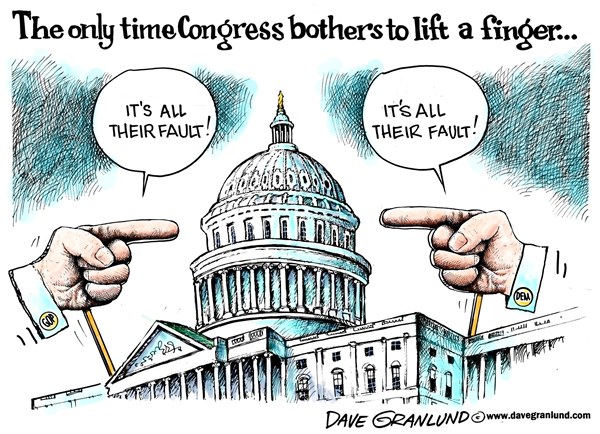
Dave Granlund 2017

Dave Granlund 2017
Full public insight (transparency) into the decision-making process involves potential efficiency costs such as decision makers becoming less willing to agree on compromises, and it increases the risk that people become disappointed regarding the conditions under which decision making takes place.Jenny de Fine Licht 2014
Magic Wand or Pandora´s Box? How transparency affects public perceptions of legitimacy
Why has government been instituted at all? Because the passions of men will not conform to the dictates of reason and justice, without constraint. Has it been found that bodies of men act with more rectitude or greater disinterestedness than individuals? The contrary of this has been inferred by all accurate observers of the conduct of mankind; and the inference is founded upon obvious reasons. Regard to reputation, has a less active influence, when the infamy of a bad action is to be divided among a number, than when it is to fall singly upon one. A spirit of faction, which is apt to mingle its poison in the deliberations of all bodies of men, will often hurry the persons, of whom they are composed, into improprieties and excesses, for which they would blush in a private capacity.Alexander Hamilton 1788
The Federalist Papers #15
Procedures that de-emphasize overt conflicts among competing programs also encourage secret deliberations, non-partisanship, and the recruitment of personnel who feel comfortable in sidestepping policy decisions most of the time. The prospects for agreement within the House Appropriations Committee are enhanced by closed hearings and mark-up sessions, and by a tradition against publicity. Were deliberations to take place in public — "open covenants openly arrived at" — committee members might find themselves accused of "selling out" as they made concessions. Willingness to compromise, to be flexible, is a quality sought in choosing members to serve on the appropriations committees. Party ties might be disruptive of agreement if they focused attention on the policy differences between the two political persuasions. Instead, party differences are submerged during committee deliberations. Thus the usual process of taking something from a program here, adding to a program there, swapping this for that, can go on at the committee stage without having to take the kind of "yes" or "no" party positions that may be required at the voting stage on the floor.Wildavsky, Aaron B 1964, 1974
The Politics of the Budgetary Process
Interest groups, empowered by transparency, pressure members to follow the party line.James D’Angelo & Brent Ranalli 2019
The Dark Side of Sunlight (Foreign Affairs Magazine)
Transparency has exacerbated partisanship in other ways, too. Legislators tend to be more civil and collegial when meeting in private and more willing to engage in the give-and-take that can lead to win-win solutions. In the presence of an audience, by contrast, they tend to grandstand and take hard-line positions. In the words of Robert Luce, a twentieth-century Republican congressman from Massachusetts who wrote a manual on legislative procedure, “Behind closed doors compromise is possible; before spectators it is difficult.”James D’Angelo & Brent Ranalli 2019
The Dark Side of Sunlight (Foreign Affairs Magazine)
There are many loyal men in the southern States, who to avoid martyrdom, conceal their opinions. They are to be pitied—not severely censured.John H. Aughey 1863
The Iron Furnace
The national policy agenda may well be tied to the incentives of party leaders to take roll call votes on the very issues that divide the parties. (For example) In 2007, Democrats sought to embarrass the Bush Administration through oversight hearings that did not seek to shift power away from the President to the Congress.Neal Devins 2011
Party Polarization and Congressional Committee Consideration of Constitutional Questions
When Congress is relatively nonconflictual (such as after September 11, 2001), its popularity soars; when partisan or other infighting is visible (impeachment), its popularity drops (see Durr, Gilmour, and Wolbrecht 1997).John Hibbing & Elizabeth Theiss-Morse 2004
Stealth Democracy
Committee hearings may be conducted privately or be open to the public. The choice carries major implications for oversight. Private (closed) hearings have the potential to increase intra-party and inter-party cooperation, and minimize government embarrassment. Hearings held out of public view may foster substantive policy changes over political competition.John Whaley & Susan Benda 2000
Strengthening Legislative Capacity
The [Sunshine Act] stifles spontaneity, informality and flexibility. It suffocates the free, open and uninhibited exchange of ideas within a collegial body that promotes sound decision-making – the very purpose of providing for a collegial body, rather than a single head, to run the agency.Bevis Longstreth 1983
A Little Shade, Please
Leadership often has incentives to place issues up for votes that are expected to divide the parties, with their party coming out on the winning side.Laurel Harbridge 2010
Congressional Agenda Control and Decline of Bipartisanship
One would expect that Committee unity would be less evident and Committee partisanship more evident on a roll-call vote than on any other floor decision. To the degree that this is so, the evidence on unity and partisanship which one gets from roll-call vote analysis is of limited usefulness.Richard Fenno 1966
Power of the Purse
In view of the fact that partisanship is the most divisive force inside the Committee and inside the House generally, the analysis of Committee unity and the analysis of Committee partisanship must proceed together. Characteristically, analyses of Committee and party action on the floor of the House have drawn their empirical evidence from roll-call votes. The advantage of the roll call is that most Members’ decisions are recorded in unequivocal “yes or no” fashion. And roll calls usually decide important controversies. One limitation of an exclusive reliance on roll-call voting is that a great number of floor decisions cannot be examined. Decisions which do not involve a roll call—such as a close teller vote on which the Appropriations Committee prevails in the Committee of the Whole—may be just as significant as decisions which result in yea and nay votes.
Another limitation arises from the fact that a roll call vote is a special kind of decision which occurs in a special context. It is once the most public and the most oversimplified decision taken in the Appropriations process. It forces participation as no other decision does. Most House members will remain silent on amendments which do not come to a roll call. So will most Appropriations Committee members. Silence protects Committee members against partisanship. On a roll call, however, publicity, participation, and partisanship increase. Predictably the roll call vote is the point at which any conflict, if there is one, between Committee unity and party loyalty will be most acute. To put it another way, one would expect that Committee unity would be less evident and floor partisanship more evident on a roll-call vote than on any other decision. To the degree that such is so, the evidence of Committee unity and partisanship which one gets from roll-call vote analysis is of limited usefulness.
Supplementary evidence of any sort is hard to come by—and none of it is as reliable as a roll-call vote. What has to be done, however, is to record all the support and all the opposition to each of the $47 money amendments as revealed by speeches recorded in the Congressional Record. Most of the hazards of such an undertaking have been mentioned, among them the incompleteness and possible falsity of the printed word. On all non-roll-call amendments, Committee unity and disunity must be inferred from the written record. For example, where one Committee member speaks in opposition to an amendment and the opposition to the amendment remains silent, the Committee will be described as united in opposition to the amendment in question. And, should two members be in open disagreement, the Committee will be described as split. These are long inferential leaps. But they can be rationalized, quite apart from the simple argument that we must make the best of what data are available. When Committee members feel strongly about an amendment, they normally speak up. And their silence usually signals concurrence in the position being taken by the Committee spokesman. Though their position might be different if they were (forced to) a roll-call vote, most members are willing to support their leadership during the less public actions of floor action. Admittedly, we are dealing with rather crude and “soft” data, and from it, therefore, we shall draw appropriately crude and “soft” generalizations.Richard Fenno 1966
Power of the Purse
Two explanations for the low degree of Committee unity on roll calls come to mind. One is that the special context of roll-call voting brings new kinds of pressures to bear on Committee members—pressures that are highly disruptive of the Committee's internal unity. This external pressures model assumes that unity is achieved within the subcommittee and that a somewhat looser unity is maintained in the full Committee. In the context of floor action, for all the reasons previously discussed, Committee unity becomes more difficult to maintain. Oftentimes, the Committee sticks together on the floor only because some of its members remain silent. When, however, Committee members are pushed to a public yes or no type of decision, they respond to extra-Committee pressures—from party leaders, constituency groups, or House colleagues. At that point, the Committee is about as unified or as disunified as any other party or sectional or informal grouping in the chamber. According to this model, at each stage of appropriations decision-making—subcommittee, full Committee, Committee of the Whole, roll call—the context changes. And with each change it becomes increasingly difficult to maintain Committee unity. It is most easily maintained in the well-integrated subcommittee, and it is put under severest strain in roll-call voting. Hence, evidence of Committee disunity during roll-call voting should come as no surprise. Indeed, the wonder may be that the Committee continues to display as much cohesion as it does.Richard Fenno 1966
Power of the Purse
If we revert to closed committees, partisan anger will slowly revert to pre-1970 levels – the lowest in history. Gotcha votes can be avoided. And a relieved leadership can re-open the amending process.James D’Angelo 2019
Transparency is a weapon that is ruining Congress
With regard to polarization, while one might think that the institutional changes of the past forty years to promote openness in government should logically have reduced opinion polarization, the theoretical model presented here suggests why they may have actually had the opposite effect.David Stasavage 2006
Polarization and Publicity
To appreciate one of the central virtues of secret balloting, consider the fact that in a number of organizations, the leadership, for obvious reasons, insists that the preferences and opinions of the rank and file be revealed through a hand count instead of a secret ballot. Transparency, in that case, is of way of controlling the membership.Albert Breton 2007
The Economics of Transparency in Politics
By fighting for the secret ballot… it would be the only way, he warned, to “check the arrogance of corrupt partisan organization.”Puck Magazine 1884
Holding the Tiger - The Gilded Age
Effective government in democratic societies involves two oft competing incentives: successfully campaigning to win office on the basis of grand promises and officeholders’ ability to compromise to achieve meaningful legislative goals. At times, these come into conflict, requiring trade-offs. Politicians must compromise their stated campaign platforms in order to achieve wider political objectives. As Otto von Bismark once quipped, “Politics is the art of the possible, the attainable – the art of the next best.” When making difficult compromises, it behooves all parties to have them occur in committee, behind closed doors. Not doing so runs the risk of having compromising parties labeled as “traitors” or “sellouts.” The consequences of this may seem frivolous, but they could be dire. In the future, individuals who are excoriated by constituents are likely to avoid making concessions to enact meaningful policy, regardless of the success or failure of the policy itself.Edward Hearn 2020
How Much Transparency Is Too Much?
Polarization is a cost of many of these good government reforms. It is almost an intended cost if you think about it... Transparency, open meetings, bans on earmarks, and weaker party machines make compromise more difficult.Nathaniel Persily 2014
Would Stronger Parties Mean Less Polarization?
The “C-SPAN Effect” can encourage political posturing over genuine debate and a search for solutions. Using the C-SPAN model, more and more state and local governments are making more and more public hearings and meetings available over the public airwaves or over the Internet. Inviting this kind of public scrutiny would certainly seem to promote accountability. But it also can promote demagoguery over problem-solving, and it increases the chance that hearings or legislative sessions will devolve into partisan speechmaking. I can testify (anecdotally, to be sure) from my five years as a congressional staffer that there is a marked difference between the behavior of members of Congress in hearings depending on whether the cameras are on or not.Philip Joyce 2015
The Dark Side of Government in the Sunshine
House Democratic Leader Nancy Pelosi of California showed that she has learned from former House Majority Leader Tom DeLay of Texas and other GOP practitioners of strong-arm tactics to keep her caucus aligned. So serious have Democrats become about catching up — both at the ballot box and in party discipline — that in mid-December, Pelosi lambasted Edolphus Towns of New York for being absent during a crucial roll call on the spending cut bill that Republicans won by two votes. Pelosi threatened to yank Towns' seat on the Energy and Commerce Committee, which would ordinarily be a high price to pay for a single missed roll call. But Towns was a repeat offender in Pelosi's book, having helped the opposition by voting in favor of the Central American trade pact in July. Then, as well, the GOP had prevailed by two votes.Congressional Quarterly 2005
House Democrats Reach Record Unity
Many of us have a reflexive belief that open political processes are more accountable, but we don't often ask “accountable to who”? It's easy to assume that the accountability is to a broader public interest. But in practice, transparency means that focused special interests can keep tabs on each proposal. If the special interests object, they can whip up a storm of protests. They also can threaten attempts at compromise, and push instead toward holding hard lines and party lines. Greater openness means a greater ability to monitor, to pressure, and to punish possible and perceived deviations.Timothy Taylor 2019
When Special Interests Play in the Sunlight
Lindsey Graham was pissed. The whole thing was “crap,” “a charade” and “despicable,” the South Carolina Republican said. By the fifth day of Senate hearings for Supreme Court nominee Brett Kavanaugh, Graham was done with Democrats harping on what he considered to be a slanderous sexual assault allegation. “This is the most unethical sham since I’ve been in politics,” Graham said, pointing a finger across the dais of the Judiciary Committee. The clip went viral. Fox News ate it up. And for Graham, the soundbites paid off handsomely. During the next month, his campaign received $319,000 in large donations (more than $200) – or five times what he raised the previous month. More than 80 percent of the money came from people outside Graham’s home state. For the senator, who’s seeking a fourth term next year, the takeaway is clear: Full-throated histrionics, when broadcast live for millions and replayed for days on cable news, can turn into easy money. But for those focused on how Congress is stymied by partisanship and consumed by fundraising, the moment delivered this counterintuitive message: While putting Congress on TV has brought transparency to the legislative process, it has also created a prime venue for the sort of grandstanding that galvanizes a political base, divides a country and raises a whole lot of money.Geoff West 2019
Cameras as Cash Machines
When strictly enforced, open meeting laws encourage rigid posturing rather than negotiation and compromise. If a public official announces a position in public, and then later changes his or her position in the interests of compromise, that official can be accused of inconsistency, hypocrisy or opportunism.Bruce Cain 2016
Is our government too open?
The incapacity to govern in the face of an urgent need to do so is a problem that deserves our attention. Staying private [working behind closd-doors, in secret, in smoke-filled rooms] will not solve all the problems resulting from our polarized politics. In some instances, however, it can increase the chances of bridging the polarization gap and reaching essential compromises on public policyGeorge C. Edwards 2015
Staying Private - Solutions to Polarization (Persily)
It is no secret that negotiations are best done in private. James Madison remembered that, in writing the Constitution [and] the same principles of successful negotiation hold more than two centuries later. [This was evident in the] quiet negotiations to produce important legislation include the Clean Air Act Amendments of 1990, the budget agreement of 1990, and the No Child Left Behind Act of 2001… Unlike the political posturing in late 1995 and early 1996, neither side focused on moving the negotiations into the public arena. Staying private made it easier for both sides to compromise, and they each gained from doing so.George C. Edwards 2015
Solutions to Polarization (Persily)
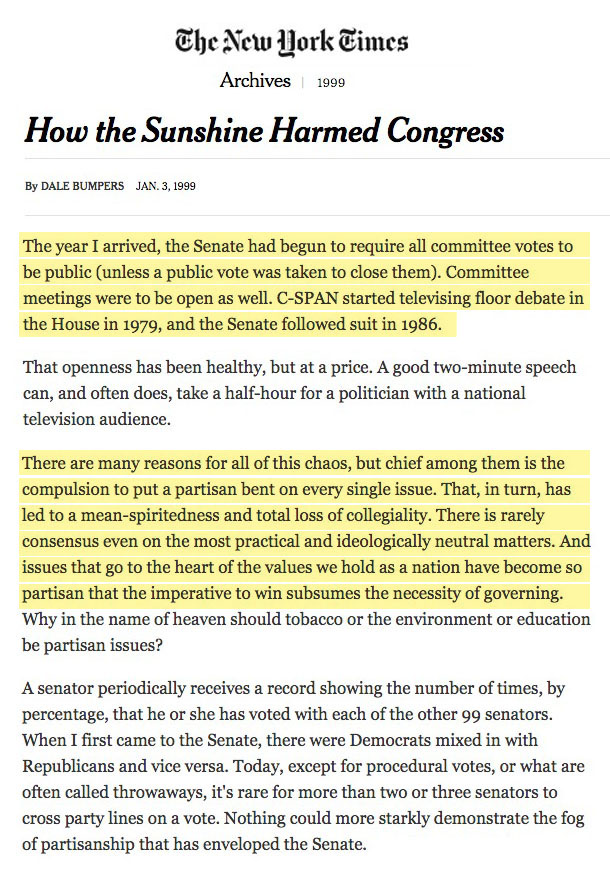
Senator Dale Bumpers 1999 NY Times

Senator Dale Bumpers 1999 NY Times
Decision makers used to voice their disagreement more frequently when they knew their votes would not be published.Stephanie Novak 2015
Secrecy and Publicity
Members of the House Select Committee on the Modernization of Congress seem universally disgusted by the cameras’ impact, specifically how they’ve been weaponized for made-for-TV partisanship now feeding a divided country and 24-hour news cycle. The panel’s hearing in March devolved into personal tales of camera-bashing. John Lawrence, a former chief of staff to Speaker Nancy Pelosi, said the decision four decades ago to open Congress to the cameras created the “unintended consequence” of fueling partisanship. Geoff West 2019
Cameras as Cash Machines
The publication of votes – which was supposed to increase the accountability - actually became an additional incentive for opponents to silence themselves and join the majority.Stephanie Novak 2015
Secrecy and Publicity
Malesky, Schuler, and Tran (2010) present evidence from an authoritarian setting, the Vietnamese National Assembly, that transparency fosters conformity during deliberations and may therefore discourage the transmission of valuable information among lawmakers.John M. Carey 2013
Transparency and Legislative Behavior
Transparency can produce worse public policy outcomes than non-transparency, and foster polarization among representatives that prevents citizens from learning through observation of the policy-making process. Transparency’s key liability is that legislators may possess – or be in a position to acquire – a better understanding of policy problems, and of proposed solutions, than do their constituents but fail to deploy that knowledge when doing so in the limelight could damage their reputations as faithful representatives. John M. Carey 2013
Transparency and Legislative Behavior
The higher the exposure to transparency, the more likely a delegate was to behave in a conformist manner. Moreover, treated delegates who did not conform were the most likely to be punished through removal from office in the next election or a lack of promotion to higher office.Edmund Malesky, Paul Schuler & Ahn Tran 2010
The Adverse Effects of Sunshine
We develop a model of vote trading [available only if the votes are public]. …Although games of distributive politics resulted in minimum winning coalitions, the electoral need to bring benefits back to the district and fear of being left out of the minimal coalition could cause politicians ex-ante to prefer universalistic coalitions [parties]. As such, politicians would have an incentive to set up “norms of universalism” [party discipline] enforced, perhaps, by punishment for not going along with the all-inclusive logroll.Clifford J. Carrubba & Craig Volden 2000
Coalitional Politics and Logrolling in Legislative Institutions
On Oct. 22, 2014 the Earth Institute hosted a panel discussion on the Origins of Environmental Law, featuring Leon Billings and Thomas Jorling, the two senior majority and minority staff members who led the Senate Subcommittee on Environmental Pollution which originated and developed the 1970s Clean Air Act, Clean Water Act, and other major environmental legislation... Jorling discussed the importance of the closed markup session – in the 1970s, laws were written behind closed doors, resulting in a high degree of cooperation. Senators were free to ask questions and discuss issues openly without fear of scrutiny from others. This created a lawmaking process built on “understanding, education and learning that members actively engaged in.” Today, the open session process in lawmaking makes for better theater than an actual practice of understanding.Haley Martinez 2014
An Evening with the Writers of the Clean Air Act: Insight into the ‘Golden Age’ of Environmental/Climate Law
Where comity is being achieved in the current political environment it’s being achieved behind closed doors not in open session.Leon Billings & Tom Jorling 2014
Interview on 1970 Clean Air Act - Benefits of Closed Door Sessions (Climate)
The only committees where members negotiate are the closed door committees. As soon as the doors are open, everyone hardlines.Senate Legislative Director 2016
Interview
Arguing geared to a reasoned consensus is more likely in private in-camera settings and behind closed doors given the considerable risks which actors face when they expose their interests or even identities to arguing.Cornelia Ulbert, Thomas Risse, Harald Müller 2004
Arguing and Bargaining
Arguing in front of a public would rarely result in a true dialogue, but more likely lead to ritualistic rhetoric and purely strategic arguing.Ulbert, Risse & Müller 2004
Arguing and Bargaining
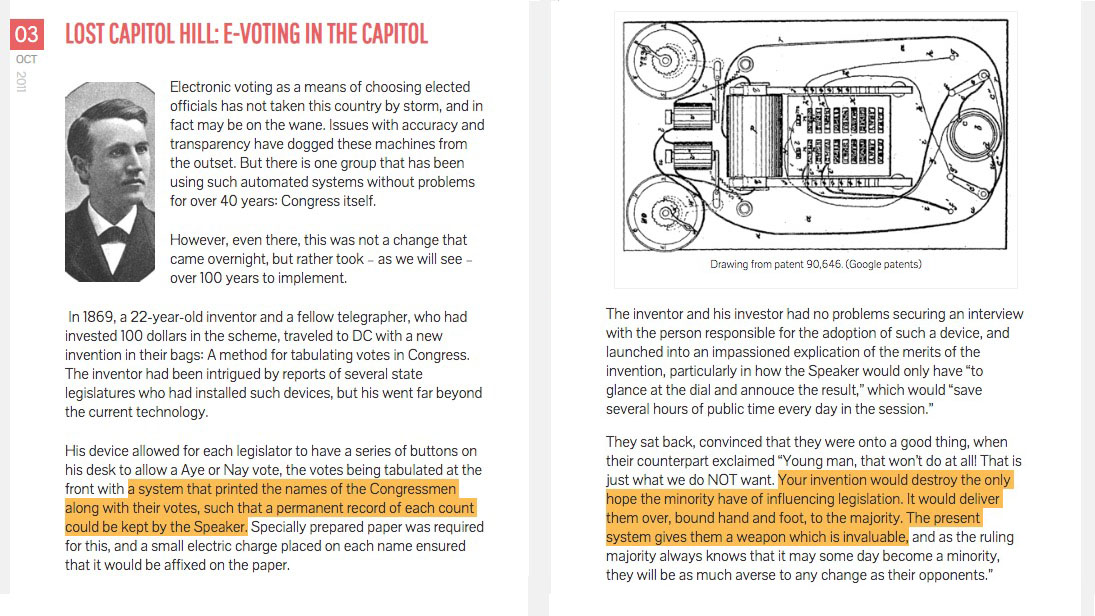
Thomas Edison 1869 on how public voting hurts the minority

Thomas Edison 1869 on how public voting hurts the minority
Avoiding controversy is a maxim around here and… non-record votes were an excellent means of fulfilling the maxim of avoidance.Norm Ornstein & David Rohde 1974
The Strategy of Reform
We have several kinds of ‘liberals’ around here. One type is what I call a closet conservative. He has a 100 ADA rating, but when he can get away with it, he votes with the conservatives. Teller votes were tailor-made for the closet conservative.Norm Ornstein & David Rohde 1974
The Strategy of Reform
You can’t negotiate when the doors are wide open, because negotiation dies in the sunshine.David King (Harvard) 2017
The Problem With Sunshine (Talk)
By the 1970s, as the Senate became more outward looking, individuals and small groups of senators routinely employed extended debate and the amending process for their own individual purposes. In the contemporary Senate, increasingly cohesive party contingents aggressively exploit Senate rules to pursue partisan advantage. The majority party leadership has responded to the minority’s aggressive use of Senate prerogatives with hardball procedural ploys, and a procedural arms race has ensued. Intense partisan polarization, when combined with nonmajoritarian rules, greatly alters how the Senate functions and leaves the chamber in continual danger of policy gridlock.Barbara Sinclair 2013
Congress Reconsidered 10th Ed
Asked about the unintended consequences of televising the House, former House Clerk Donnald Anderson said in 2006: “I don't know that they were necessarily unintended – certainly easily enough anticipated: the posturing, the more ferociously partisan atmosphere of the House, the appetite for sound bites.”Donnald Anderson 2006
Oral History Interviews
Reformers look to internal procedural changes in Congress as a way to reduce partisanship and gridlock. They point to the large increase in party-line votes on amendments in the House since recorded votes were first permitted in the committee of the whole in the 1970s.Donald Wolfensberger 2014
Negotiating Political Agreement
A combination of factors produced this strange bonding experience: the emotional nature of the trial, the fact that senators were forced to sit together in the same room for hours on end (something that rarely happens during legislative debates), and the reported soul-baring that took place in a closed, bipartisan caucus and in subsequent secret deliberations just prior to the final votes. Sen. Charles Schumer (D-N.Y.) described this effect of closed deliberations: “When you close a proceeding, you get more interactive dialogue because people are just talking to one another, as opposed to talking to a much larger audience.”Donald Wolfensberger 2000
Congress and the People
Most committee staffers and MLAs agree that the closed markup in SASC results in a more efficient and candid policymaking process. Without reporters or lobbyists in the room, Senators are free to debate difficult decisions and make deals without the pressures to posture or conform to narrow ideological or parochial views. …The closed markup allows Senators with those concerns to sometimes craft a deal with others on the committee that would have been politically impossible if lobbyists or reporters were present. Compromise often requires some degree of anonymity, and certainly the closed markup in SASC is testimony to that reality. [Many staffers] are highly skeptical about the benefits of an open process. While increased transparency is certainly valued, many believe an open process would undermine vigorous and frank debate, and also frustrate compromise and bipartisanship.Colleen Shogan 2011
The Senate’s Last Best Hope
I argue here that minority-party electoral incentives mean that the minority has an incentive to make Congress look more partisan by requesting that instances where parties disagree the most become a matter of public record... Notably, the House in the 1970s for the first time introduced recorded voting in the Committee of the Whole (Smith 1989). As Roberts and Smith (2003) convincingly demonstrate, votes on amendments in the Committee of the Whole tend to be far more partisan and divisive than other types of House votes. The introduction of recorded voting on COW amendments, along with the ease of electronic voting, quickly led to an explosion of amendment votes, driven largely by minority-party Republicans who sought to force members of the majority party to take difficult or embarrassing votes, which added a whole new and divisive set of votes to the roll-call record. As Smith explains, “[minority Republicans] actively sought ways to challenge committee products, raise ideologically charged issues, and force recorded votes. [Robert] Bauman [R-MD] even entertained requests for recorded-vote amendments from Republican challengers to Democratic incumbents in order to compel Democrats to take politically dangerous positions” (1989, 34).William Egar 2016
Tarnishing Opponents, Polarizing Congress
Lyndon Johnson could win with a little armtwisting because that's all he needed to do – a little armtwisting. Obama needed to armtwist half the house, and a substantial number in the Senate, thanks to the rise of the filibuster... which is arguably itself a result of the 1970s revolution that heightened partisanship and congressional responsiveness, at the expense of collegiality and party discipline.David Frum 2000
How We Got Here: The 70’s
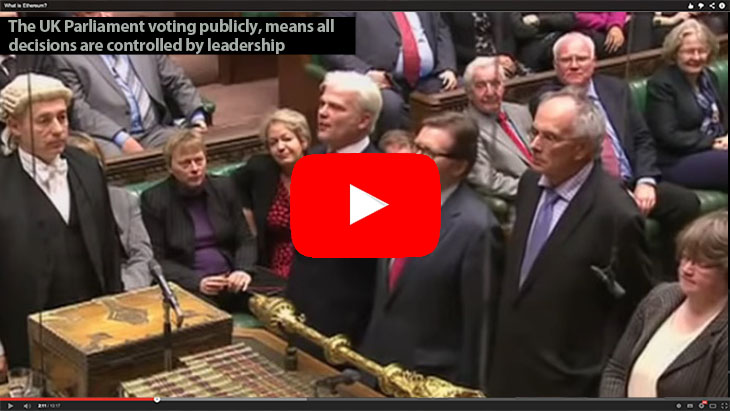
Jay Foreman 2015 – Humorous Look at Open Voting and its effect on partisanship

Jay Foreman 2015 – Humorous Look at Open Voting and its effect on partisanship
A senator periodically receives a record showing the number of times, by percentage, that he or she has voted with each of the other 99 senators. When I first came to the Senate, there were Democrats mixed in with Republicans and vice versa. Today, except for procedural votes, or what are often called throwaways, it’s rare for more than two or three senators to cross party lines on a vote. Nothing could more starkly demonstrate the fog of partisanship that has enveloped the Senate.Senator Dale Bumpers 1999
How Sunshine Harmed Congress
The more immediate impetus for this work came from a recognition that there has been a resurgence of partisanship in Congress (particularly apparent in floor voting), and that the earlier research on the decline of partisanship in Congress neither anticipated nor appeared able to explain this resurgence. There seemed, moreover, to be an incomplete understanding in the congressional literature of the causes and effects of the reforms in the House during the 1970s. It will be argued below that the reforms in the House and the growth of partisanship are systematically related, and that both are in turn related to important electoral changes. The analysis will seek to provide theoretical support and empirical evidence for this perspective. David Rohde 1991
Parties and Leaders in the Post Reform House
Secrecy tends to induce bargaining and publicity to induce arguing, secrecy also improves the quality of whatever arguing that does take place behind closed doors.Jon Elster 2008
Optimal Design of Constituent Assemblies
Sunshine laws kid the public... legislative compromises and accommodations must also be provided for, and these require secrecy.Richard Bolling (D.Mo) 1976
Reform Penetrates Conference Committees
Leaders and members regularly set up roll-call (transparent) votes in full knowledge that these votes will have no effect on policy outcomes, but they nevertheless stage them for messaging purposes – that is, to define the differences between the parties in hopes of making their party look more attractive to voters or key constituencies than the opposition. (intentionally driving partisanship)Frances Lee 2016
Insecure Majorities
[In secret, closed-door sessions] opposing parties can share their perspectives freely and come to understand the perspectives of others.Mark Warren & Jane Mansbridge 2013
Political Negotiation (partisanship)
The partisan jockeying in the narrowly divided Congress was intensified by the 2008 presidential campaign, which for all practical purposes was already under way. Both parties forced votes they knew they could not win, in hopes of making life uncomfortable for their opponents and shaping issues for the election...The House held a record 1,177 roll call votes during the year, in part as a result of GOP attempts to amend and recommit bills.CQ Press 2008
Partisan Jockeying in Advance Of 2008

Sarah Binder 2015 - Downsides of Transparency (Order in the House)
Sarah Binder breaks down the unintended effects of opening congressional committees to the public in the 1970s. In her discussion, she suggests that partisan warfare is one possible result. She says:
“Another response to that unintended effect, the response by Democrats to use the Rules Committee, right now pointed by the Speaker, not Ways and Means, to bring order to the floor. As we all know, conditions start to change parties begin to polarize, we’ve seen more partisan voting in the 80s and 90s, we see the advent of restrictive rules, decisions by party leaders to use the rules to pursue the caucuses policy priorities. Again, all in a chain of events that get unleashed by creating the floor as an advent, as an avenue, or an arena for actually making policy decisions – for opening up – making much broader participation within the floor.”

Sarah Binder 2015 - Downsides of Transparency (Order in the House)
“Another response to that unintended effect, the response by Democrats to use the Rules Committee, right now pointed by the Speaker, not Ways and Means, to bring order to the floor. As we all know, conditions start to change parties begin to polarize, we’ve seen more partisan voting in the 80s and 90s, we see the advent of restrictive rules, decisions by party leaders to use the rules to pursue the caucuses policy priorities. Again, all in a chain of events that get unleashed by creating the floor as an advent, as an avenue, or an arena for actually making policy decisions – for opening up – making much broader participation within the floor.”
Television was a perfect vehicle for Gingrich’s plans: it poorly conveyed the subtleties of compromise and instead rewarded controversy, polarization, symbolic amendments and the repetitious presentment of partisan themes. “C-SPAN does work best for the minority party. The majority controls the process - and looks like it’s closing things down,” Walker said. Gingrich wrote to conservative activist Paul Weyrich that December. “We have forced O’Neill to use strong arm tactics on his own people... set into motion the weakening of O’Neill’s power... made our future attacks on O’Neill credible.” John Farrell 2013
Tip O’Neill and the Democratic Century
I find that Democrats who become Republicans, for instance, start to vote like Republicans at the time they “cross aisles.” This finding is consistent with the claims made in a growing literature that emphasizes the partisan aspects of congressional organization, and it supports the contention that party plays a direct role in determining members’ roll-call behavior.Timothy Nokken 2000
Dynamics of Congressional Loyalty
Uninformed types mimic informed types when the process is transparent but abstain when the process is secretive.Gilat Levy 2005
Decision Making in Committees: Transparency, Reputation and Voting Rules
Fingleton and Raith (2005) show that while open door negotiations can allow [principals] to learn more information about their agents, such practice is also inefficient since agents bid more aggressively (relative to closed-door negotiations).Gilat Levy 2005
Decision Making in Committees: Transparency, Reputation and Voting Rules
Secret voting should be adopted when the intensity of the bias is relatively small, in which case the non-observability of individual votes reduces the incentives for incompetent members to vote just in order to avoid revealing their lack of competence.Andrea Mattozzi & Marcos Y. Nakaguma 2015
Public versus Secret Voting in Committees
The way a chamber votes matters. The publicity of recorded votes, for example, helps the party whips in their task of “keeping the temperature of back-bench opinion and pressing Members into the lobbies.” Therefore, recorded votes tend to enhance party unity and, as a consequence, reduce decision-making costs in parliamentary systems of government.Thomas Saalfeld 1995
Dynamics of Congressional Loyalty
Once you get the TV going here, you are going to find it more difficult to achieve the compromises that have to be made to make legislation work and make democracy work.Senator Lloyd Bentsen 1986
Congressional Record, February 5
Instead of an institution where sharp differences are ground down and compromised, this floor will become a place where they are sharpened. This change will not take place suddenly, but take place it will.Senator Lloyd Bentsen 1986
Congressional Record, July 29
Maybe the worst net negative effect of the openness obsession is on the spirit of compromise — a spirit that is prized, ironically, by many transparency advocates. There is a reason the Constitutional Convention of 1787 was held privately and no official minutes were kept. Men who argued fiercely against certain provisions preserved their ability to accept second-best outcomes, and to go home and advocate ratification of the overall agreement.Mitch Daniels 2018
Government ‘Transparency’ Has Gone Too Far
As the British Francks Committee wrote in 1972, ministers and administrators must, in order to present clear issues to Parliament and to the electorate, be able in some instances and at some stages ‘to argue out all the possibilities with complete frankness and free from the temptation to strike public attitudes.‘Michael Dougan 2012
Empowerment and disempowerment of the European Citizen
Since the installation of an electronic voting system in 1973, members can insert their personalized cards (about the size of a credit card) into one of more than forty voting stations on the floor and press the “Yea,” “Nay,” or “Present” button. A large electronic display board behind the press gallery provides a running tally of the total votes for or against a motion. The voting tally, said a representative, is watched carefully by many members: “I find that a lot of times, people walk in, and the first thing they do is look at the board, and they have key people they check out, and if those people have voted “aye;’ they go to the machine and vote “aye” and walk off the floor.” Roger Davidson, Walter Oleszek, Frances Lee 2011
Congress and Its Members
Private in camera settings…such as the ‘confession talks’ during European Council summits allow actors to explore potential compromises, to seek out the justifiability of their interests, and the like. These settings allow for arguing and persuasion, because negotiators do not have to stick to their fixed preferences behind closed doors and are allowed to ‘think out loud’ about possible negotiating solutions.Cornelia Ulbert & Thomas Risse 2005
Deliberately Changing the Discourse
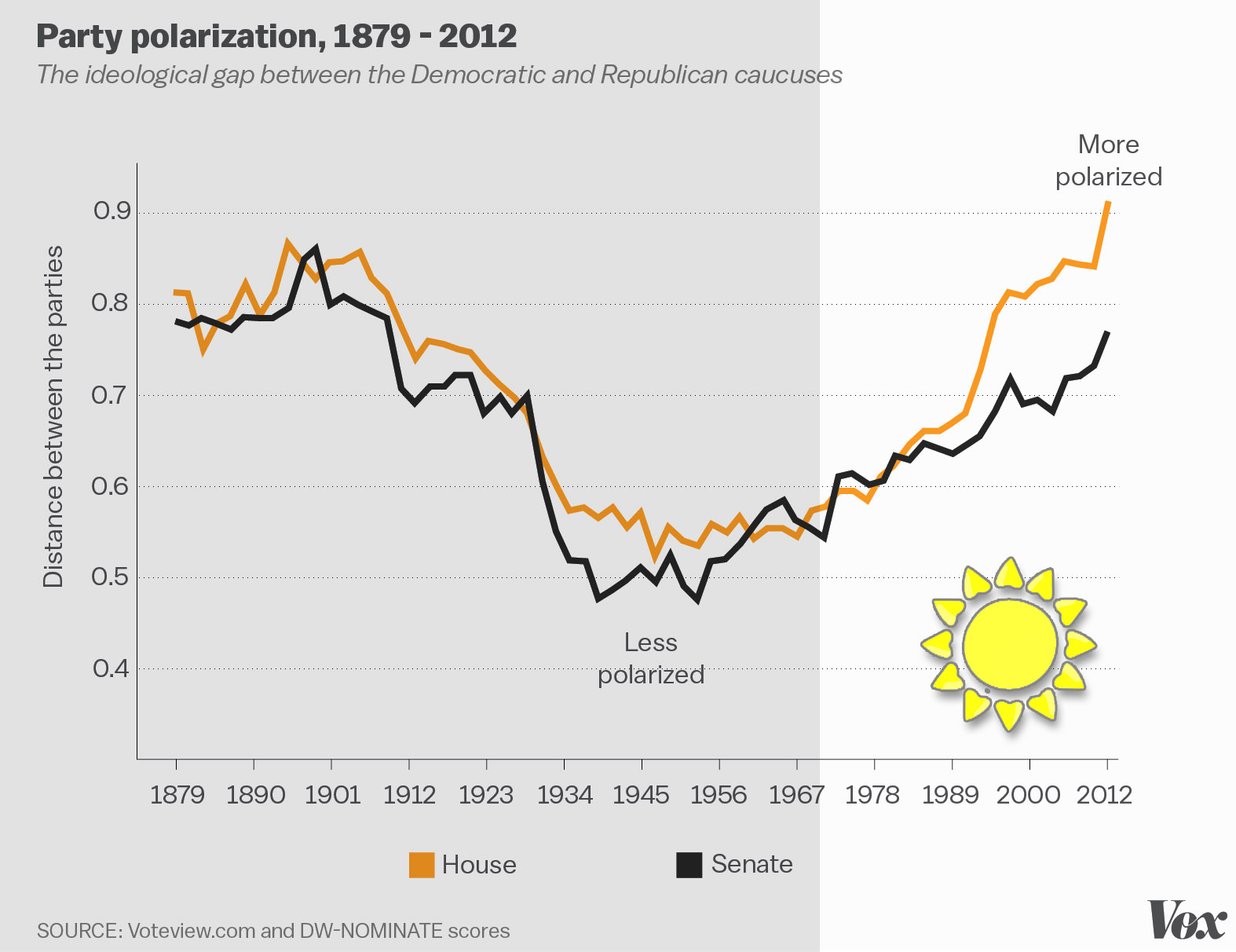
Timothy Nokken 2000 – Dynamics of Congressional Loyalty

Timothy Nokken 2000 – Dynamics of Congressional Loyalty
Evidence shows that polarization in Congress has increased substantially since the 1970s while polarization in the public has increased much less, if at all. These two patterns of polarization suggest that responsiveness by members to their constituents has declined. By breaking apart congressional behavior, however, this paper suggests that this presumption is misleading. Looking at House roll call votes and bill co-sponsorship coalitions, this paper suggests that although partisan behavior has increased substantially in roll call votes, the same is not true for bill co-sponsorship coalitions. In turn, this suggests that while responsiveness has declined when considering roll call voting, responsiveness has increased when considering co-sponsorship coalitions. These divergent patterns can be reconciled by taking into consideration congressional agenda control. As congressional parties sorted, partisan legislation became increasingly likely to face a roll call vote whereas bipartisan legislation became less likely to face a roll call vote.Laurel Harbridge 2010
Congressional Agenda Control and Decline of Bipartisanship
Another difference between the institutional and policymaking perspectives involves the stage of the policy process that is examined. For example, many studies of Congress examine roll call votes on the floor or in committee and these studies find strong evidence of partisanship.90 However, roll call votes take place near the end of the policymaking process, and partisanship appears to be less prevalent at earlier stages of the process.91 As Berry observes, advocacy often involves lobbying for attention, simply trying to get government officials to take an interest in an issue. In the previous chapter, we demonstrate that inattention is a key impediment for advocates on many issues in our sample.
Given the way we measure policy salience, reaching a vote on the floor of the House and Senate is synonymous with high salience. Almost half of the issues in our study (47 out of 98 issues) never reached the floor of the House or Senate for a roll call vote. Not surprisingly, the issues that did reach floor votes tended to be partisan issues. Almost eighty percent of the strongly partisan issues in our sample reached a floor vote, while less than half of the nonpartisan issues reached a floor vote. If more of the nonpartisan issues had progressed farther in the legislative process, perhaps some of them would have been subject to more partisan conflict.
This is not to imply that the nonpartisan issues in our sample are disproportionately stuck in earlier stages of the policymaking process. As we show below, a substantial number of nonpartisan issues in our study progress far enough that significant changes in public policy are made. Furthermore, roll call studies typically exclude unanimous or near-unanimous votes.93 Nevertheless, some of our issues include legislation that passed the Senate by unanimous consent or passed the House by nearly unanimous votes. For example, legislation to appropriate funds for the AIDS Drug Assistance Program passed unanimously in both houses. A resolution to end United States membership in the World Trade Organization failed in the House Ways and Means Committee by a unanimous 36-0 vote and failed on the House floor 363-56.
In addition, even when we examine the issues that progressed to a floor vote we do not always observe partisan conflict. Of the 51 issues in our study that were subjected to a floor vote, slightly more than half (27) produced a “party vote” with a majority of one party voting against a majority of the opposite party. Put differently, twenty-four issues in our study were the subjects of roll call votes that did not feature much partisan conflict. Thus, while policy salience helps distinguish partisan from nonpartisan issues, the nonpartisan issues do not seem to suffer entirely from lack of government action.
Some might argue that the distinction between partisan and nonpartisan issues is somewhat irrelevant given the growing use of omnibus legislation in Congress. Perhaps many of the nonpartisan issues get attached to omnibus bills that are sources of partisan conflict. Only twenty-seven issues in our study (less than one-third) were a relatively small portion of a larger omnibus bill, such as appropriations legislation. The proportions were similar for nonpartisan and partisan issues, although the strongly partisan issues were almost always stand-alone bills rather than part of an omnibus package.Frank R. Baumgartner (w Berry, Hojnacki, Kimball & Leech) 2009
Lobbying and Policy Change
In the real world, voting would appear to cover many issues in which the preferences of the individual voters do not have the high degree of structure required for log- rolling issues. The classical solution for such a problem for a party wishing to maximize votes would be to seek the middle position on the non-logrolling issues, and on the logrolling issues, attempt to seize a position which is superior to whatever his opponent has offered. This would lead to sharp changes of policy and great differences between the two parties. We do not observe either of these things in the real world.Gordon Tullock 1970
A Simple Algebraic Logrolling ModelNote:First Tullock is writing this paper in 1970 when there is less chance to logrolling because committees are all closed door and under the thumb of chairmen who treat the committees like their own fiefdom. Second, he imagines that in a world with a lot of logrolling there should be hight partisanship. His last line suggests we don't see this is reality. Well it's true, we did not see much partisanship in 1970 but this had a lot to do with the lesser ability to logroll.
Had members crafted legislation in sunshine, [Alexander Hamilton] wrote, “much food would have been afforded to inflammatory declamation.” James Madison agreed. To limit partisan anger, the Framers employed rules of secrecy in the Constitutional Convention and placed a right to legislative secrecy in Article I of the Constitution.James D’Angelo 2019
Transparency is a weapon that is ruining Congress
The EU’s Council of Ministers wrote the following when asked to open their proceedings to the public:
The Council normally works through a process of negotiation and compromise, in the course of which its members freely express their national preoccupations and positions. If agreement is to be reached, they will frequently be called upon to move from those positions, perhaps to the extent of abandoning their national instructions on a particular point or points. This process, vital to the adoption of Community legislation, would be compromised if delegations were constantly mindful of the fact that the positions they were taking, as recorded in Council minutes, could at any time be made public.Cornelia Ulbert & Thomas Risse 2005
Deliberately Changing the Discourse
AN ENEMY BECAUSE IT IS PUBLIC
On the basis of both our focus-group sessions and the survey responses, we believe an important element of distaste for Congress either has been missed altogether or at least under emphasized by previous investigators. To wit: Congress embodies practically everything Americans dislike about politics. It is large and therefore ponderous; it operates in a presidential system and is therefore independent and powerful; it is open and therefore disputes are played out for all to see; it is based on compromise and therefore reminds people of the disturbing fact that most issues do nor have right answers. Much of what the public dislikes about Congress is endemic to what a legislature is. Its perceived inefficiencies and inequities are there for all to see.
Focus-group participants and survey respondents are disgusted by what they perceive to be undue interest-group influence in Congress. “Why doesn’t Congress represent real people?” participants would ask. Again, part of Congress’s problem is that perceived inequities are played out in public. People frequently see stories of members of Congress being too cozy with special interests, and they find such behavior disgusting. Moreover, when Congress does take action it is seldom fast. Madison believed this was good. He saw the Senate especially as protecting the people from themselves (Madison, 1964) and their oscillating moods and whims. But the public does not like overly deliberate politics. They would like to see something done quickly when in fact legislatures - particularly legislatures like the U.S. Congress - are not well-equipped for rapid action. Viewed in this context, it should be less than a shock that the public does not like Congress. The public prefers some degree of certainty, and when there is not certainty the public wants to believe that disputes take place on the merits of the issues.
Thus, the very openness of the legislative process, which might otherwise be thought to endear Congress to the people, is much more likely to have the opposite effect. Nasty, visible disputes within the executive branch are fairly rare, and interest-group activity there is seldom reported. Occasionally, cabinet rivalries and leaked position papers give the general public a glimpse of maneuverings at the highest policy levels of the presidency, but such instances are infrequent. For the most part, proposals flow from the White House with apparent unanimity from those involved. Dissenters remain quiet or fall in line after the decision is made, in accord with the structure of a hierarchically organized entity. And the Supreme Court, of course, has been artful at camouflaging its disputes. The Court’s “bickering” takes place behind carefully closed doors. Decisions, even when divided, are announced cleanly, and the public remains largely unaware of dissenting opinions. No open disputes, visible partisan stances, or transparent interest-group machinations can be seen. Decisions are presented as final products, not works in progress.
The public, for the most part, does not like the partisan debates, competing interests, and compromises that many close observers of modem democratic politics believe are unavoidable. Congress is the institution in which these distasteful elements of politics are most readily visible. Thus, while Congress is sometimes viewed by the public as an enemy, we wish to call attention to the fact that it is often viewed as an enemy because it is so public. John Hibbing & Elizabeth Thiess-Morse 1995
Congress as Public Enemy
Such groups developed metrics to help make that vision a reality. Their scores were not designed to downplay partisan differences, but to highlight outliers in each party in pursuit of greater ideological purity in both. Their leaders spoke in the language of realignment – of reorienting the party system along clearer ideological lines – but their vision was essentially one of polarization.Emily Charnock 2018
Interest Group RatingsNote: Scoring of votes and legislative voting scores are exclusively based on transparency, or public votes.
Many of the roll-call votes assembled in these volumes did not arise simply in the normal course of Senate business. It was no mere accident that Republicans and Democrats were winding up on the opposite sides of so many issues that Democrats wanted to highlight. Many of these votes were deliberately staged by Democrats for the purpose of communicating partisan differences to external constituencies. “I remember [Sen.] Don Riegle (D-MI) forced the Republicans to vote on cutting Social Security five or six times via amendments,” recalled a former Senate leadership staffer from the period. “It was just like the many Obamacare repeal votes they took in the House over the last [113th] Congress. It made the Republicans crazy, and it had an impact in 1982.” Riegle “was one of our big bomb throwers. He'd stop by the Democratic Policy Committee, stick his head in the door, and ask, ‘Got any Social Security Amendments I could offer today?’”Frances Lee 2016
Insecure MajoritiesNote: The votes that are weaponized are on amendments which are the very votes that were made public by the 1970s reforms. If the voting was secret, these shennanigans couldn't occur.
If MCs change their roll-call voting behavior when they switch parties, absent concurrent changes in district boundaries, the action immediately calls into question strict ideological explanations of roll-call consistency. While Poole claims that MCs “die in their ideological boots”, it is quite plausible that they actually “die in their partisan boots.” This suggests, in direct contrast to Krehbiel’ s thesis, that the parties do indeed have significant effects on roll-call behavior. Timothy Nokken 2000
Dynamics of Congressional Loyalty
Revealing the agent’s action leads to conformism.Andrea Prat 2005
The Wrong Kind of Transparency
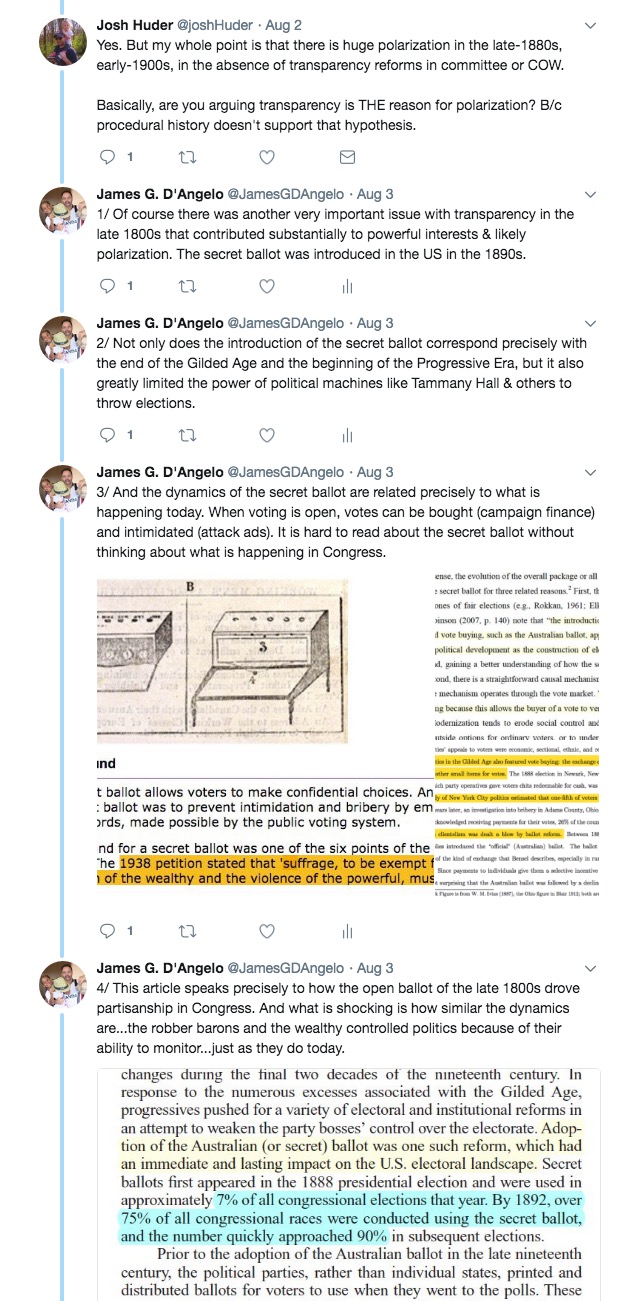
D’Angelo 2018 – Secret Ballot and Partisanship

D’Angelo 2018 – Secret Ballot and Partisanship
[Hyde] and his colleague once again were raising one of the most controversial issues...[they] were looking for an opportunity to force yet another floor vote on the issue. Although their amendment ultimately was rejected, 190-214, at least they had their debate and their vote, even if it meant ratcheting still higher the level of mutual suspicion and distrust in an already polarized House.Stanley Bach & Steven Smith 1988
Managing Uncertainty in the House
As polarization gets underway, the group members become more reluctant to bring up items of information they have about the subject that might contradict the emerging group consensus. The result is a biased discussion in which the group has no opportunity to consider all the facts, because the members are not bringing them up…Each item they contributed would thus reinforce the march toward group consensus rather than add complications and fuel debate.Patricia Wallace 2001
Psychology of the InternetNote: This quote isn’t directly related to transparency. But, in between the lines, one can feel the pressure of deciding issues publicly.
The second NCSL experiment tests whether negotiating in private rather than in public improves the chances of achieving compromise . While sunshine laws, which increase government transparency by requiring that legislator s conduct more of their business in public, are introduced to improve representation and accountability, they also give legislators less room to maneuver. Because at least some voters punish compromise, legislators may be less likely to agree to compromise solutions when they know that those voters are closely following the negotiation. Bargaining in private may shield them from revealing the detailed back-and-forth of the bargaining and thus avoid triggering punishment from voters. In short, public scrutiny of negotiations may increase accountability to some voters at the expense of consideration of compromise solutions (Warren et al. 2016).Sarah E. Anderson, Daniel M. Butler, Laurel Harbridge-Yong 2020
Rejecting Compromise: Legislators’ Fear of Primary Voters
Since the time of Newt Gingrich’s speakership, wedge issues have been a significant part of partisan efforts to use House debates not just to advance legislative policy but to drive a wedge between a congressperson of the other party and his or her constituents by forcing votes on amendments on which the views of constituents and party leaders are at odds. Before the 1970s, votes on amendments were generally not recorded – House members voted by voice, by raising hands, or by walking down the center aisle to be counted. When small groups of members began to insist that votes on amendments, even those that reflected intentionally divisive wedge issues, be “on the record,” Congress became more transparent and its members became more accountable, but at the cost of turning the House into a battleground for partisan advantage. Mickey Edwards 2012
Parties Versus the People
They were woefully indiscreet (public)… Being amazingly clever people they ascribed a wrong value to ingenuity and stratagem, thereby destroying the basis of all sound negotiation, which is confidence… Their jealousy was so poisonous that it stung and paralysed their instinct for self-preservation. To find a parallel for the indiscretion of Demosthenes one has to skip two thousand years of civilization and seek for examples among our own contemporaries.Harold Nicolson 1954
Evolution of Diplomacy in Ancient Greece
Under such pressure from the administration, lobbyists and lawmakers who voiced doubts about Bush’s economic policies have publicly reversed themselves. “I think I should have kept my mouth shut,” Senate Finance Committee Chairman Charles E. Grassley (R-Iowa) said in one such recantation last month. The forms of pressure - exclusions from White House guest lists, a loss of access to key Bush aides, calls to dissenters’ superiors, veiled threats saying the White House has noted the transgression or even shouted accusations – convey the same message. Grover Norquist, a conservative activist who enforces loyalty for the White House, puts it this way: “If I bitch, guess what? I get coal in my socks.” The technique has served the Bush White House well by maintaining the lockstep support among Republicans needed to pass Bush policies in a closely divided Congress. “It’s fascinating the extent to which this administration has been able to hold troops in line for an extended period of time,” said Thomas E. Mann of the Brookings Institution.Dana Milbank & Jim VandeHei 2003
Bush’s Strong Arm Can Club Allies Too
The purpose of negotiation is the reconciliation of interests, the exploring of a situation in an effort to find some common ground, some possibility of compromise, the seeking of agreement through mutual adjustments. Such adjustments are not made easier, and may well be made impossible, when the negotiators fear that any concession or compromise will within the hour be printed, pictured, or broadcast back home as a capitulation. Lester B. Pearson 1955
Democracy in World Politics
One of the difficulties about “open” diplomacy is that not only the nature but the very function of negotiation may be confused by whipped-up popular emotion.Lester B. Pearson 1955
Democracy in World Politics
This is a very different thing from the highly publicized but inadequately prepared conference, held in an atmosphere of drama and suspicion and nervous tension, with far more preparation for public acceptance of the meeting itself than for any good results to come from it...In the eighteenth century, the sovereigns in question were usually individuals. Today they are hundreds of legislators, millions of newspaper readers, radio listeners, or television viewers. Particularly, our sovereigns are voters and they are the subject of every kind of mass appeal and mass flattery by those who want their votes. In such circumstances the inflexibility which open negotiation encourages is apt to harden into complete rigidity.Lester B. Pearson 1955
Democracy in World Politics
Progressive reformers, whether Democratic or Republican, have been calling for more “open and democratic” government since at least the 1960s. In fact, the roots of such reform date to Woodrow Wilson and probably even to the Anti-Federalist concern for more simple, direct democracy. Recently, The Washington Post’s Ezra Klein cited as one of “the 13 reasons Washington is failing,” the idea that “too much sunshine can burn” saying “sometimes, it’s easier to resolve disputes in private.” Madison, of course, would concur. The Constitutional Convention succeeded, in part, because the fifty-five delegates met behind closed doors, under strict confidentiality rules. As witness Madison’s Notes of Debates in the Federal Convention, published only after his death in 1836, delegates were able to repeatedly speak their minds and change their minds across the long summer of 1787. Madison clearly did not think the cure to the ills of democracy is more democracy. He created republican, that is, representative, institutions designed to “refine and enlarge the public views.” Viewing the sausage-making of the legislative process, especially under the unblinking stare of the media, has probably not increased citizen trust in government. The decline in trust of government since the 1960s is coincident with transparency reforms. William F. Connelly 2013
Partisan, Polarized, Yet Not Dysfunctional?

James Madison on how transparency drives partisanship

James Madison on how transparency drives partisanship
Forcing (transparent/public) votes on divisive “hot-button” issues provides campaign ammunition to party colleagues and supporters back home.Walter Oleszek 2015
Congressional Procedures and the Policy Process
The authors discuss the importance of closed-door negotiations for successful legislative compromise. Using experimental data collected from state legislators, the authors demonstrate that lawmakers expect private negotiations to result in successful compromises more often than public negotiations.Anderson, Butler, Harbridge-Yong 2018
Closed-Door Compromise
Is our government too open? Yes. The hubris that as we get more educated and we know more we can handle more government responsibility, and when we fail we make possible the kind of polarization, the kind of capture by special interest, the capture by the most partisan of our society. Bruce Cain (Stanford) 2016
Stanford talk: “Is our Government too Open?”
All of this was troubling enough when the modern wave of transparency laws were enacted in the 1970s, but these problems have worsened over time. Today’s more contentious political environment has fundamentally altered the way American government now operates. Partisan polarization has risen to levels reminiscent of the late 19th century. When obstruction is the goal, every step in the legislative process is a potential opportunity for delay and obstruction. Hearings become showcases for partisan viewpoints, not opportunities for fair-minded investigation. Amendments are opportunities to weaken bills or embarrass the opposition, not to improve the legislation. And votes on complicated bills become fodder for thirty-second campaign ads.Bruce Cain (Stanford) 2016
Is our Government too Open?
More transparency and openness is not always the answer to our governance problems. We need more deliberation, compromise, and consensus. We need less partisan posturing, ideological rigidity, and obstruction. A democracy that works for the people needs to be able to make effective decisions without undue special interest pressures and incentives to grandstand. That sometimes means providing shade from the glare of excessive transparency.Bruce Cain (Stanford) 2016
Is our Government too Open?
This debate was framed in terms of general principles such as liberty and autonomy of deputies versus accountability to the electorate. However, it is worth noting that in the transitional Consulta Nazionale installed in the previous year immediately after the end of the Second World War the DC and the PCI parties’ positions on the matter were more ambiguous as the future electoral prospects were uncertain. The popular vote for electing the Constituent Assembly made clear that the DC party could now count on a high level of popular support. It was very likely that such support would have been confirmed in the general election scheduled immediately after the approval of the new Constitution. This expectation determined a clear stance in favour of open voting, as this procedure would have facilitated party discipline once in government. On the other hand, the PCI understood that secret voting could become a tool in the hands of the opposition as a means of exploiting divisions in any future governing majority (Curreri 1998).Daniela Gianetti 2015
Secrecy and Publicity
Bauman even entertained requests for recorded-vote amendments from Republican challengers to Democratic incumbents in order to compel Democrats to take politically dangerous public positions.Steven Smith 1989
Call to Order
The degree of committee transparency varies from country to country. Swedish parliamentary committees meet in private, and according to the survey, this proves “conducive to a co-operative working environment within the committee, and these private stages are then balanced by the open parliamentary stages.” John Whaley & Susan Benda 2000
Strengthening Legislative Capacity
The amendment required a recorded vote...Few features of the Legislative Reorganization Act would have greater consequence. Members would now face greater accountability for voting to kill amendments to keep them from being offered before the full House, where a recorded vote could easily be demanded. The ability of so small a number of members to demand on-the-record votes in the Committee of the Whole would serve as an unintended means for forcing votes on divisive, party-defining issues and compelling marginal members to cast votes on controversial topics that exposed them to political retribution. Moreover, electronic voting, by speeding the process, would also facilitate a substantial expansion in the number of votes, which, when combined with more open rules permitting more amendments to be offered, would have multiple unforeseen consequences that lent a partisan atmosphere to floor deliberations.John Lawrence 2018
The Class of ‘74
Legislators expect that privately held negotiations are more likely to yield compromise solutions. Private negotiations have the advantage of protecting legislators from revealing what they are willing to give up in the compromise until they can also reveal what they have gained.Sarah E. Anderson, Daniel M. Butler, Laurel Harbridge-Yong 2020
Rejecting Compromise: Legislators’ Fear of Primary Voters
Public meetings turn committee meetings into potential advertising fora for committee members. The members might use the meetings for such reelection purpose as credit claiming, advertising and position taking. Open meetings are therefore less likely to foster inter-party compromise.Kaare Strom 1998
Parliamentary Committees in European Democracies
The Hays group, knowing it was on thin ice, did no stomping around in the Senate, where the bill was passed overwhelmingly without a record vote. Barkley arranged to waive a roll call so he could keep both the friendship of the movies and of the reform organizations.Kenneth G. Crawford 1939
The Pressure BoysNote: Here, ‘the Hays Group’ and ‘the movies’ refers to the pro Hollywood corporate lobbyists who were protecting the motion picture industry. Hollywood was under fire for acting as an oligarchy and so there was antitrust legislation in the works. The reformers were fighting back against Hollywood. They included many religious groups and citizen organizations. The situation was heated. But Congress pushed the matter behind closed doors in order to prevent further polarization and to open up the conscience of many members who were afraid to stand up against the might of the industry.
Class Republican Bill Gradison recalled his close working relationship with Ways and Means Democrats during the 94th Congress, even sharing a “cockroach infested room” at a bipartisan retreat where legislators could “let your hair down,” an atmosphere more conducive to compromise than the “big conference room in Longworth with the lights shining in your eyes, and cameras.” John Lawrence 2018
The Class of ‘74
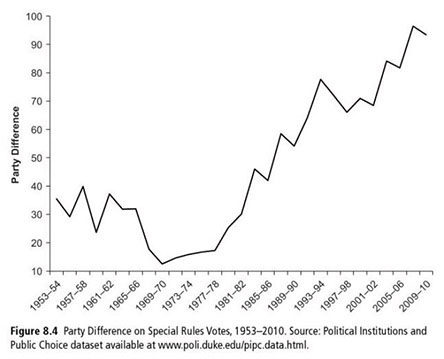
Party Differences on Special Rules

Party Differences on Special Rules
In both studies, subjects compromised less when “performing” before an audience of constituents than when no audience was present during negotiations.Daniel Druckman 1994
Determinants of Compromising Behavior in Negotiation
We have several kinds of “liberals” around here. One type is what I call the closet conservative. He has a 100 ADA rating, but when he can get away with it, he votes with the conservatives. Non-recorded teller votes were tailor-mode for the closet conservative.Norman Ornstein & David Rohde 1974
The Strategy of Reform
The more closed the forum, the more openness in the discussion.David Stasavage 2004
Open-Door or Closed-Door?
If members are staging public votes to highlight differences between the parties more frequently in the contemporary era than in the past, then not all the growth in partisan conflict represents genuine ideological polarization, a widening disagreement between the parties on basic questions of public policy. Instead, some share of the increased party conflict is simply an artifact of the changed strategic behavior [and increased transparency]. Put differently, a substantial amount of partisan conflict in the contemporary Congress is engineered for public consumption. In that sense, not all party conflict is “polarization,” a widening difference in the two parties’ policy preferences. Instead, driven by electioneering in a more party competitive context, a considerable amount of party conflict in the contemporary Congress is position taking for partisan public relations.Frances Lee 2016
Insecure Majorities
There is more party-line voting in the contemporary Congress in part because floor votes have been enlisted as a weapon in the battle for party control of Congress.Frances Lee 2016
Insecure Majorities
To fully understand the highly polarized political environment that now pervades the House and American politics, we must examine the complex politics, including a more open and contentious House, that emerged in the wake of Watergate.John Lawrence 2018
The class of'74: The roots of partisanship
End Notes on Partisanship
It would be remiss to not address the powerful arguments behind Bill Bishop’s book “The Big Sort” and data concerning constituent polarization - both supposed drivers of a polarized Congress. To push back, scholars have found flaws with both of these claims. Here is a Stanford paper refuting the claims of The Big Sort. And a leading Stanford scholar on polarization, Mo Fiorina, has written a 2017 book suggesting that constituent polarization is not nearly as strong as many suggest. Admittedly we believe both notions of “The Big Sort’ and constituent polarization are factors. But we expect that neither of them compare to the power of transparency in driving animosity, gamesmanship and polarization.
It is remarkable, however to sift through the literature from the 1960s to see that scholars and legislators from both sides of the aisle agree about the lack of partisanship before the 1970s reforms. The following citation comes from Robert Kaiser’s book So Much Damn Money, referring to closed door committees in the late 1970s and early 1970s.
 Republican Marlow Cook of Kentucky... could recall no partisan divisions in the committee’s work. “How could you not work together on something like nutrition?” he said. “How do you choose sides between Democrats and Republicans over whether people are eating the right things, or just eating?”
Republican Marlow Cook of Kentucky... could recall no partisan divisions in the committee’s work. “How could you not work together on something like nutrition?” he said. “How do you choose sides between Democrats and Republicans over whether people are eating the right things, or just eating?”
McGovern agreed: “I think it’s fair to say we never had a partisan quarrel on that committee.”
The committee’s staff felt the magic. Schlossberg called this period “the golden moment of progressive liberalism in the Senate. The country has been living off the moment ever since. It was, in retrospect, almost like a dream to have been in the middle of it.”
Finally, in the above graph we highlight the work of Bateman and Lapinski who have refined the polarization graphs originally produced by Poole and Rosenthal. The remarkable correlations between the sunshine laws and partisanship are obvious. Their paper, with more detail and graphs, can be found here.
Biden said, “This bill is further proof that Republicans and Democrats can come together to deliver for the American people, and I’m looking forward to continued bipartisan progress in the year ahead.” ... They called for a secret ballot, so Republican members won’t have to fear retaliation.Heather Cox Richardson 2022
The GOP Divide

